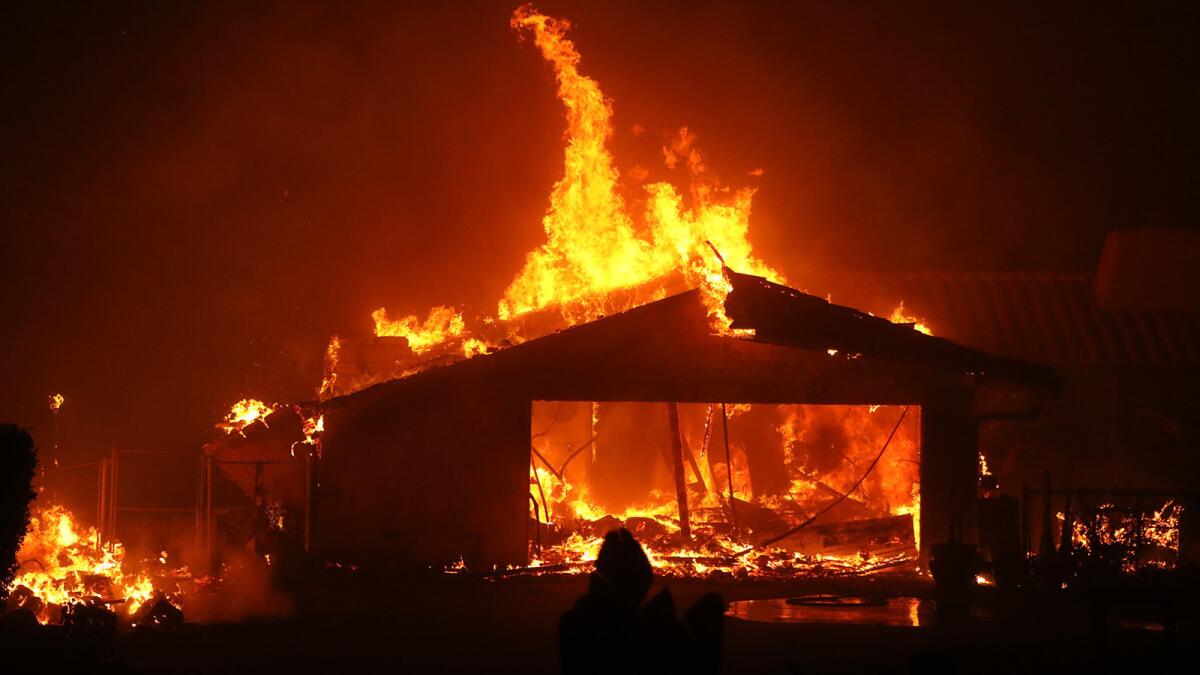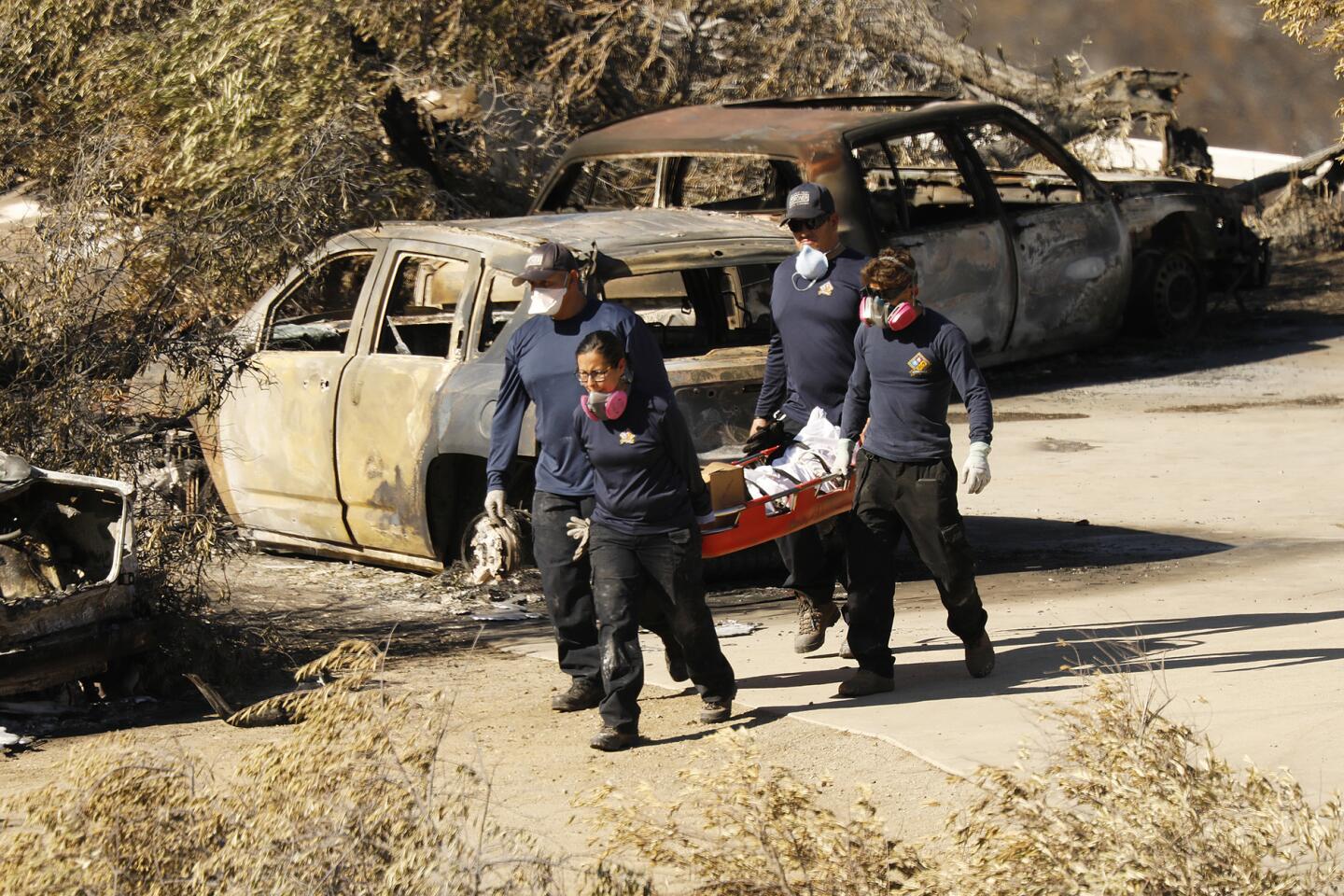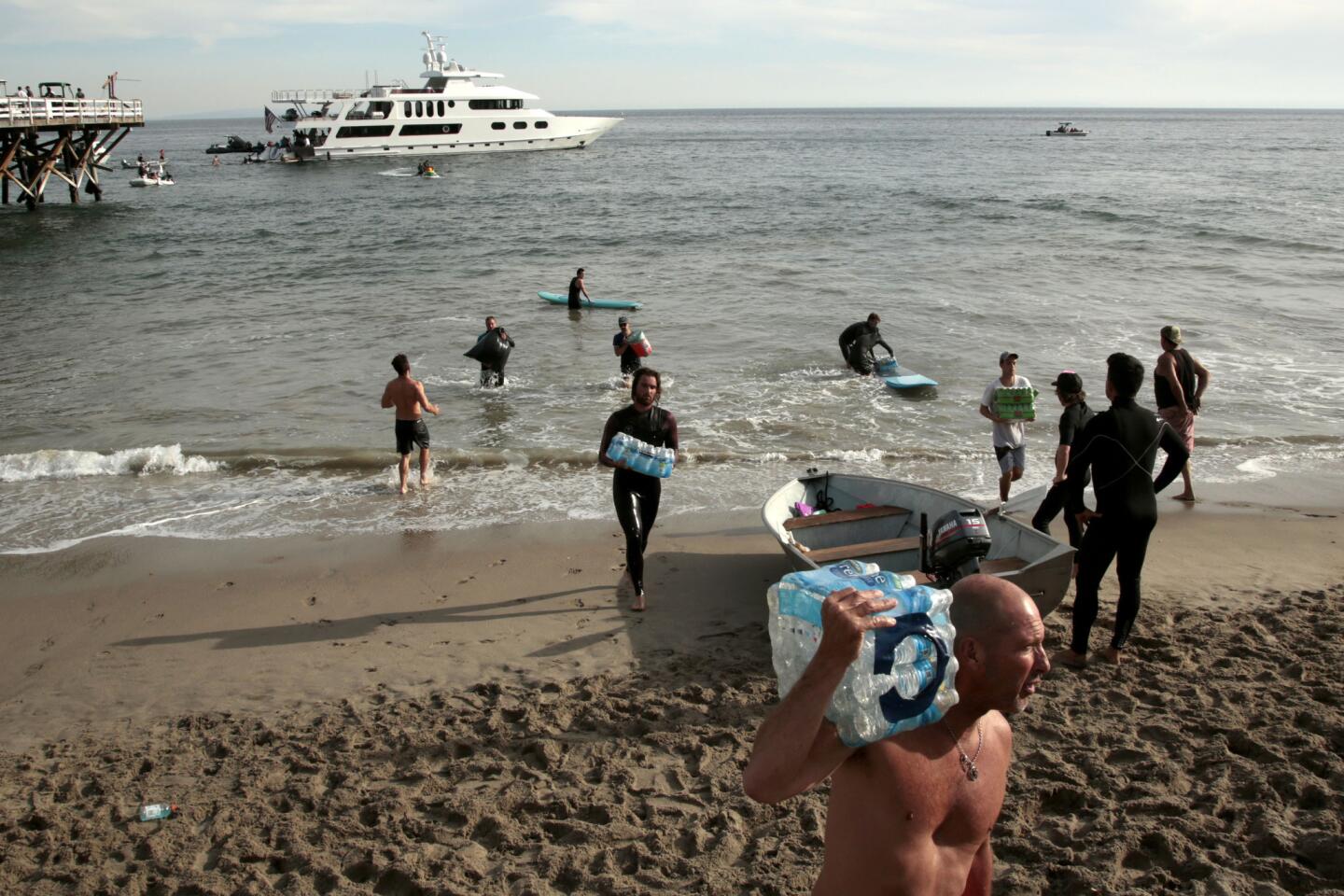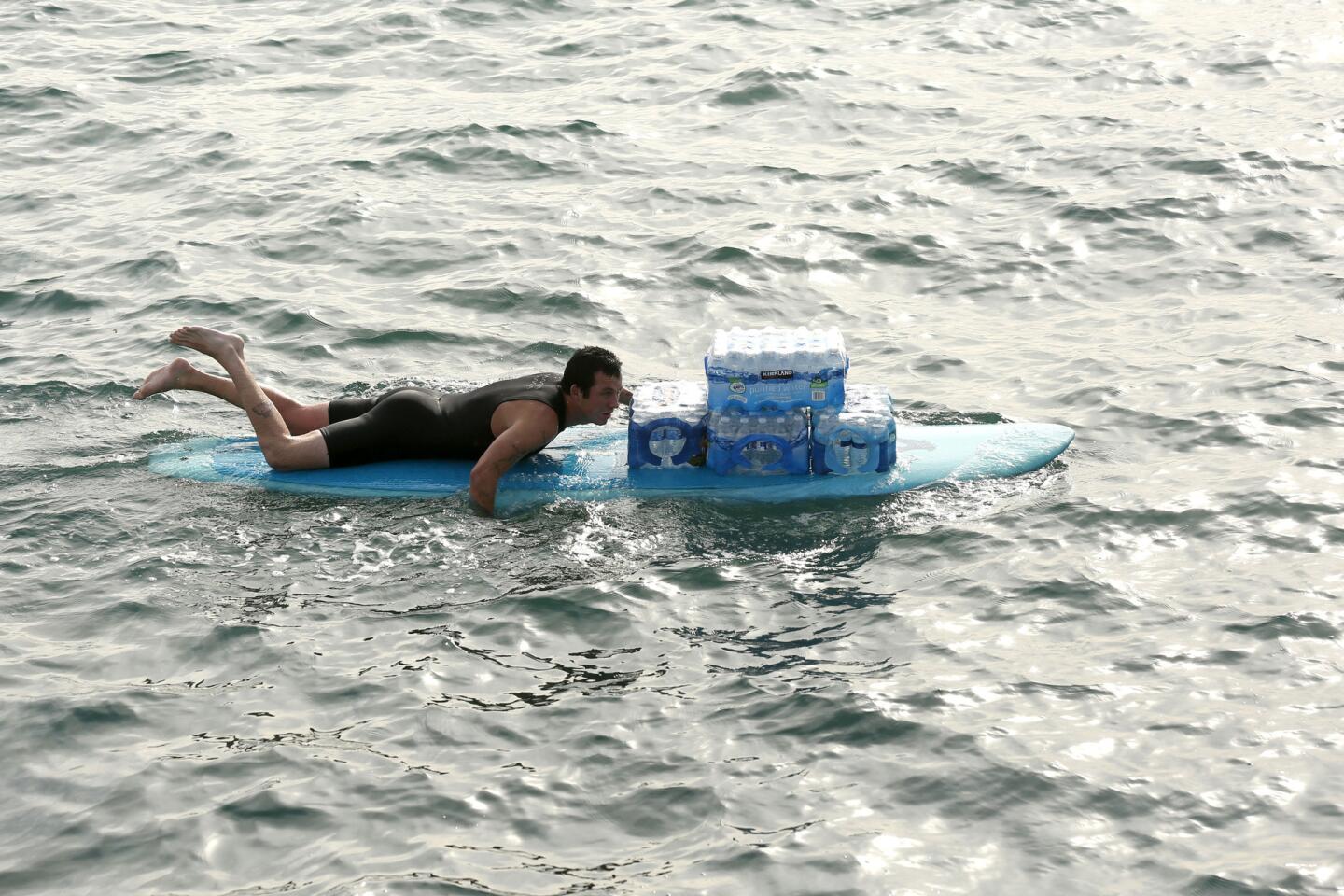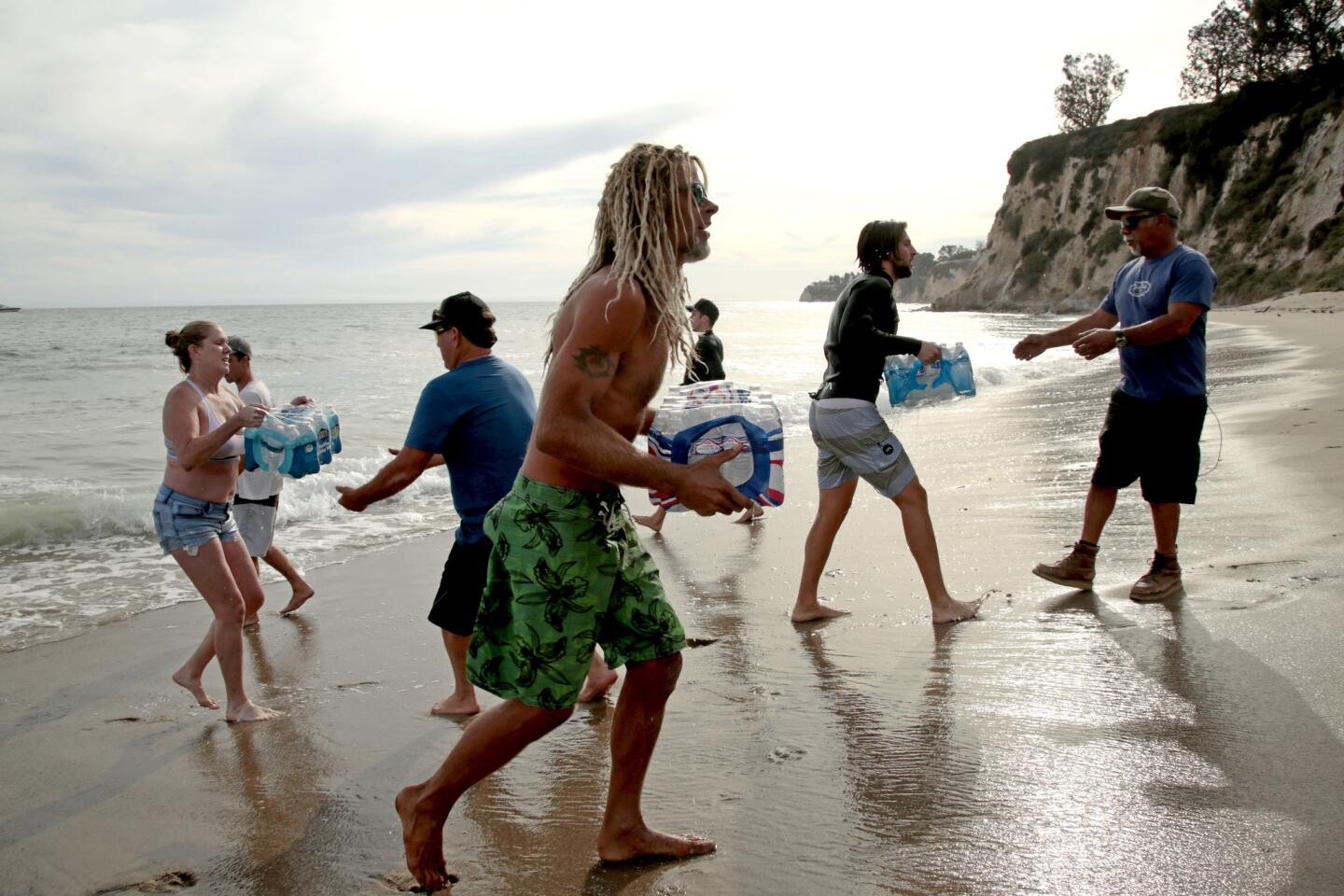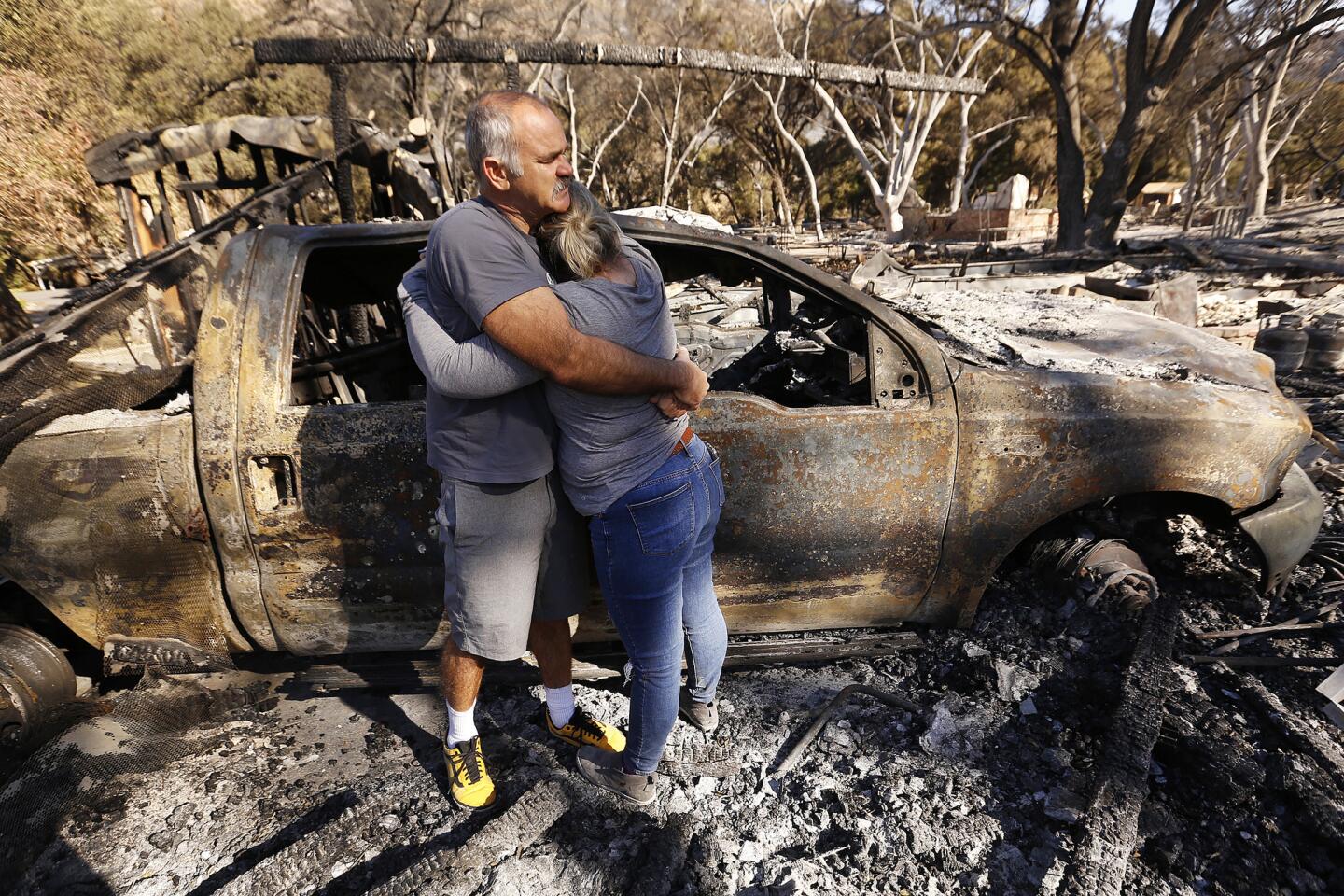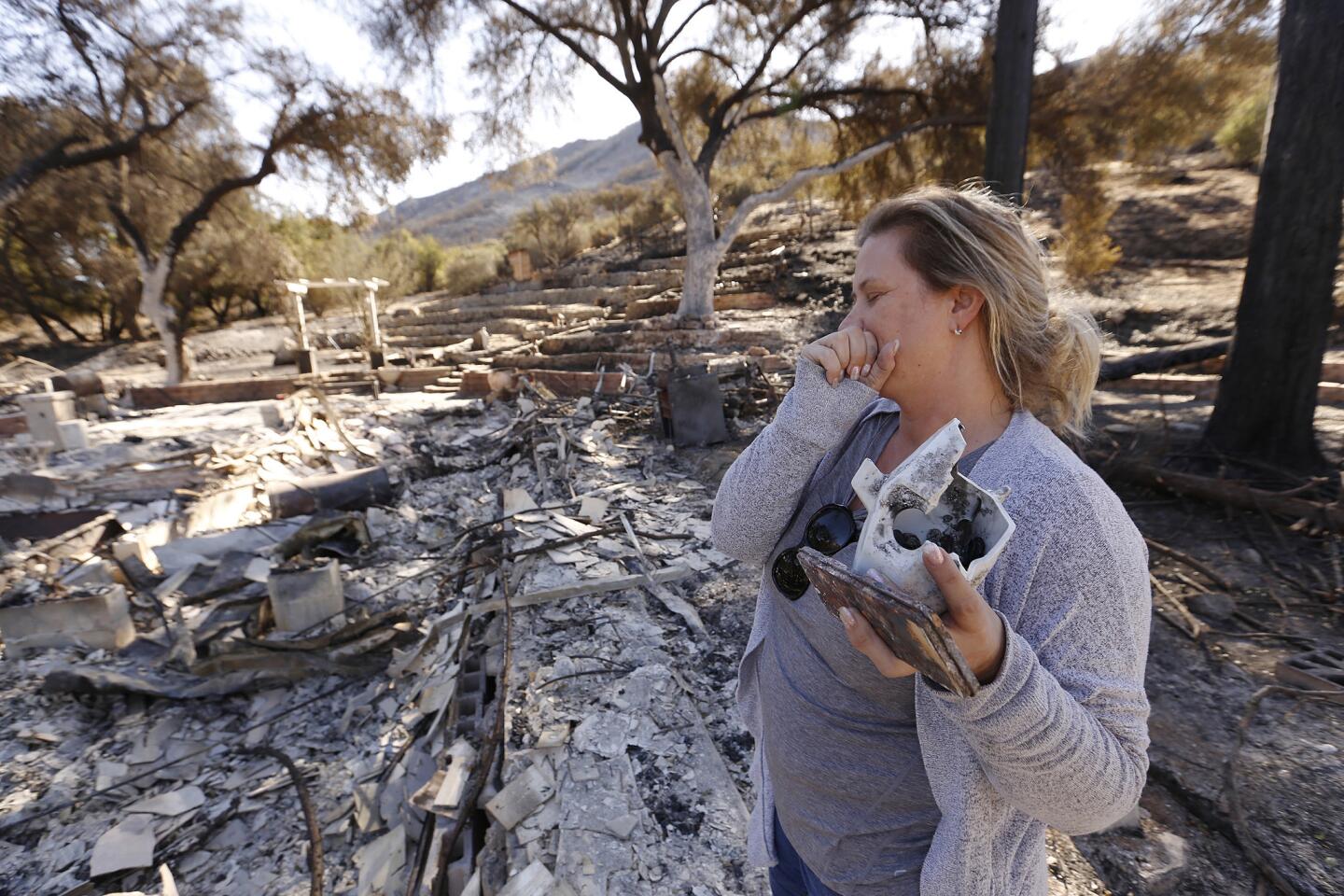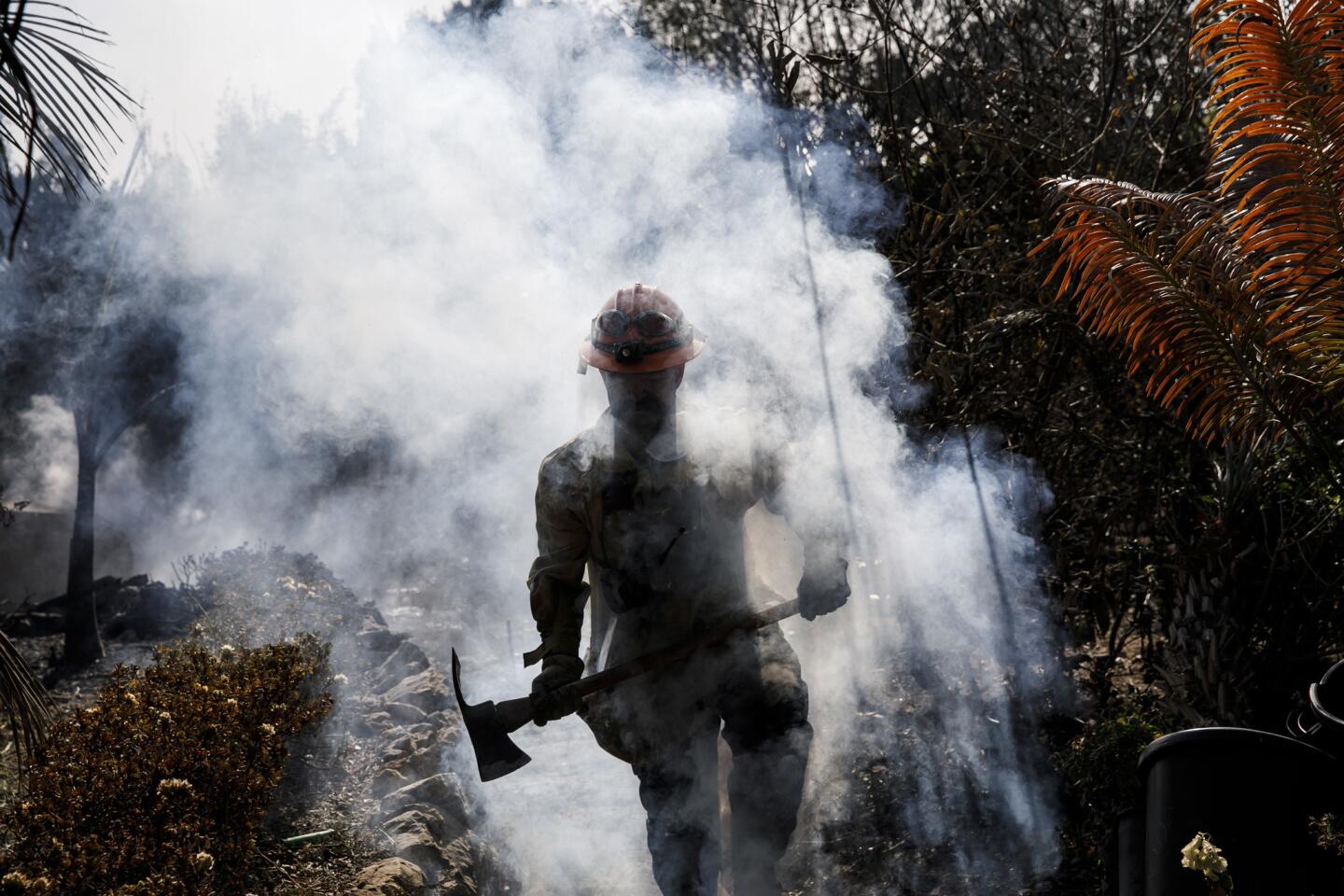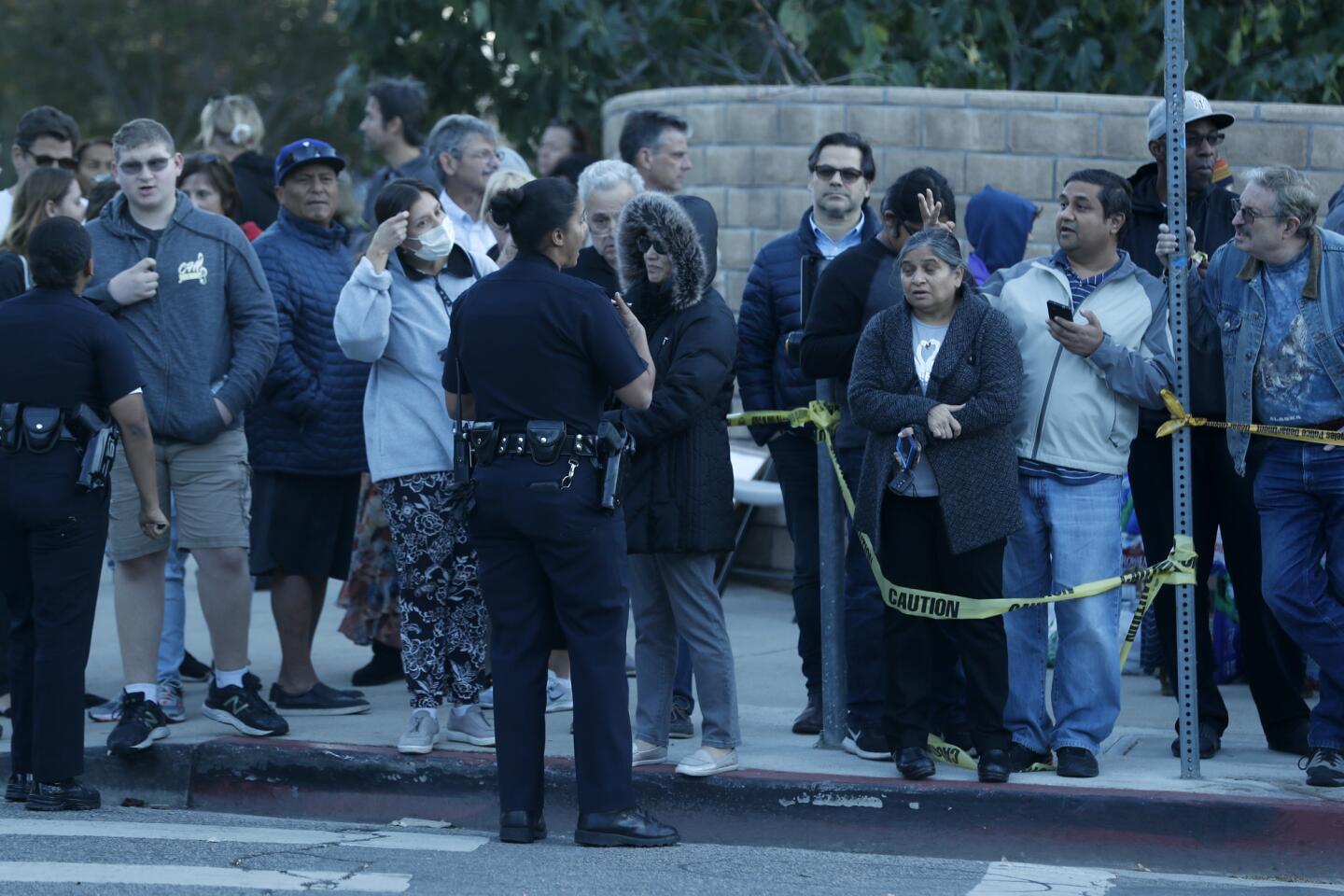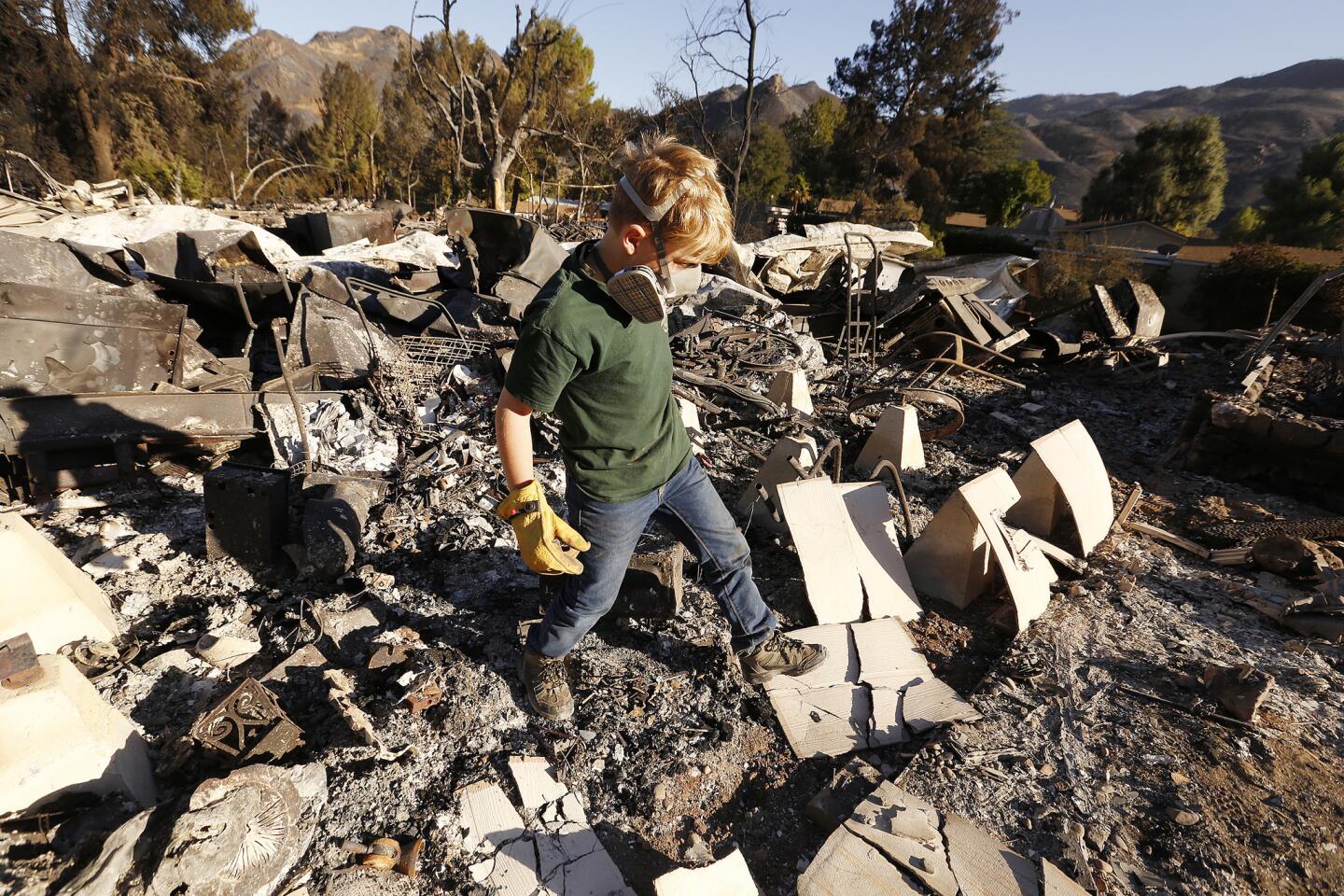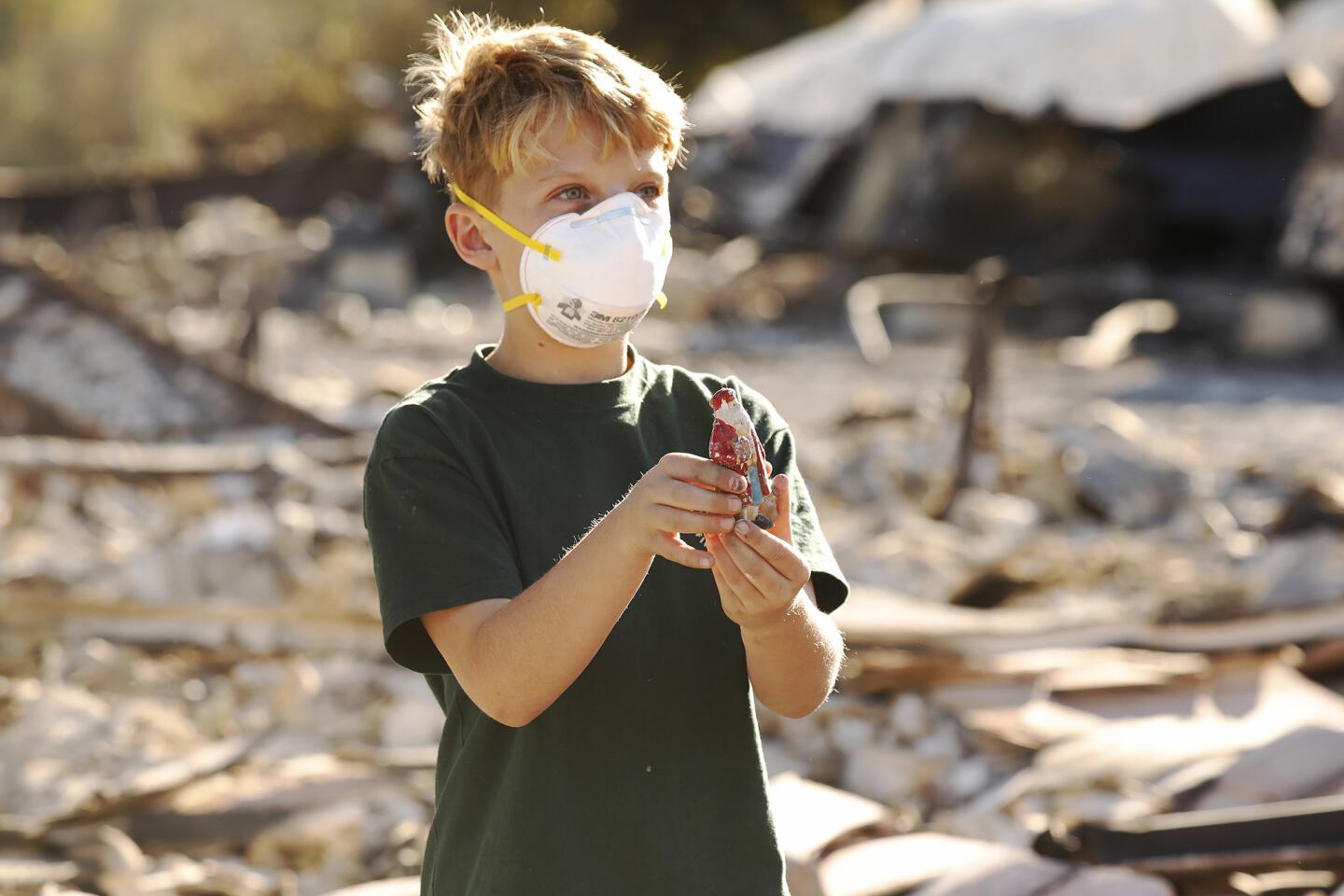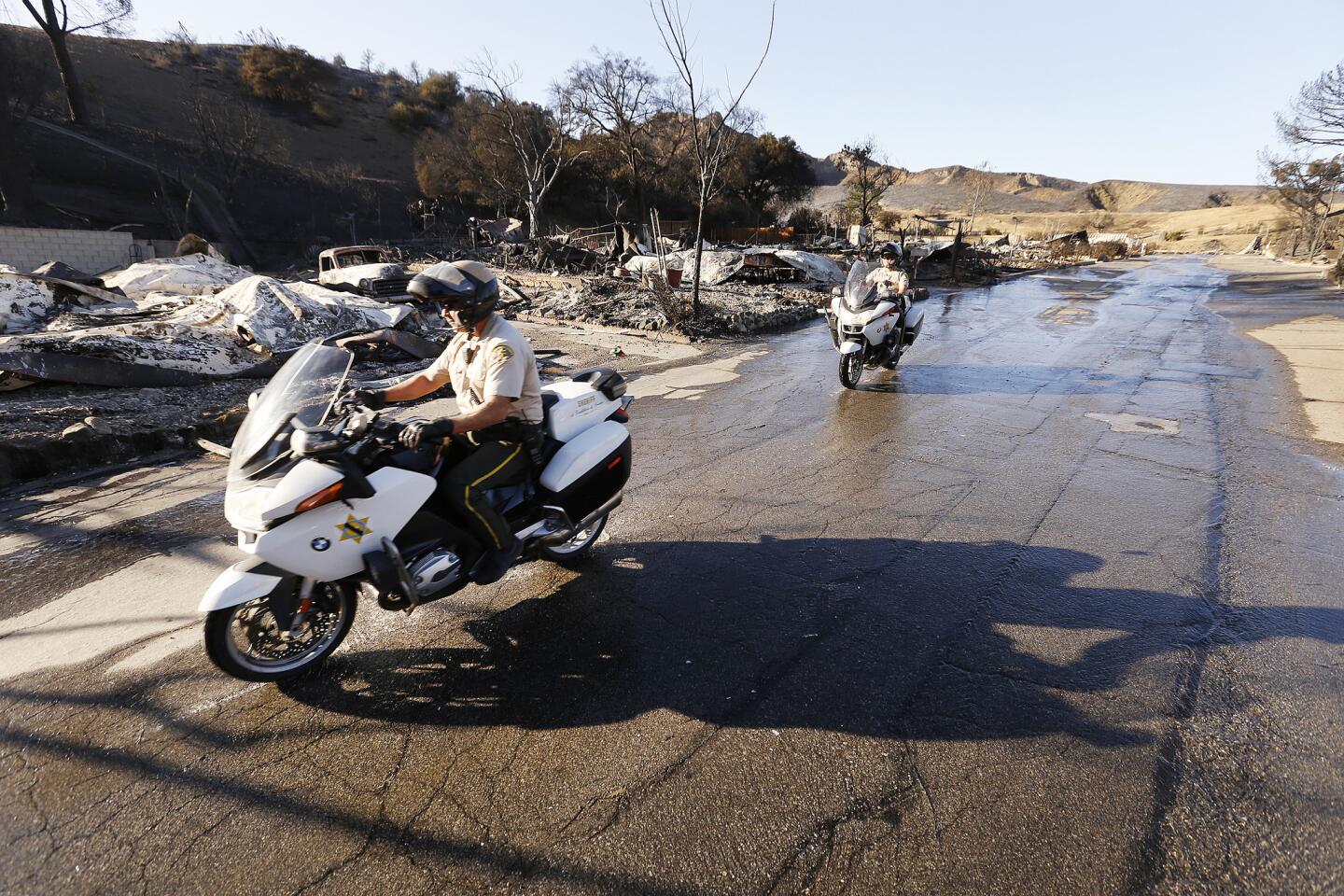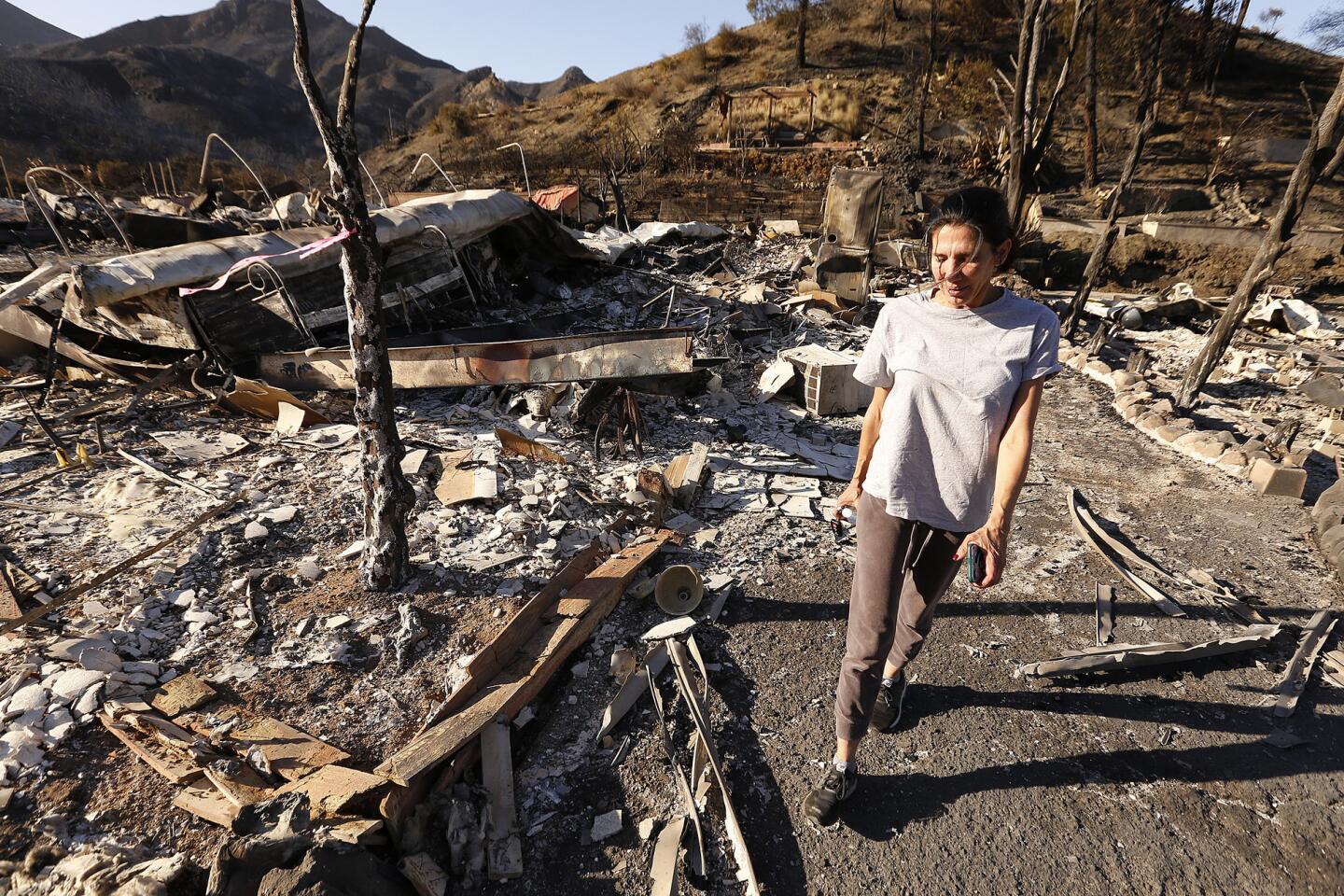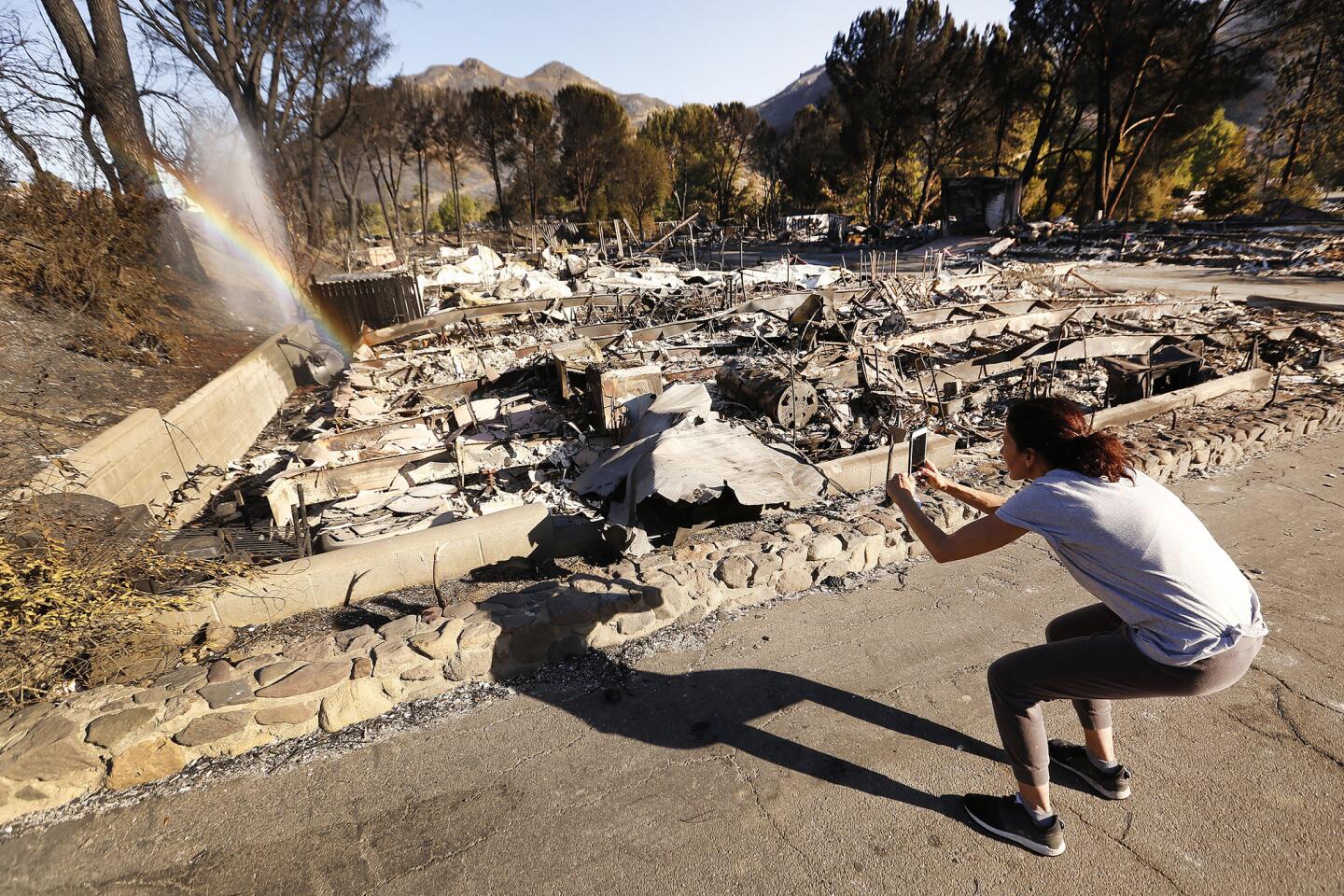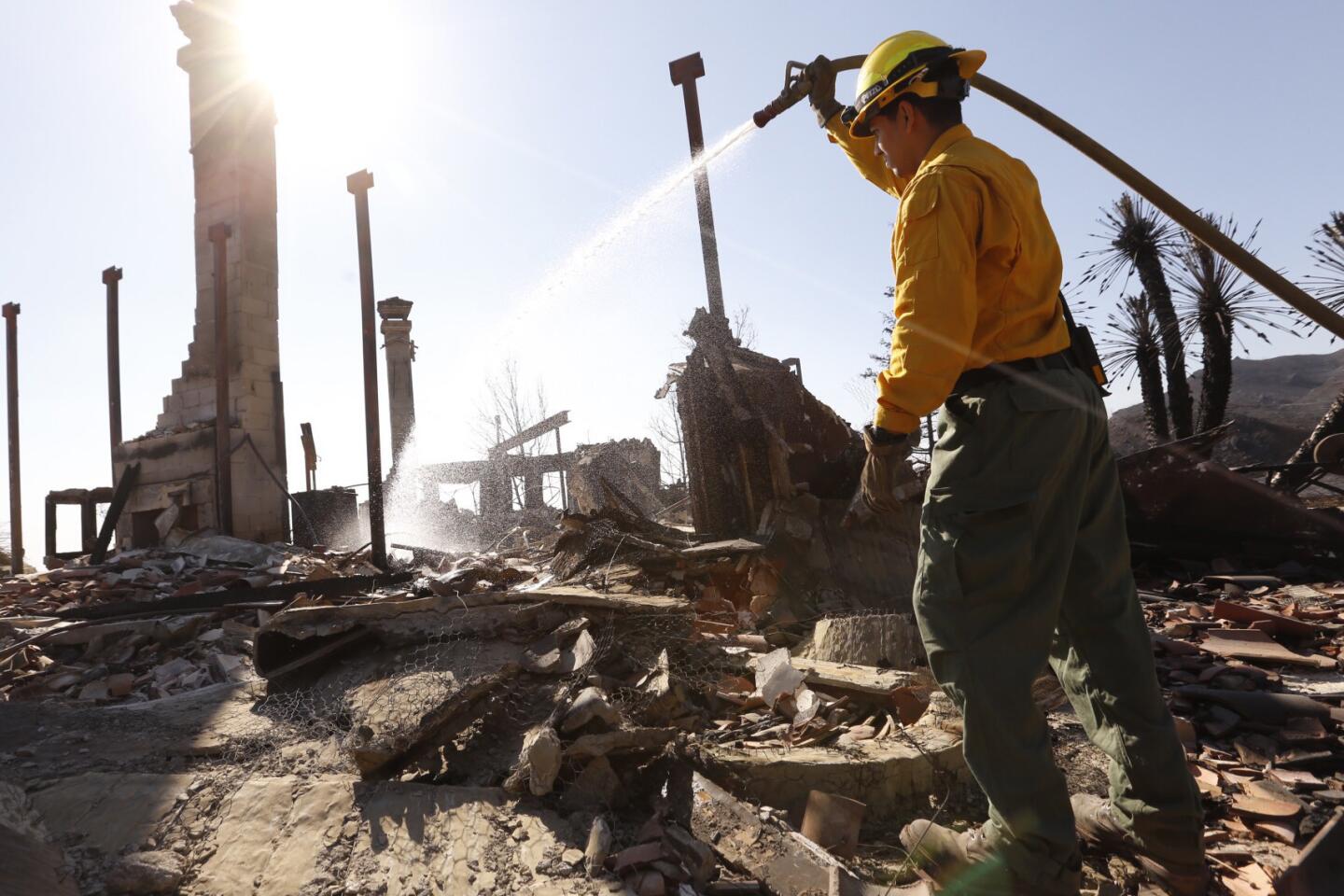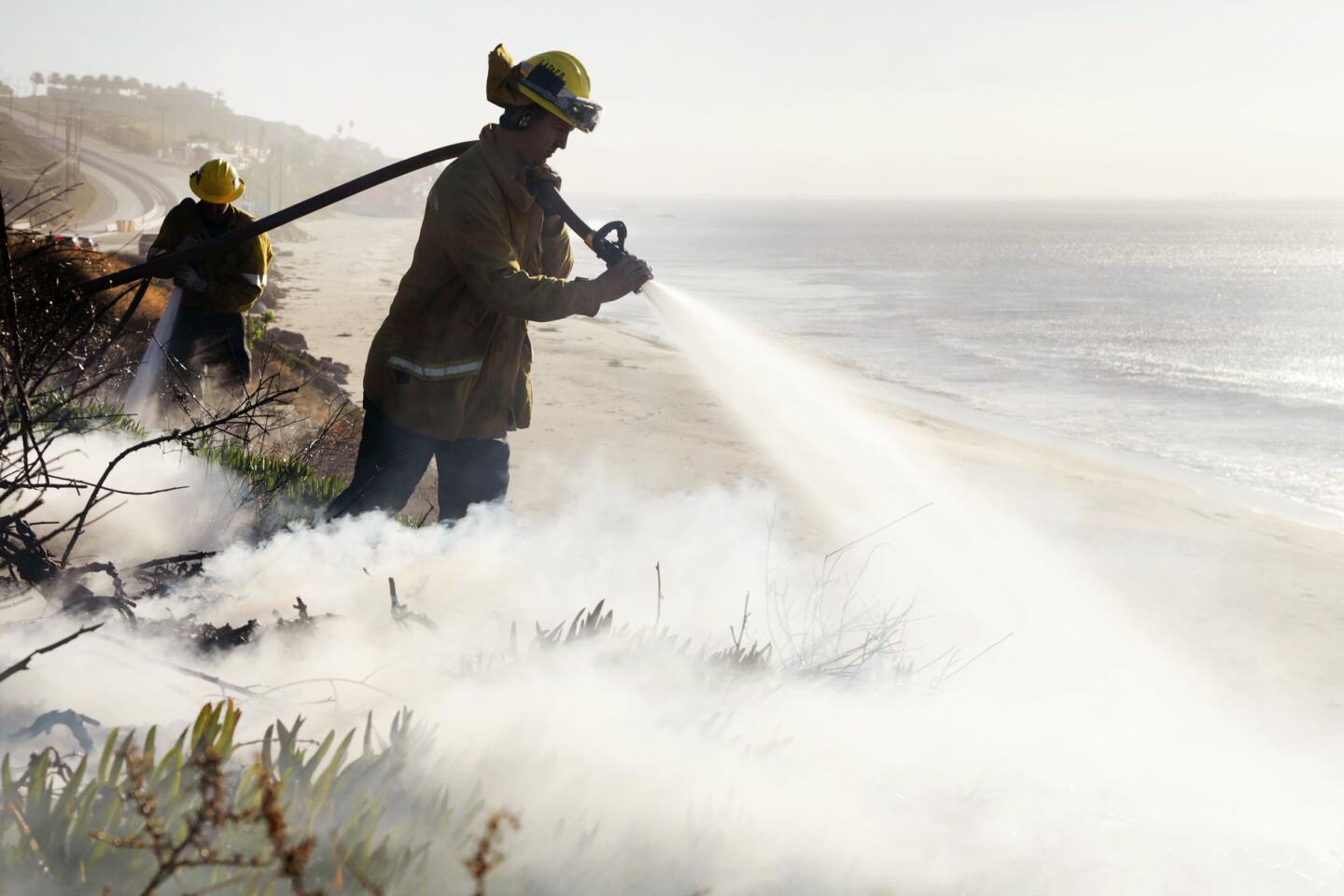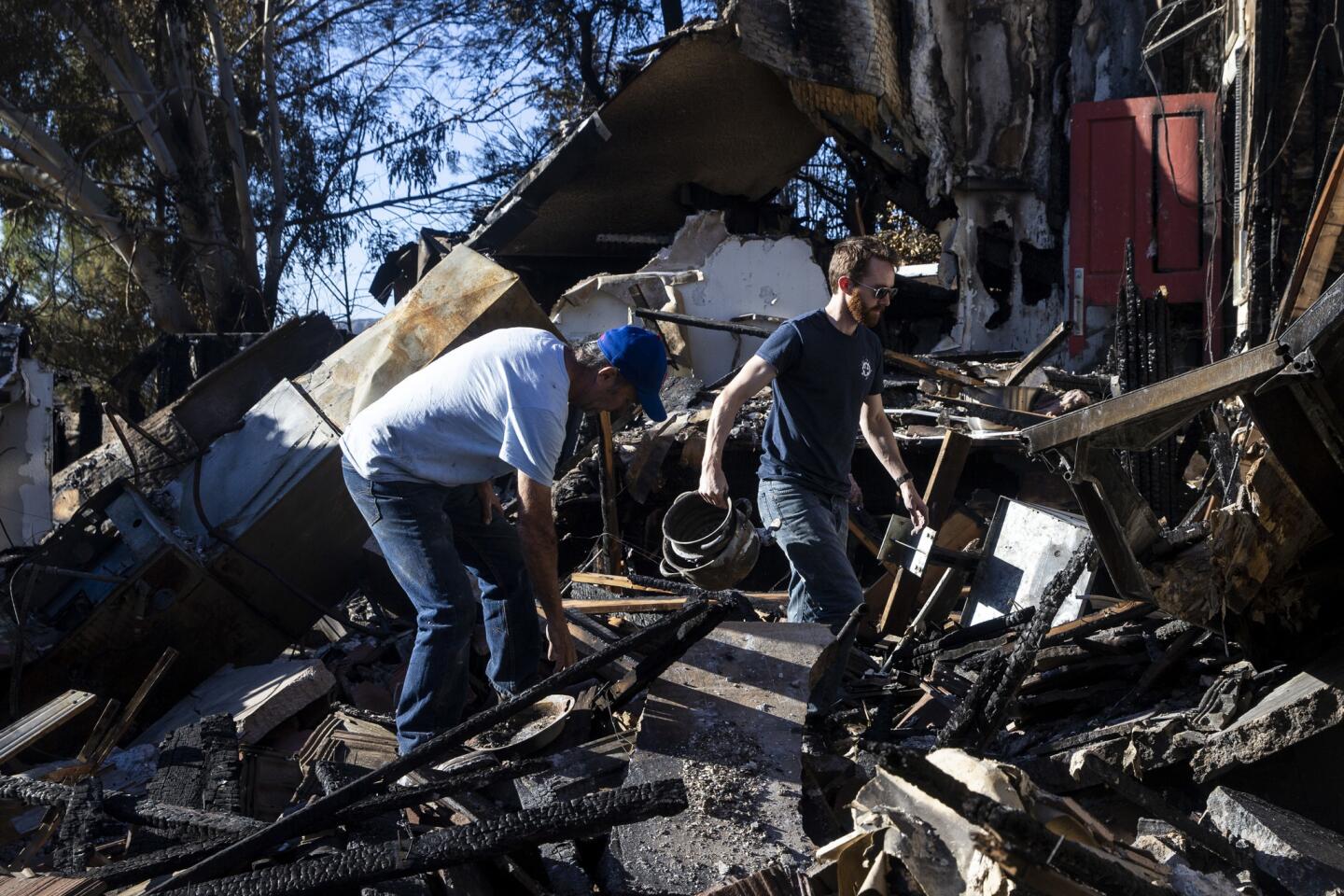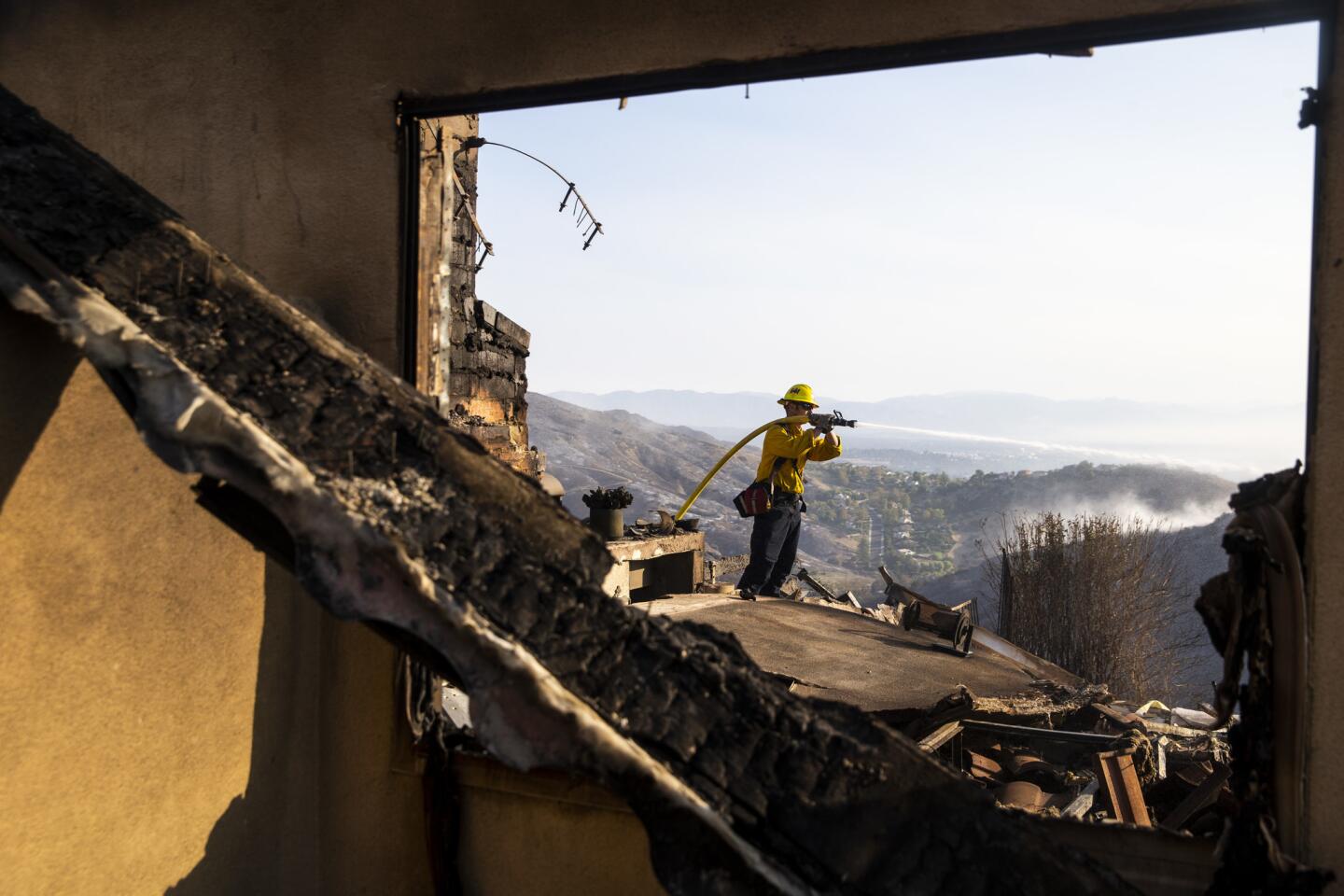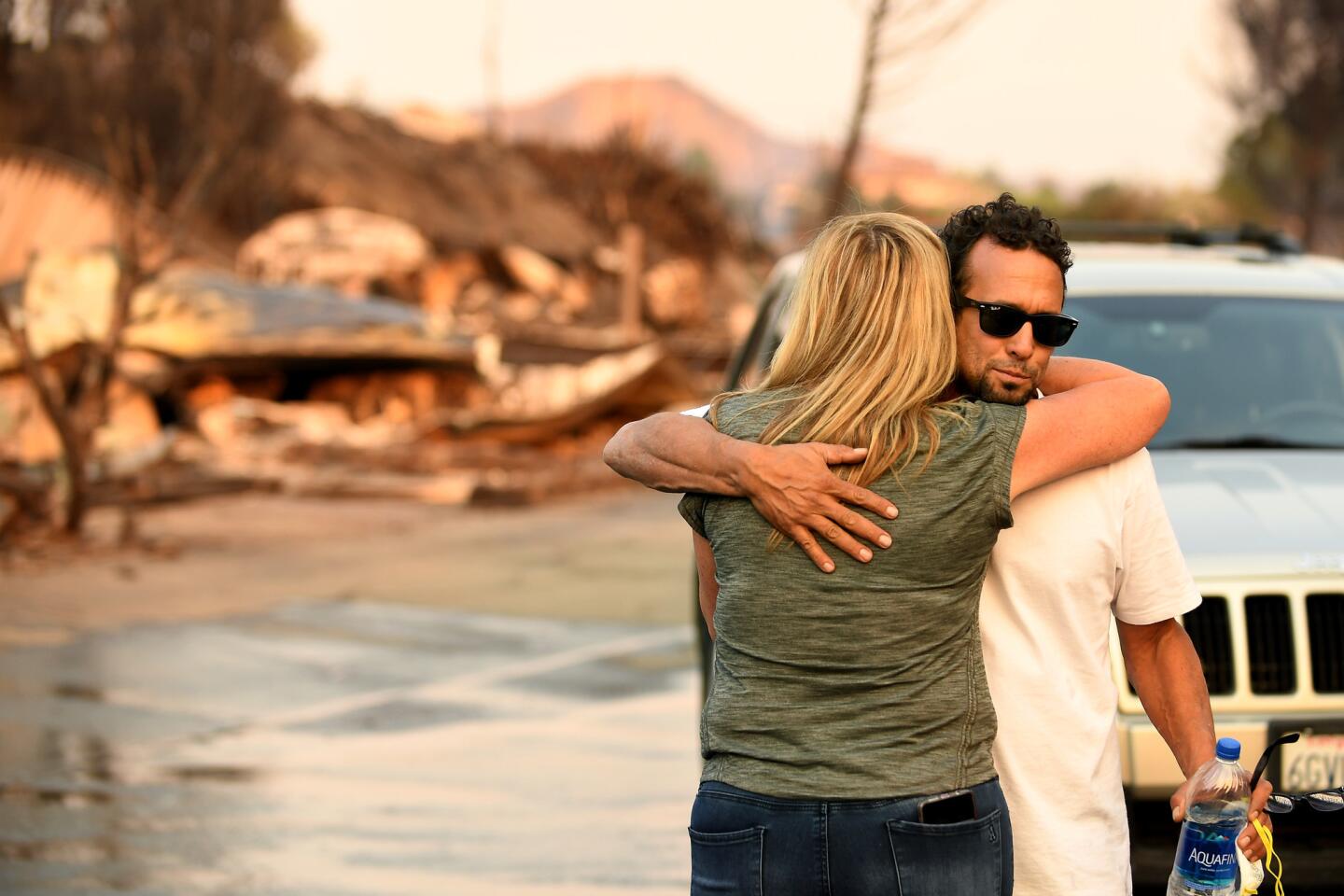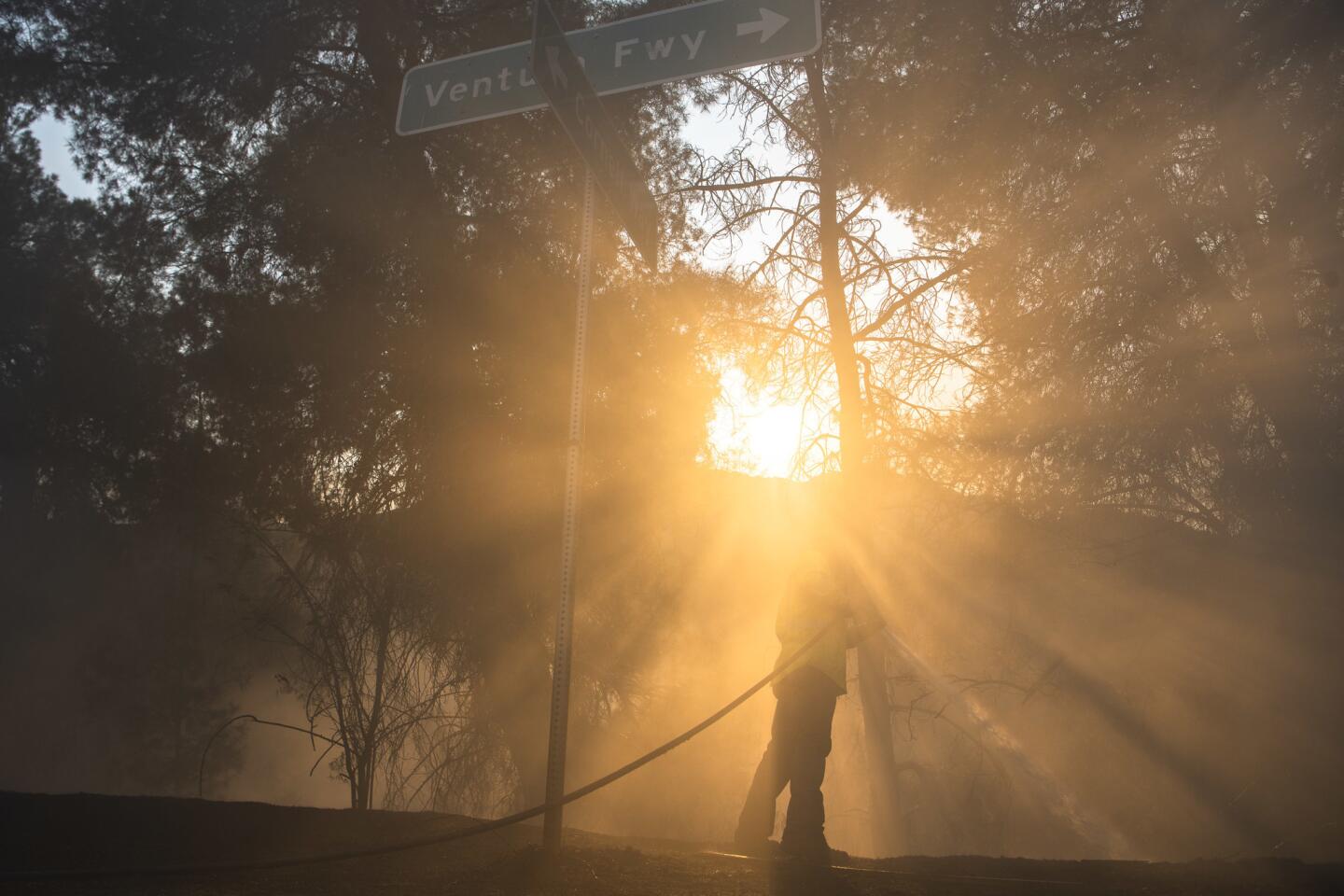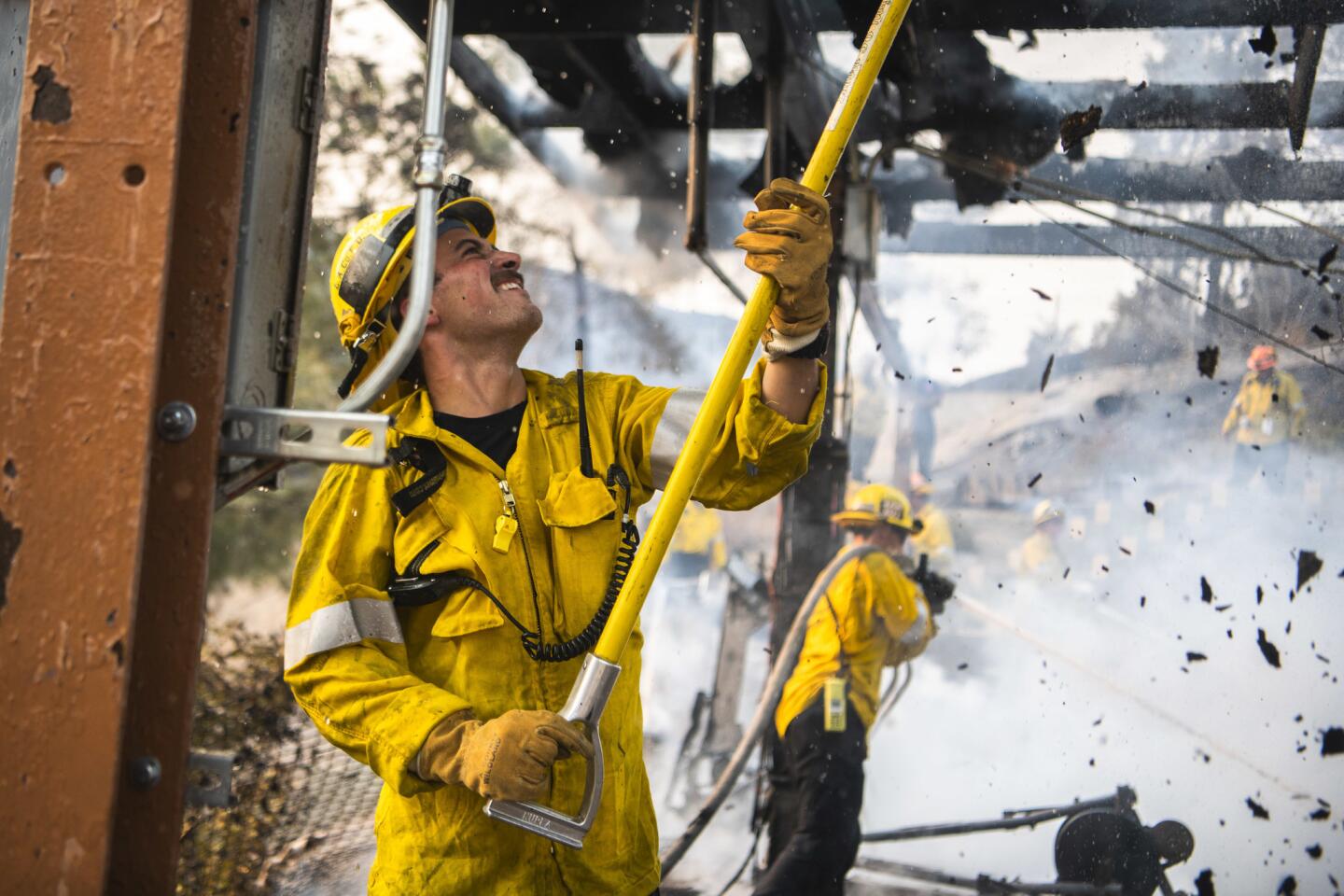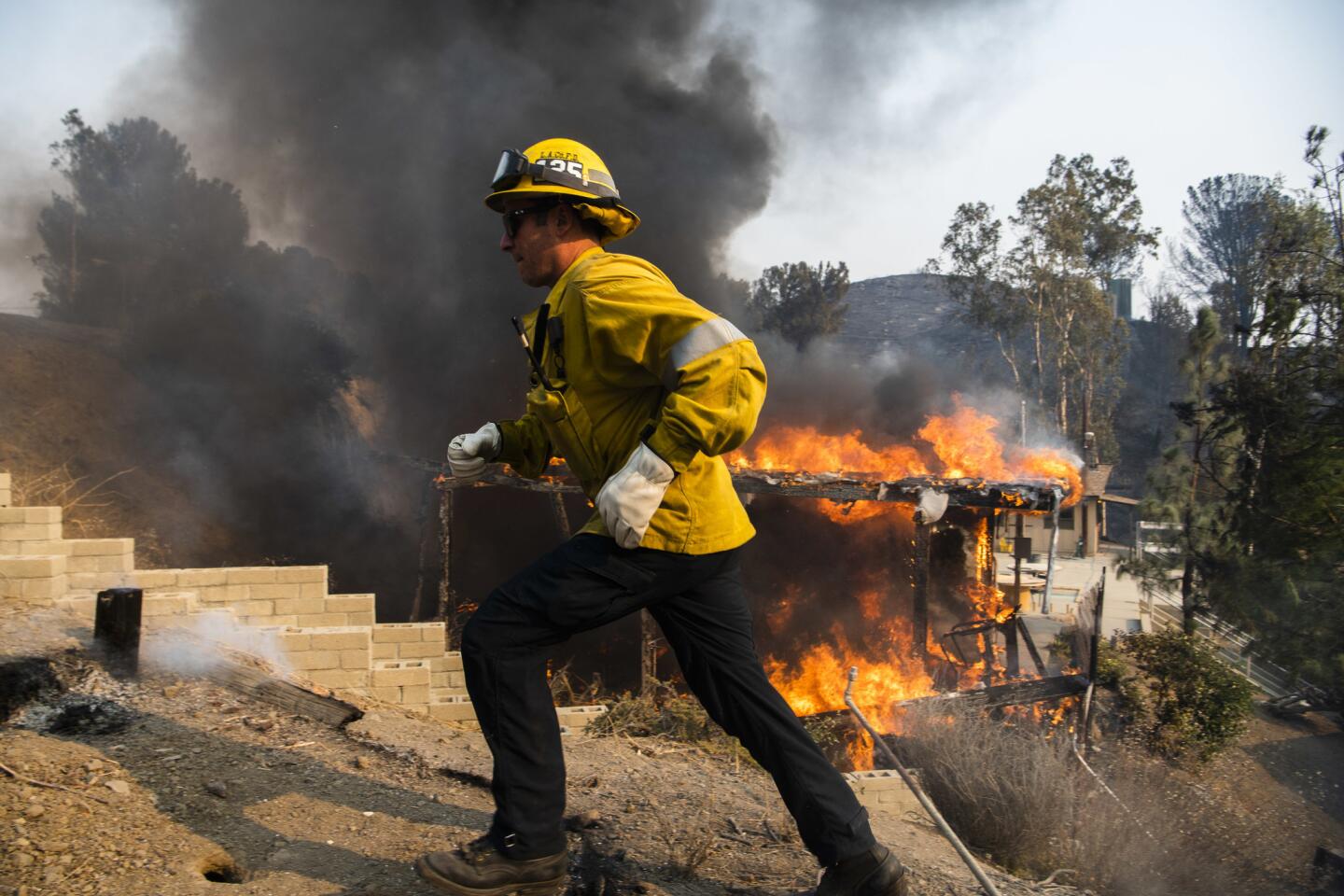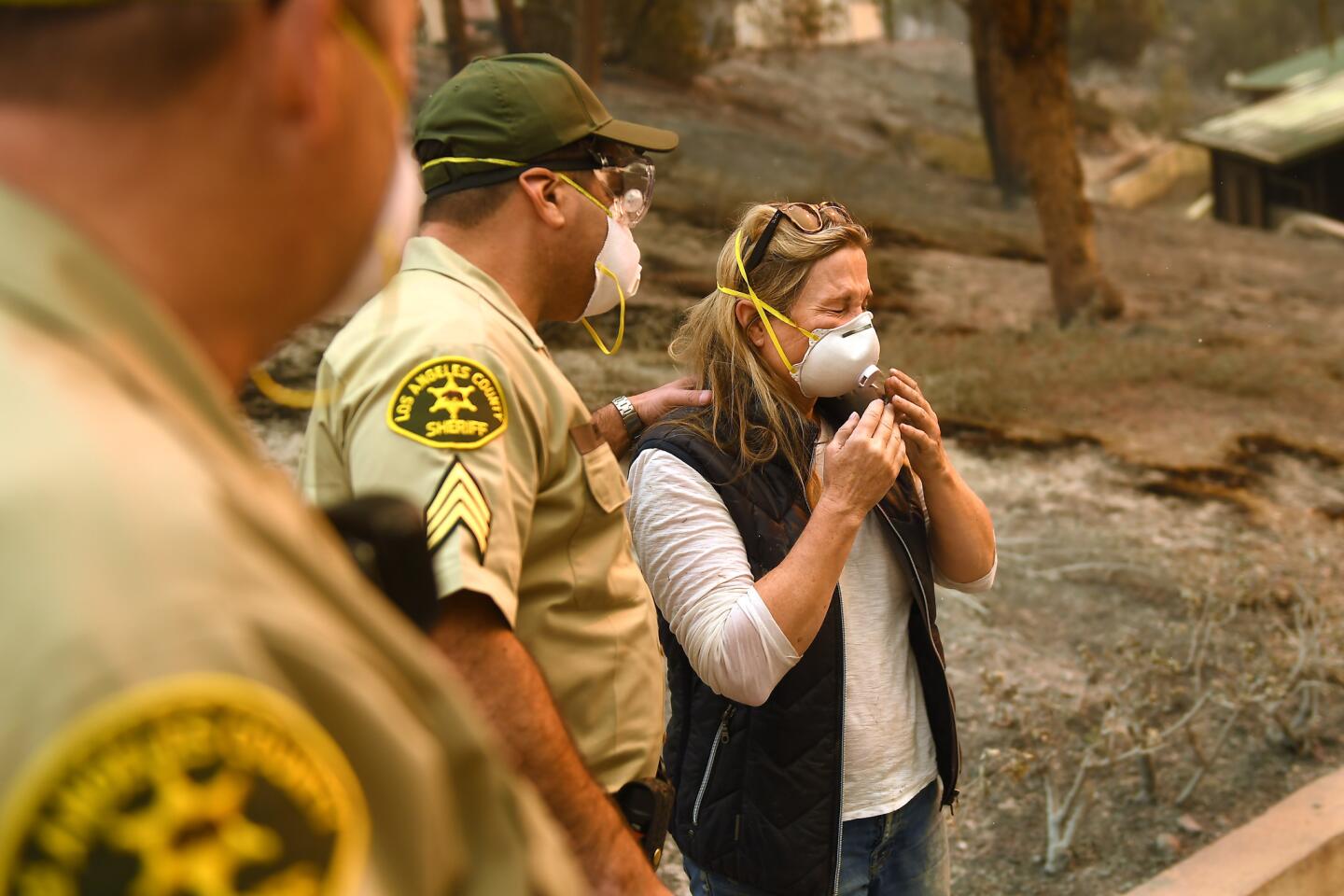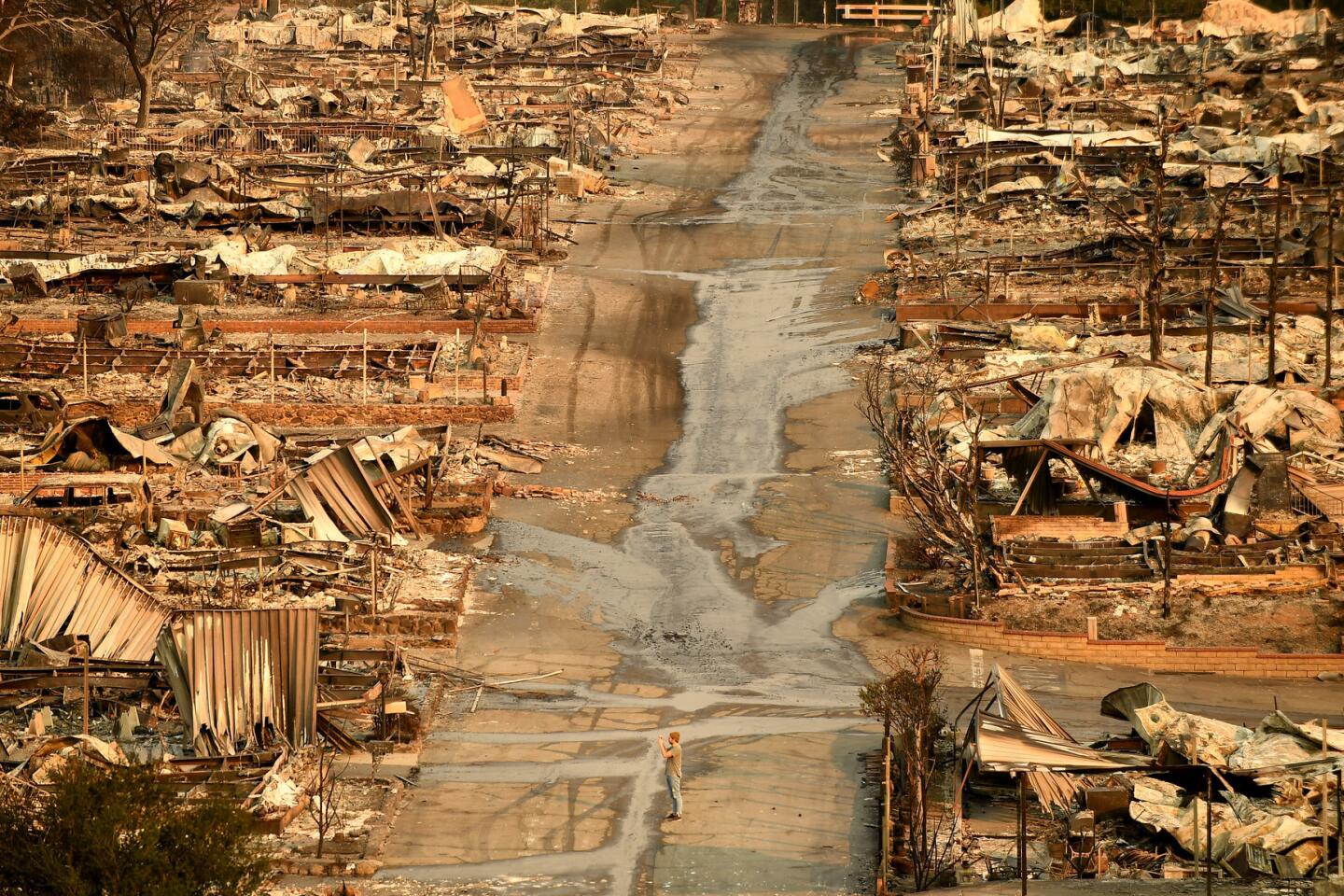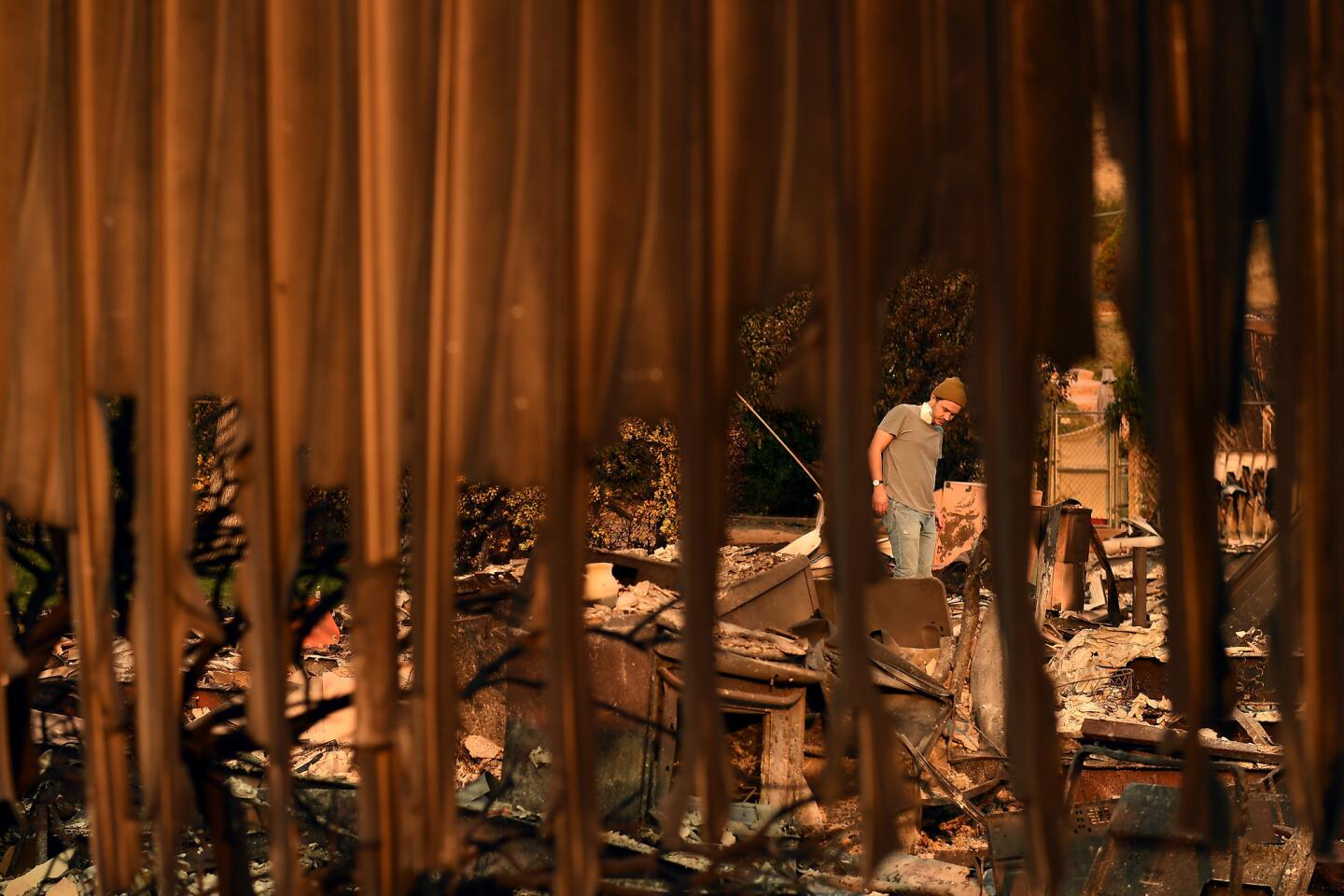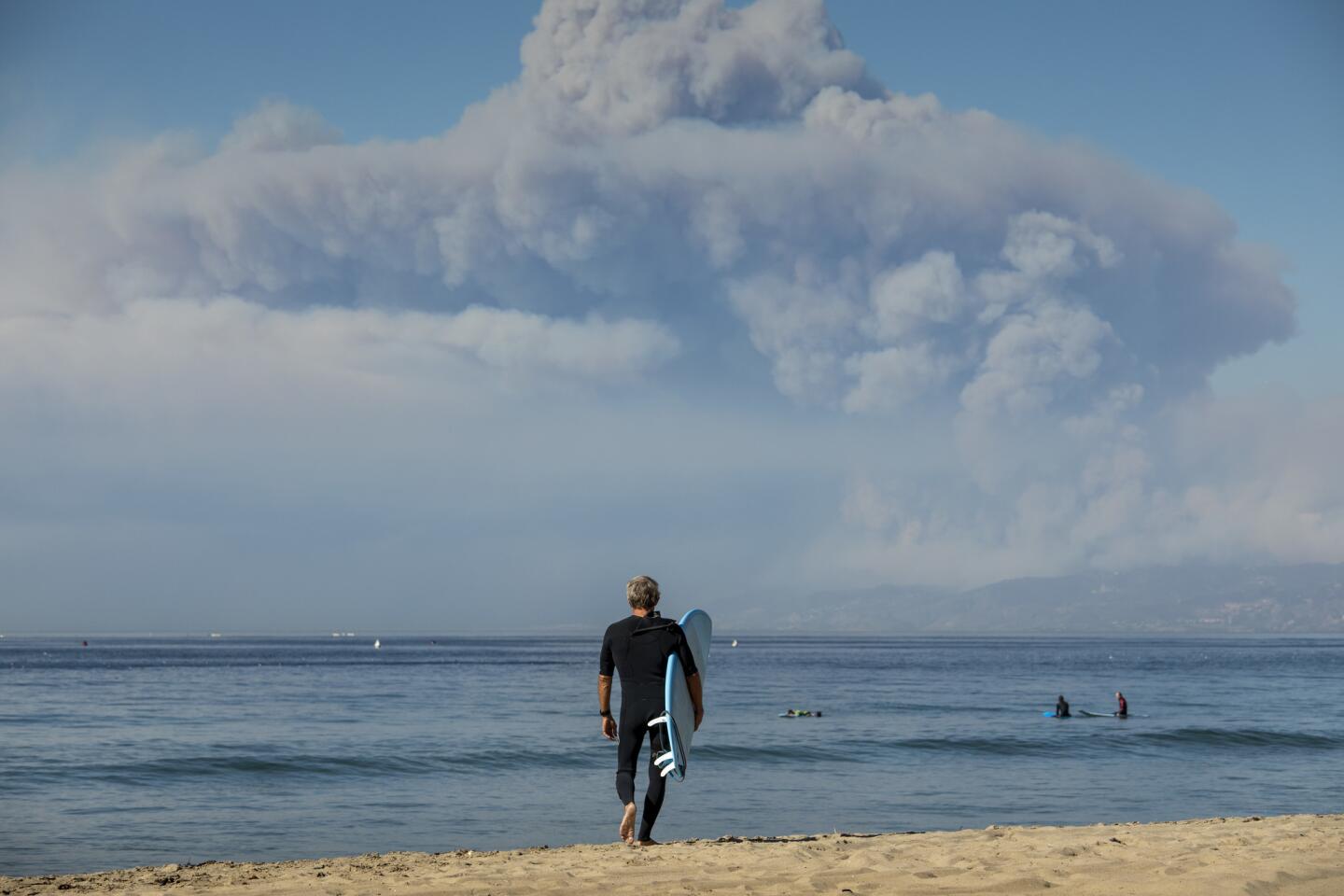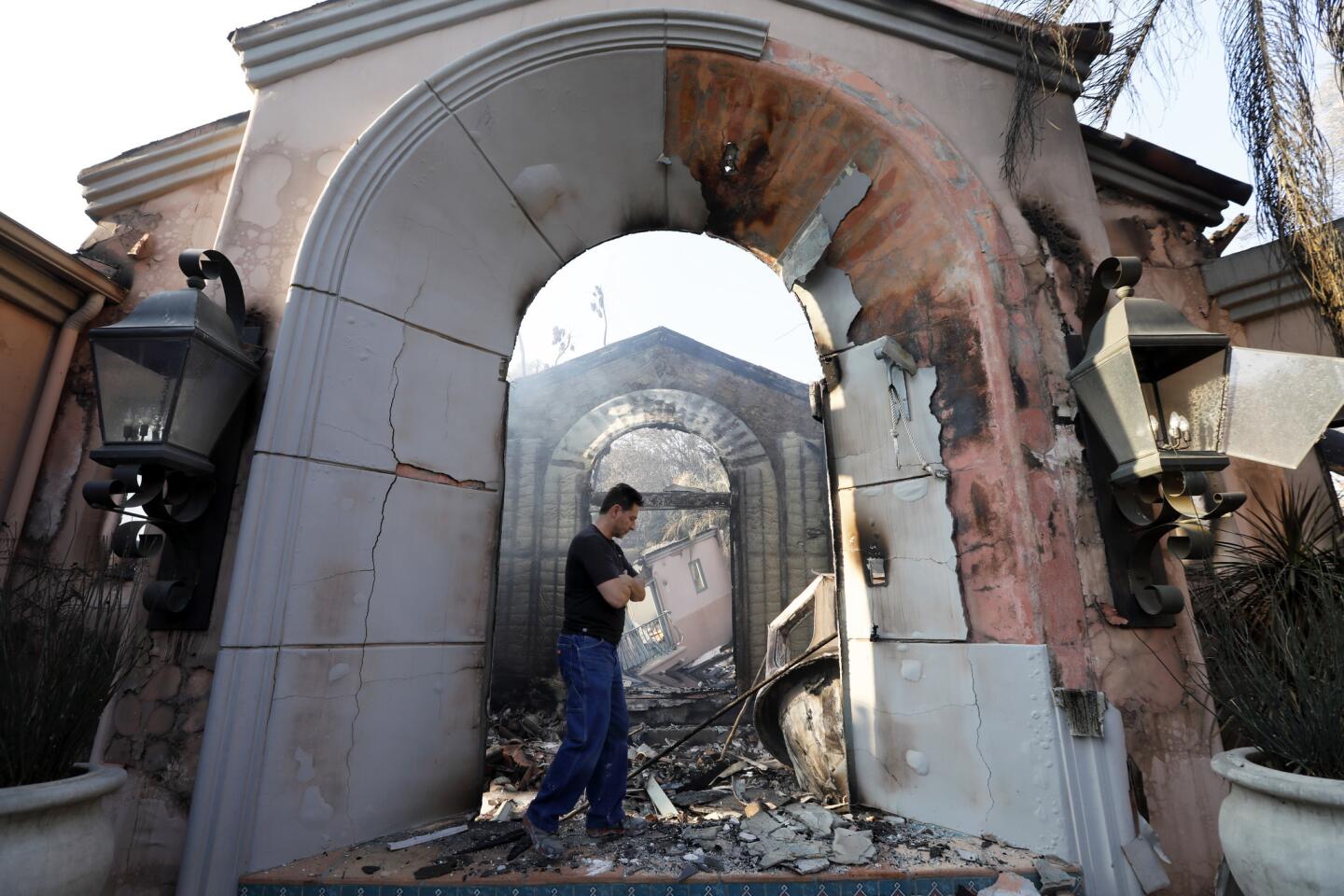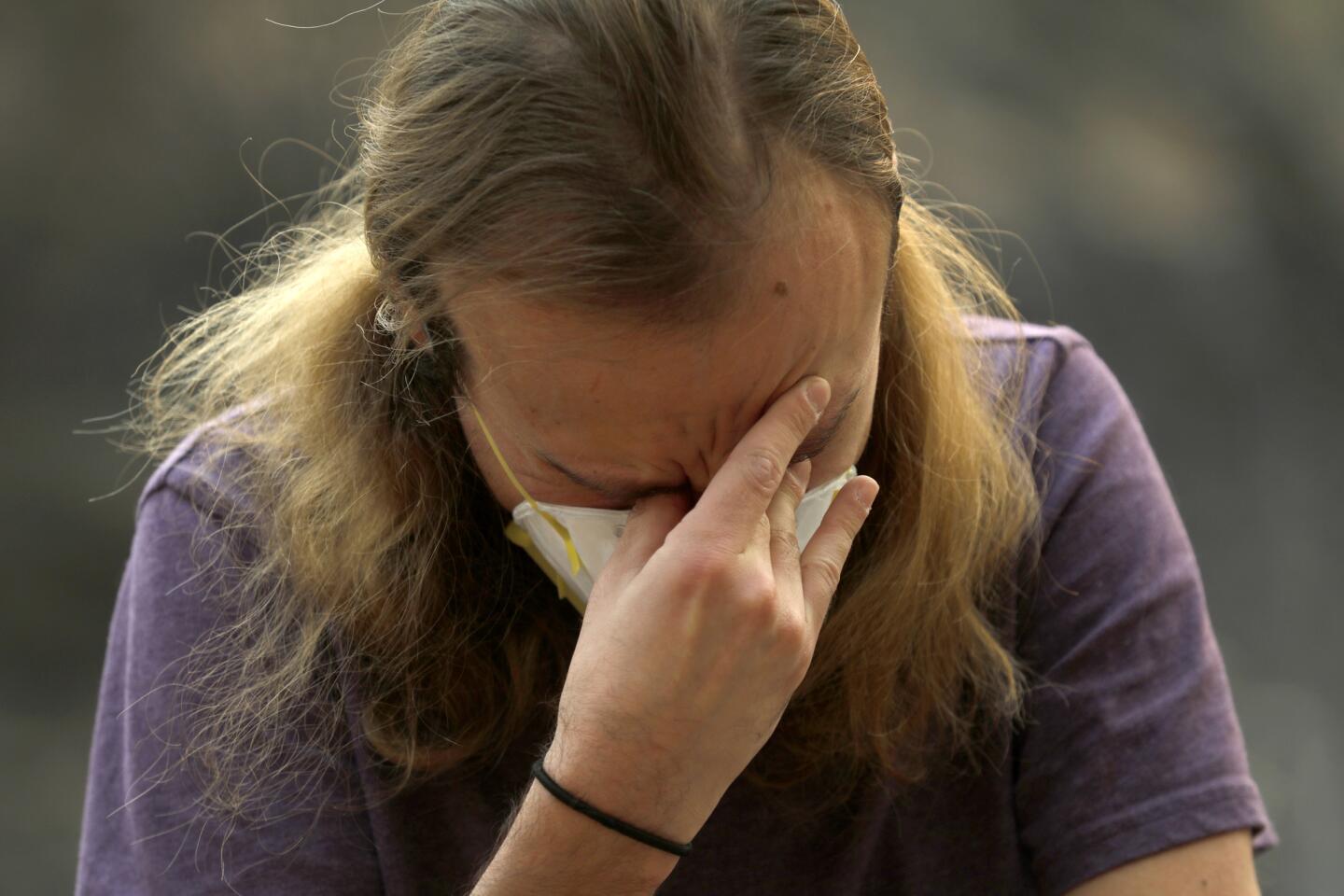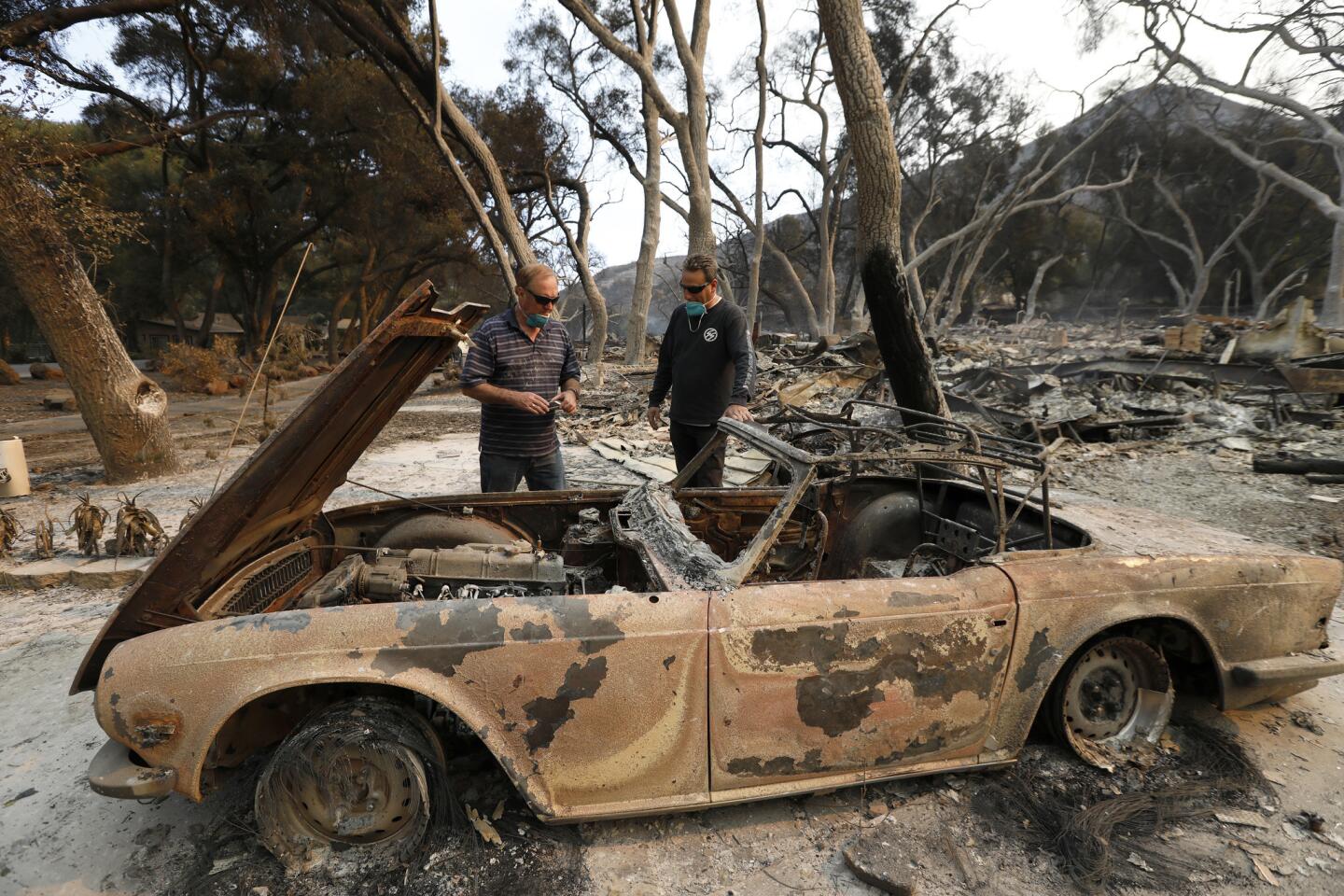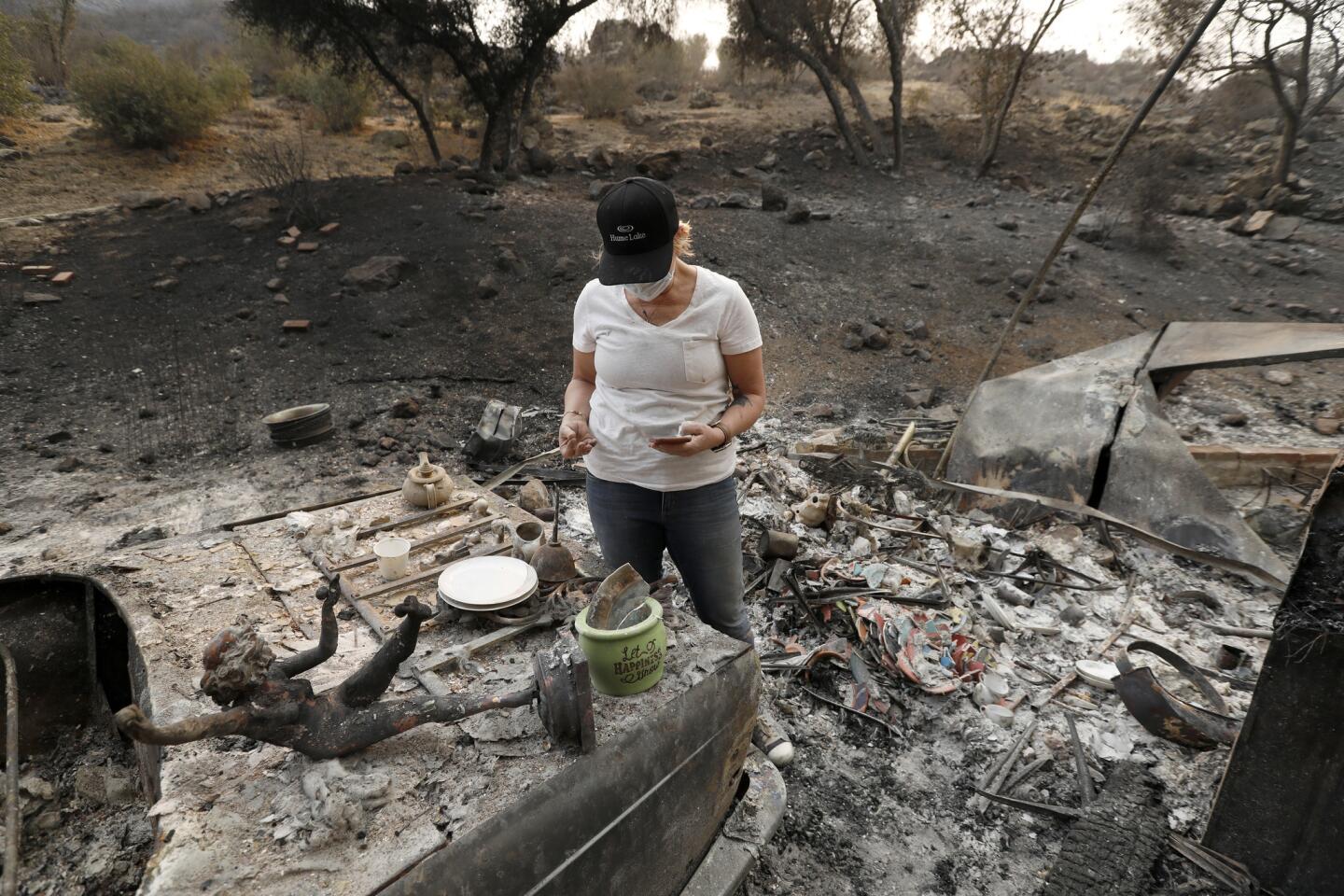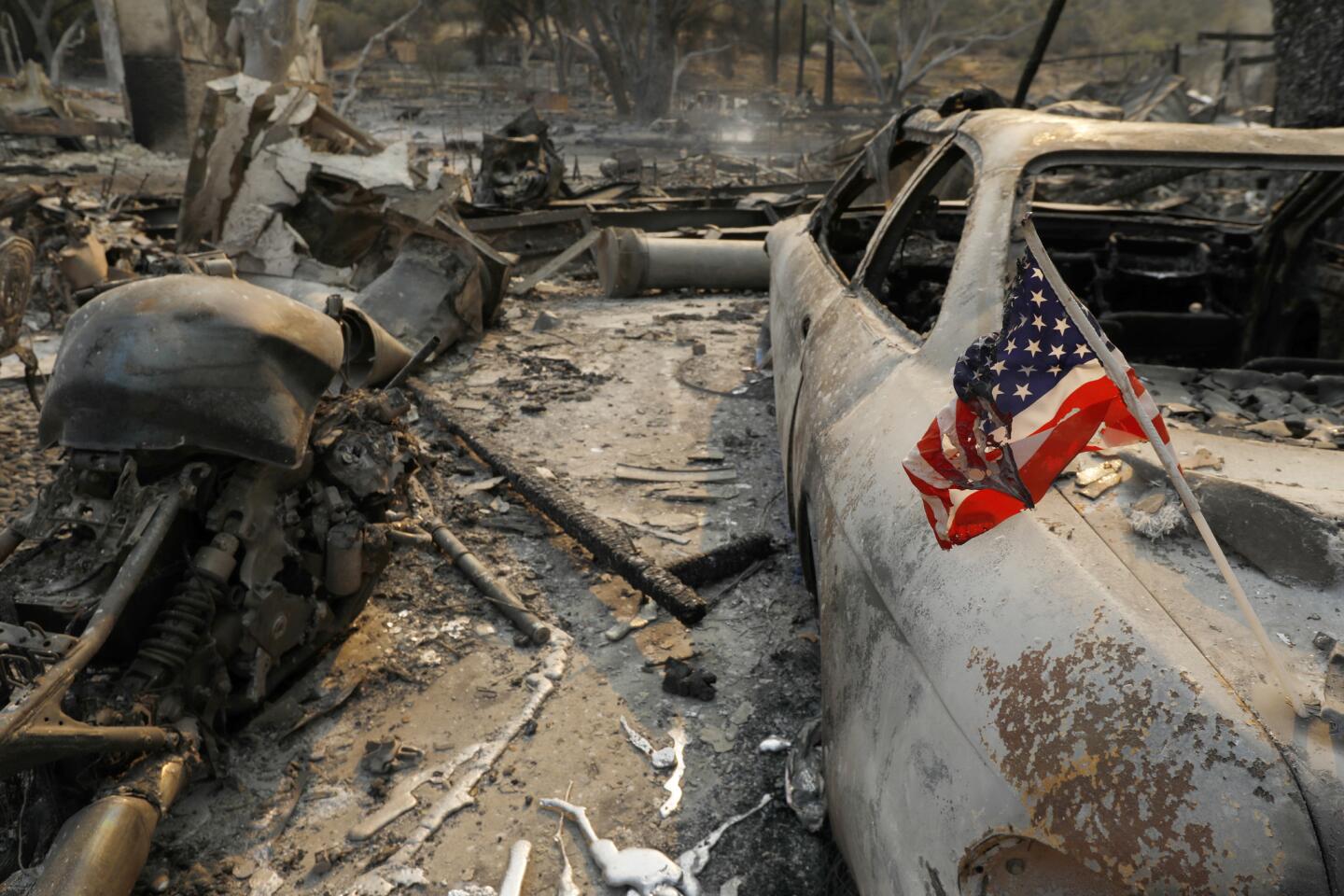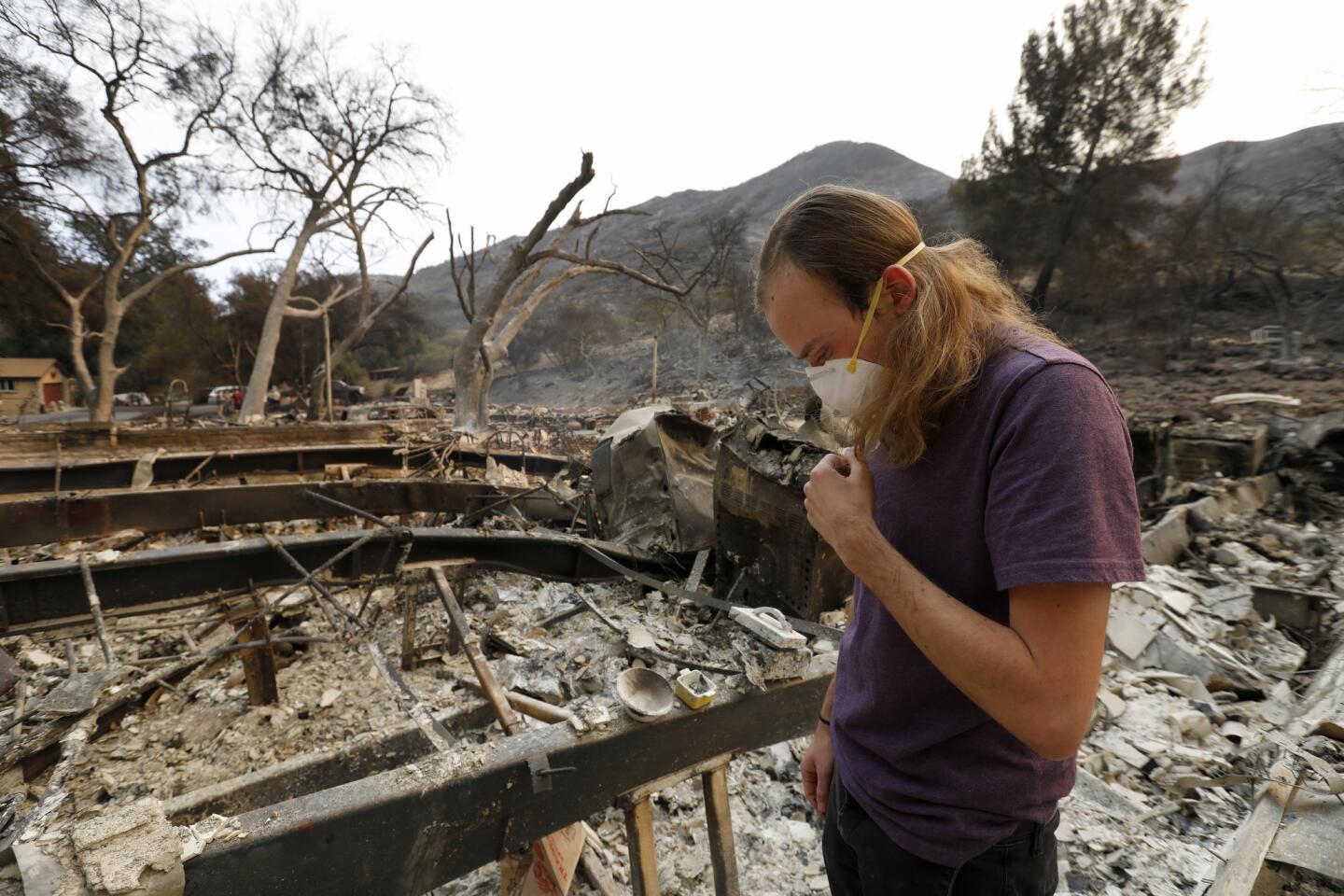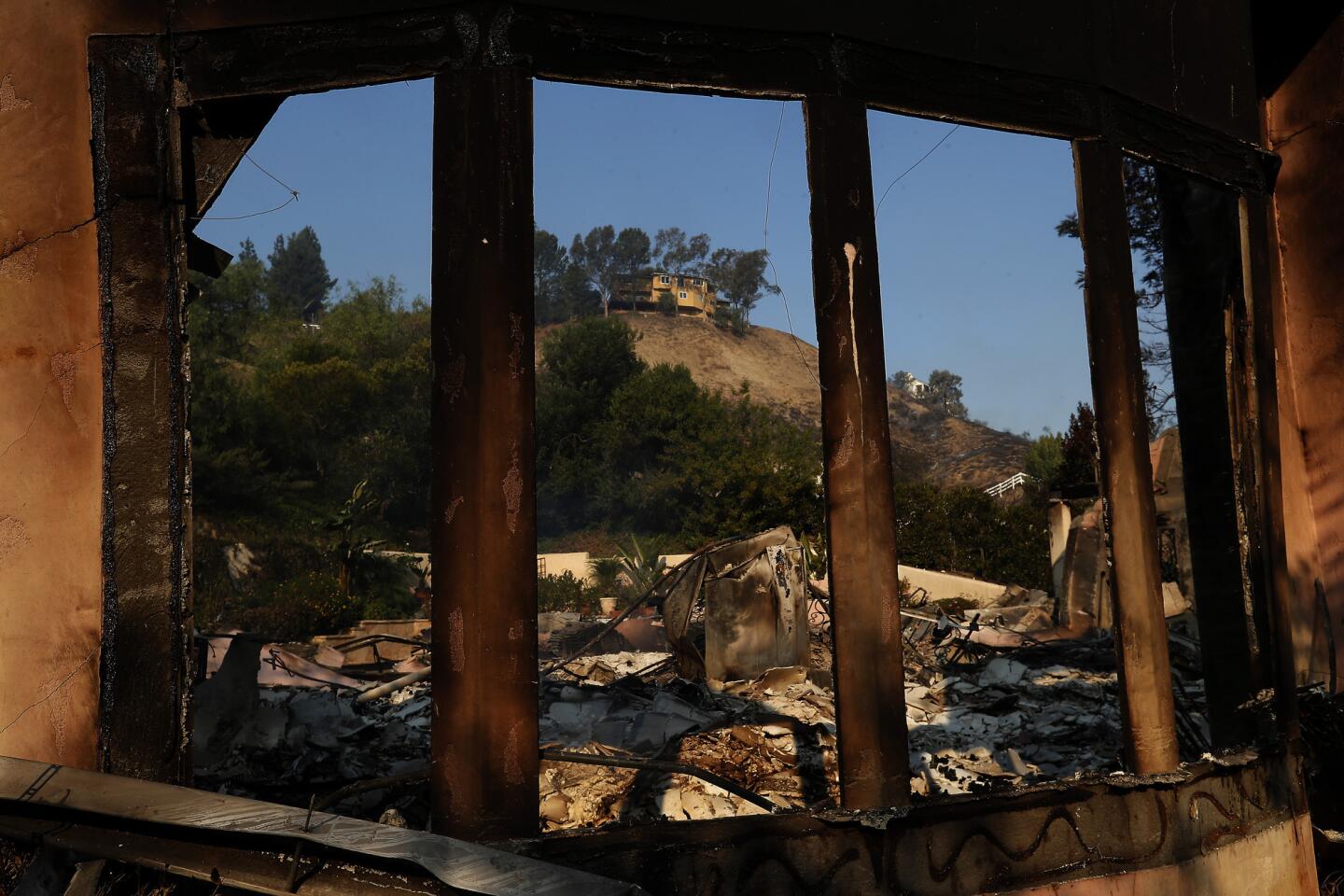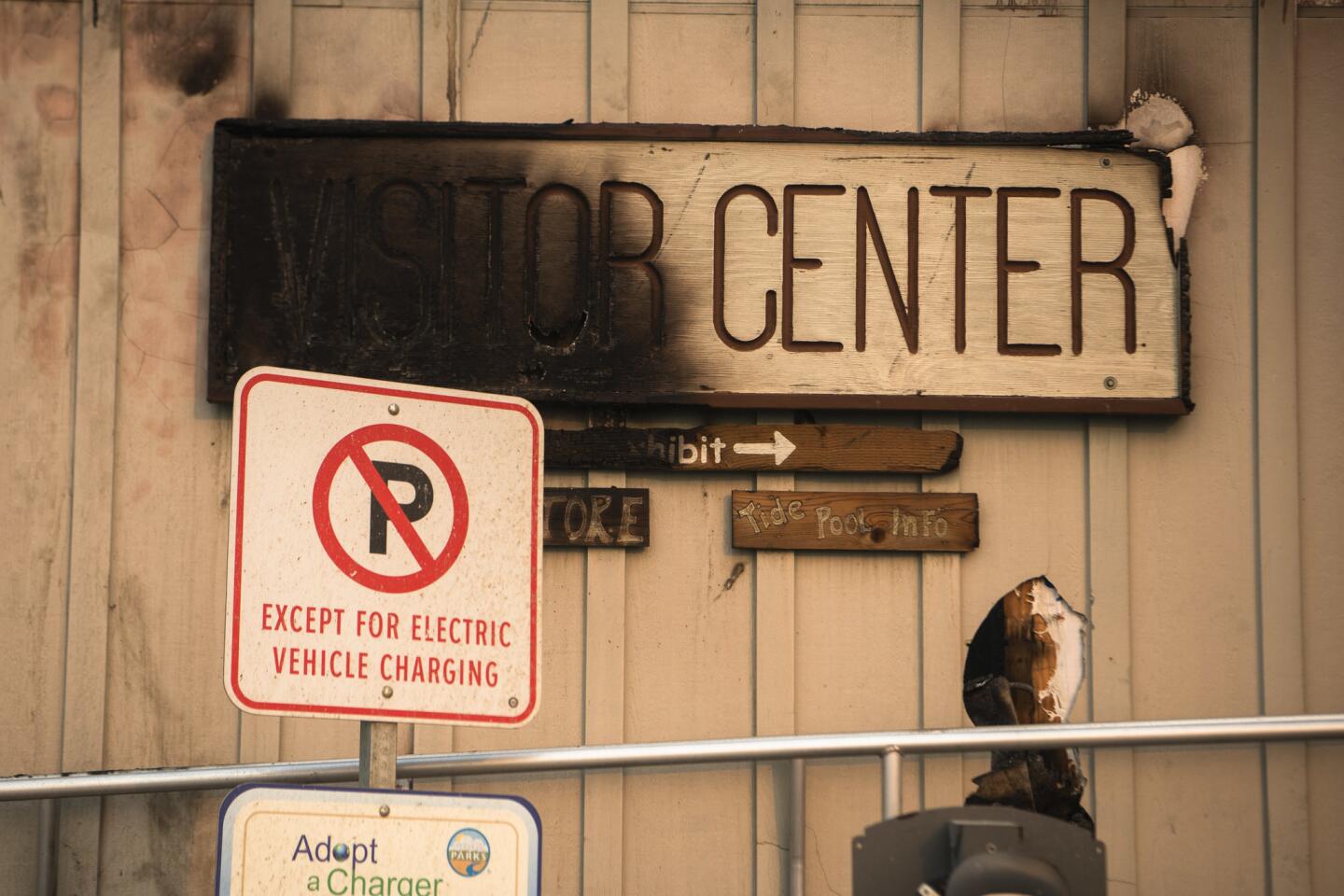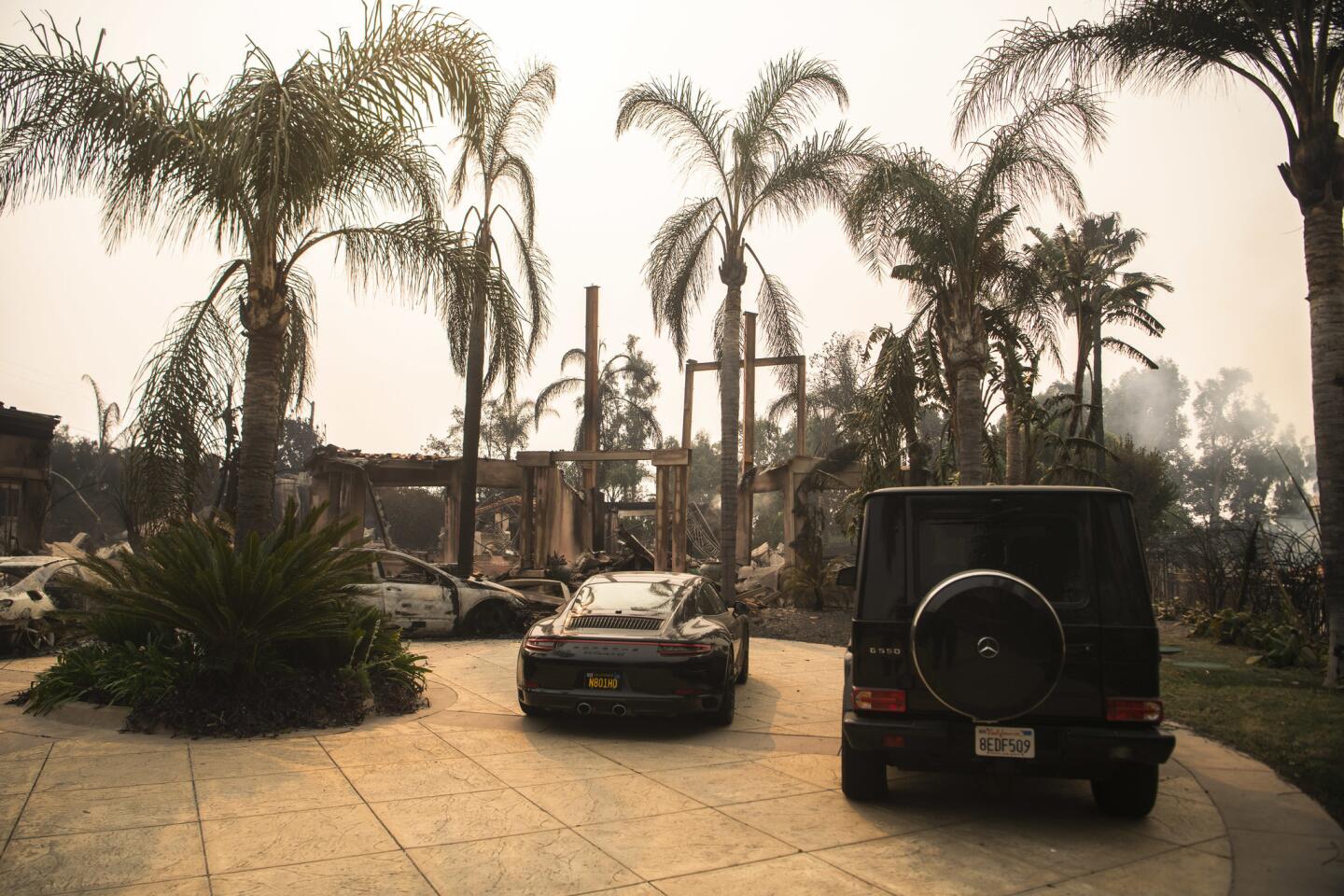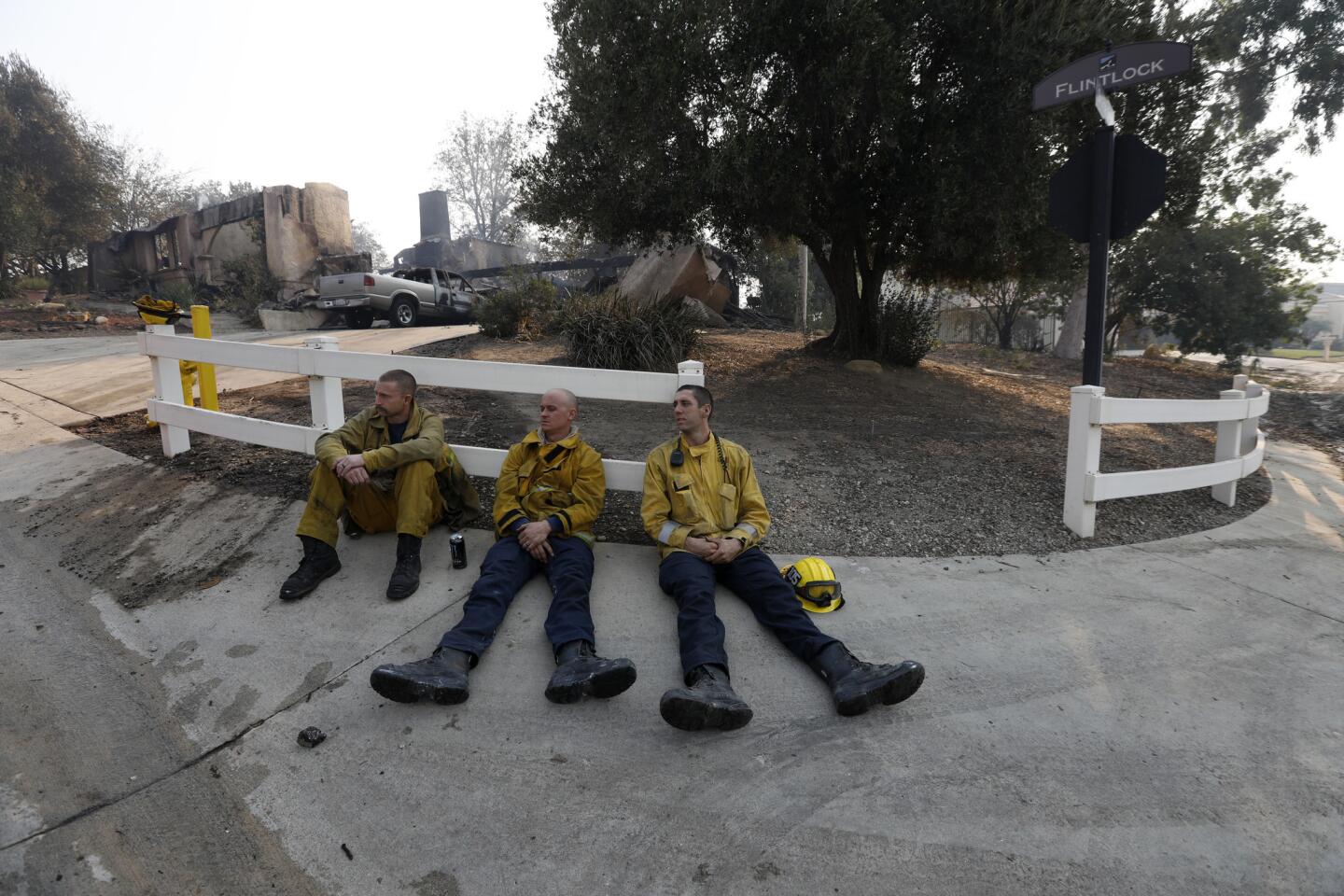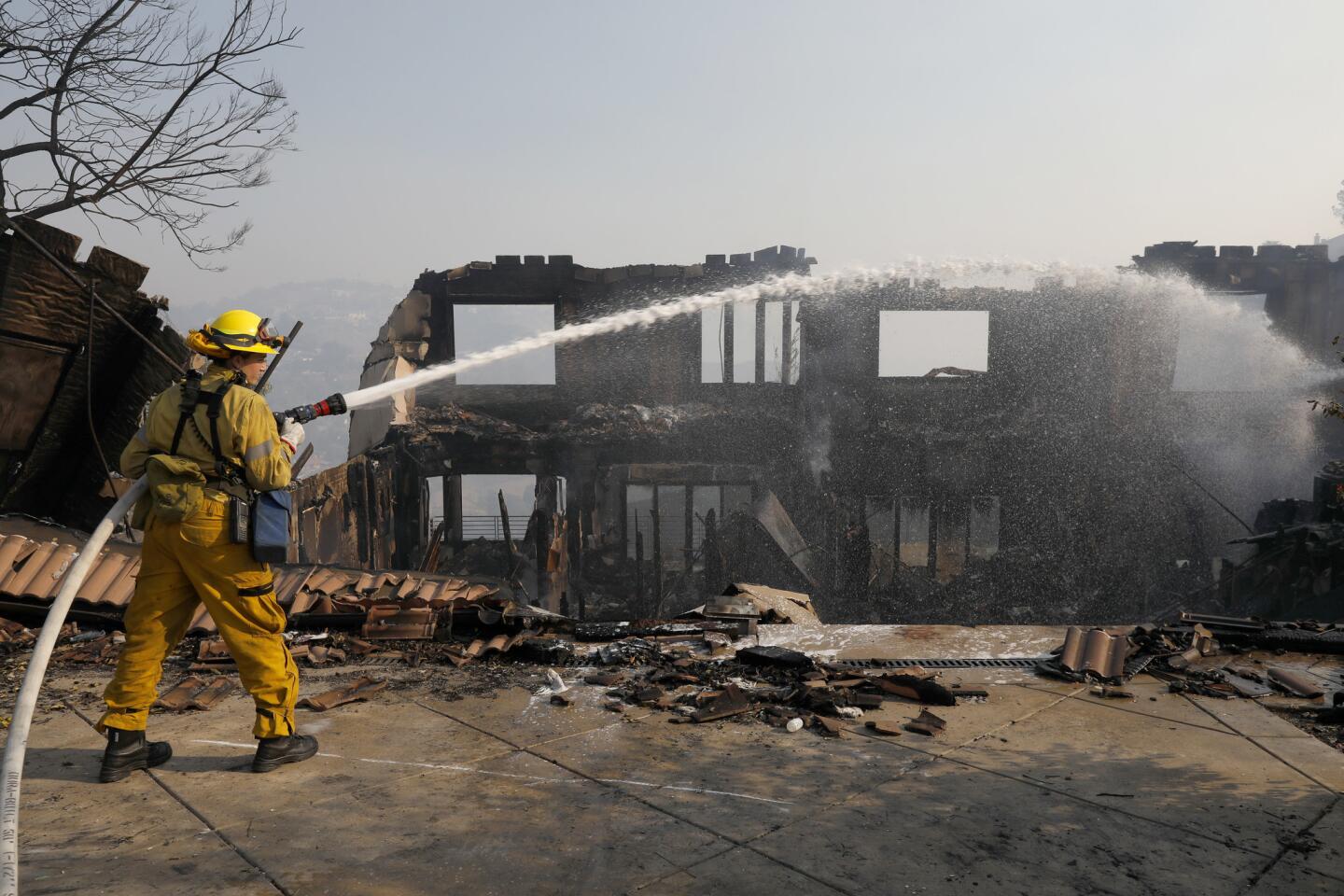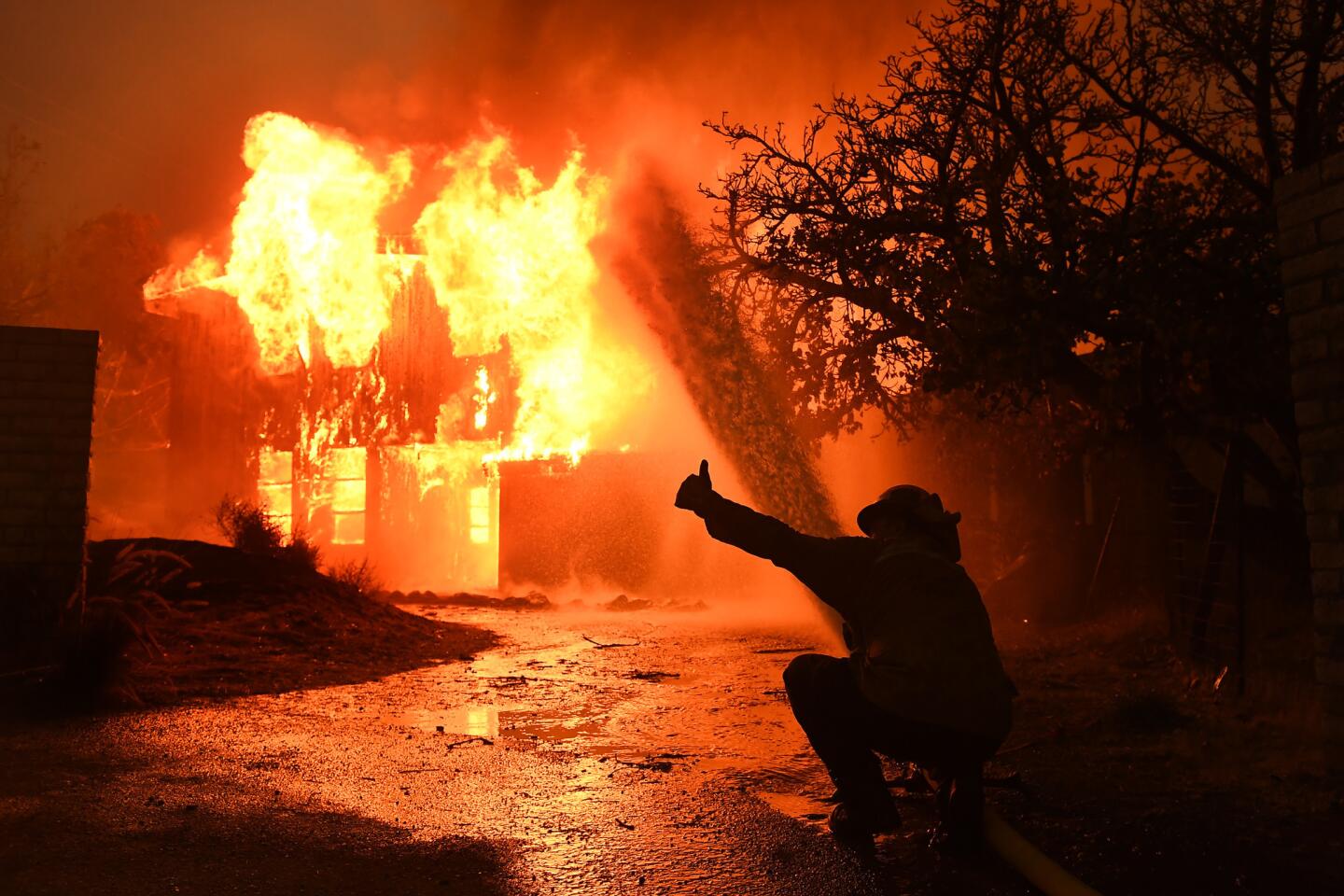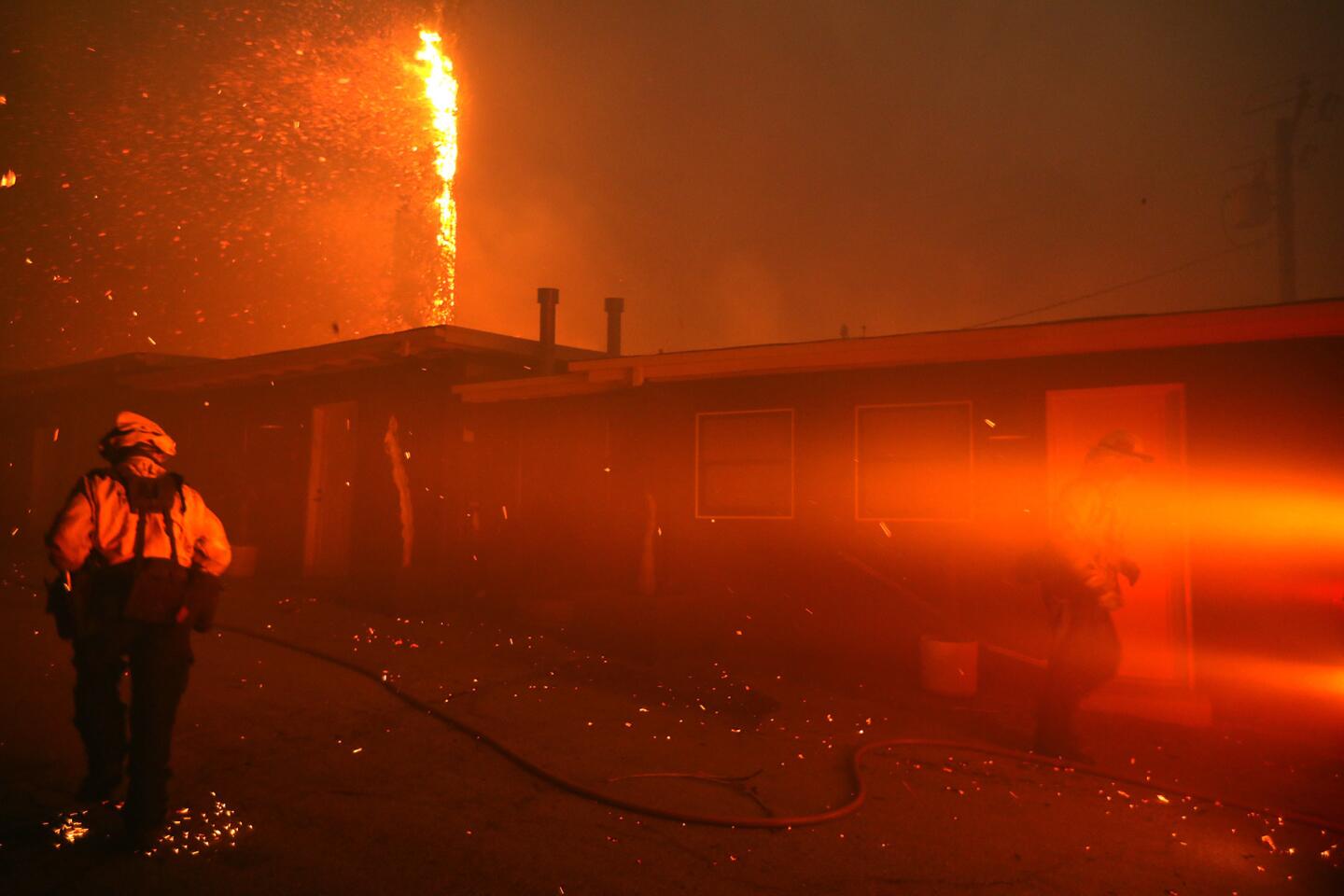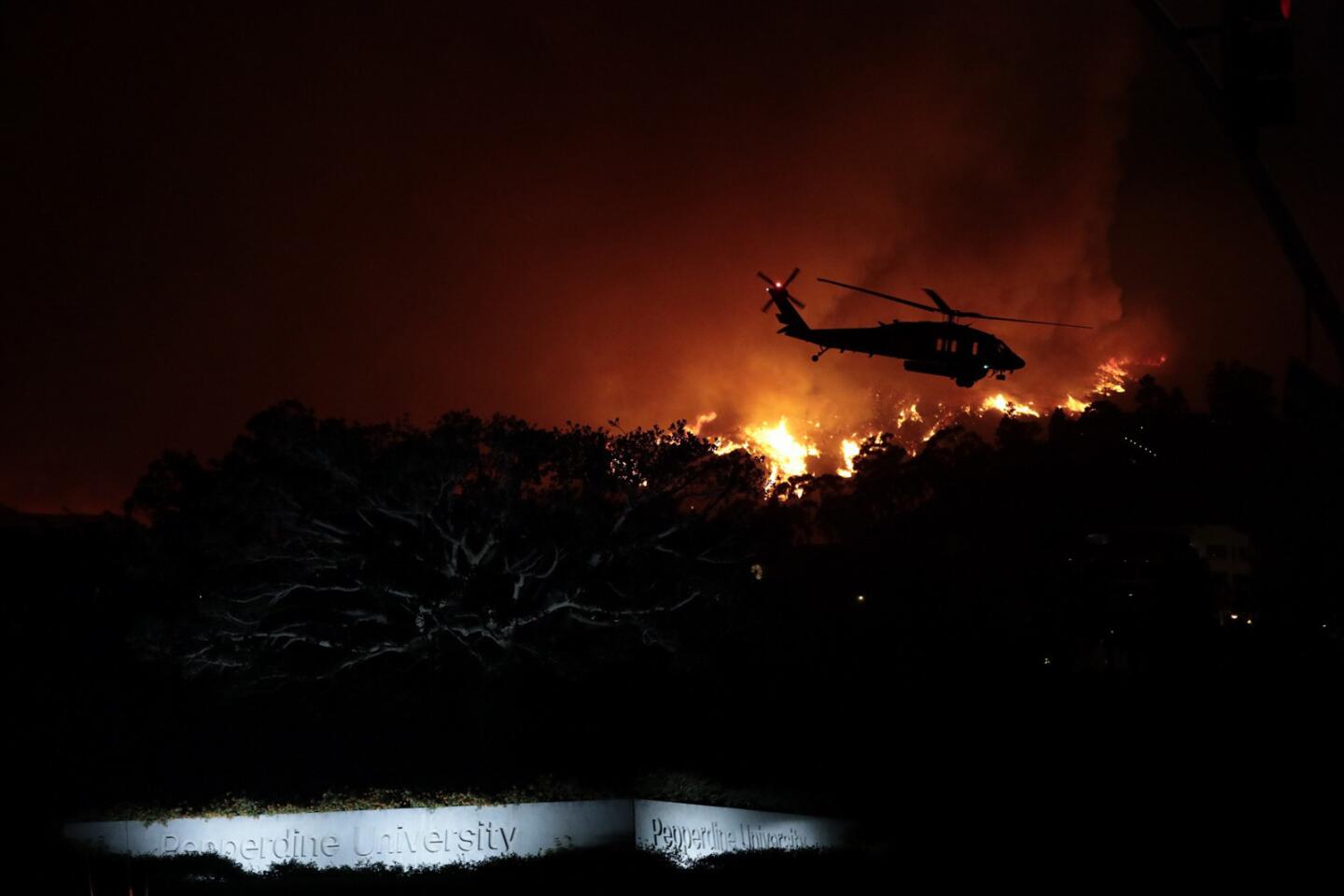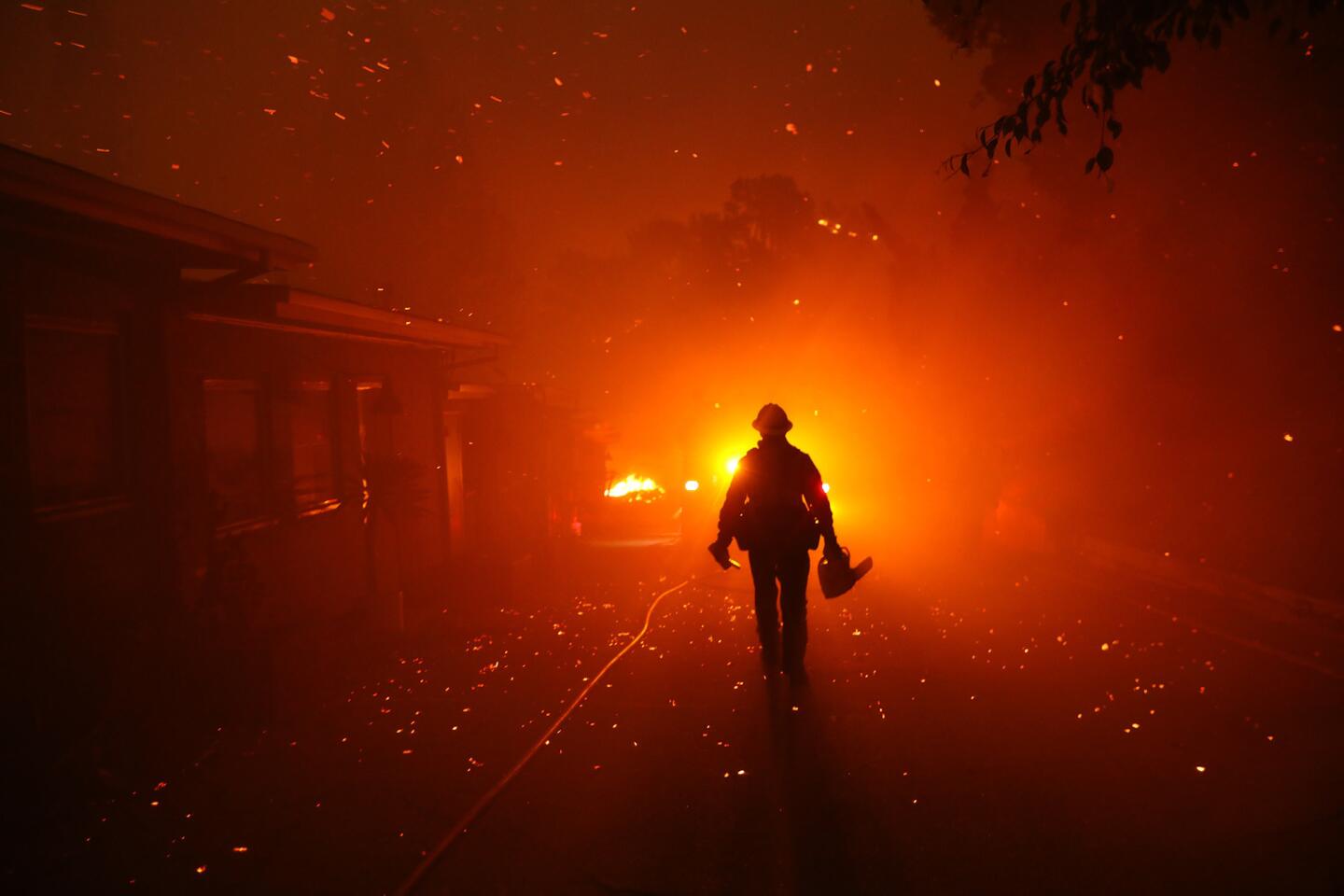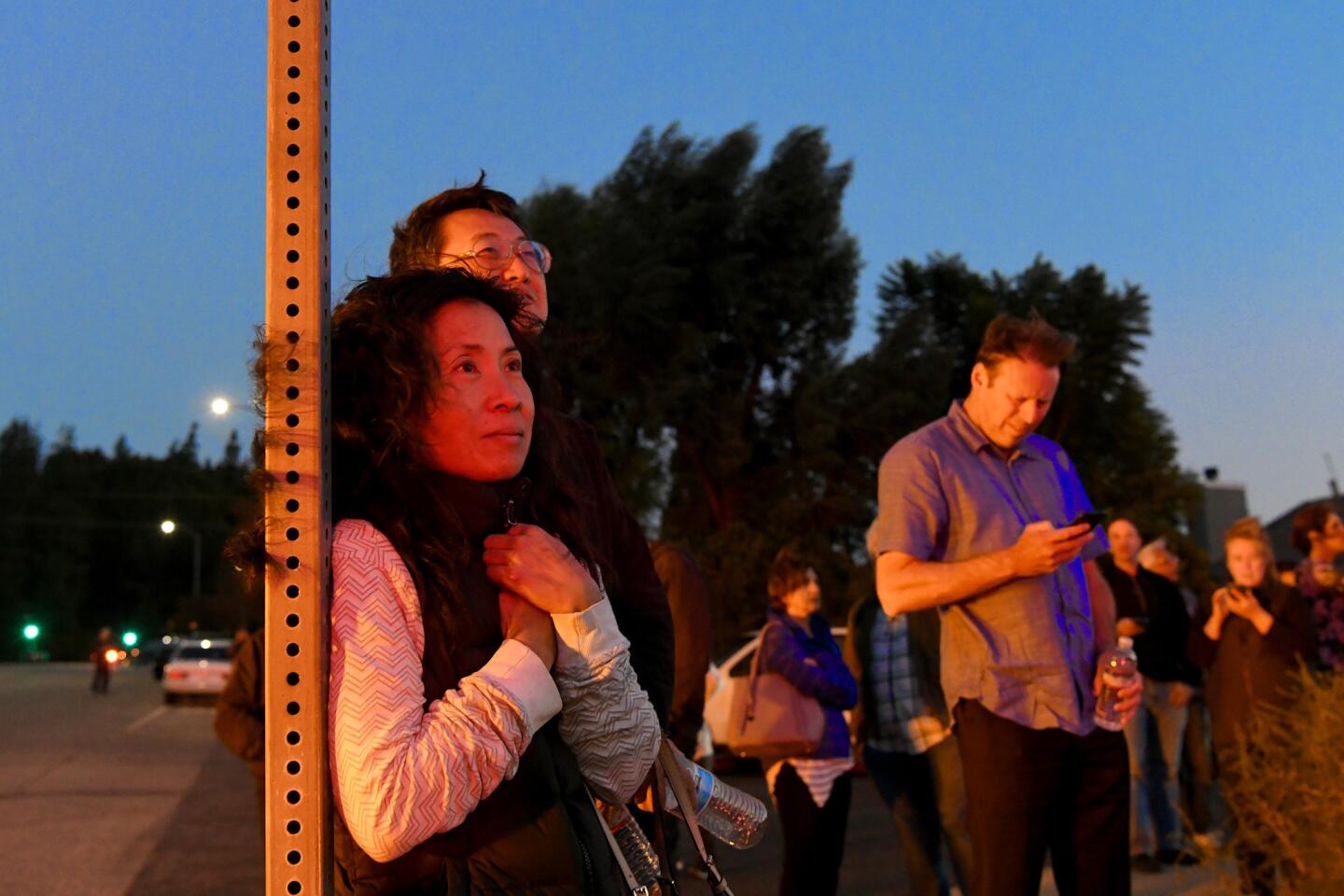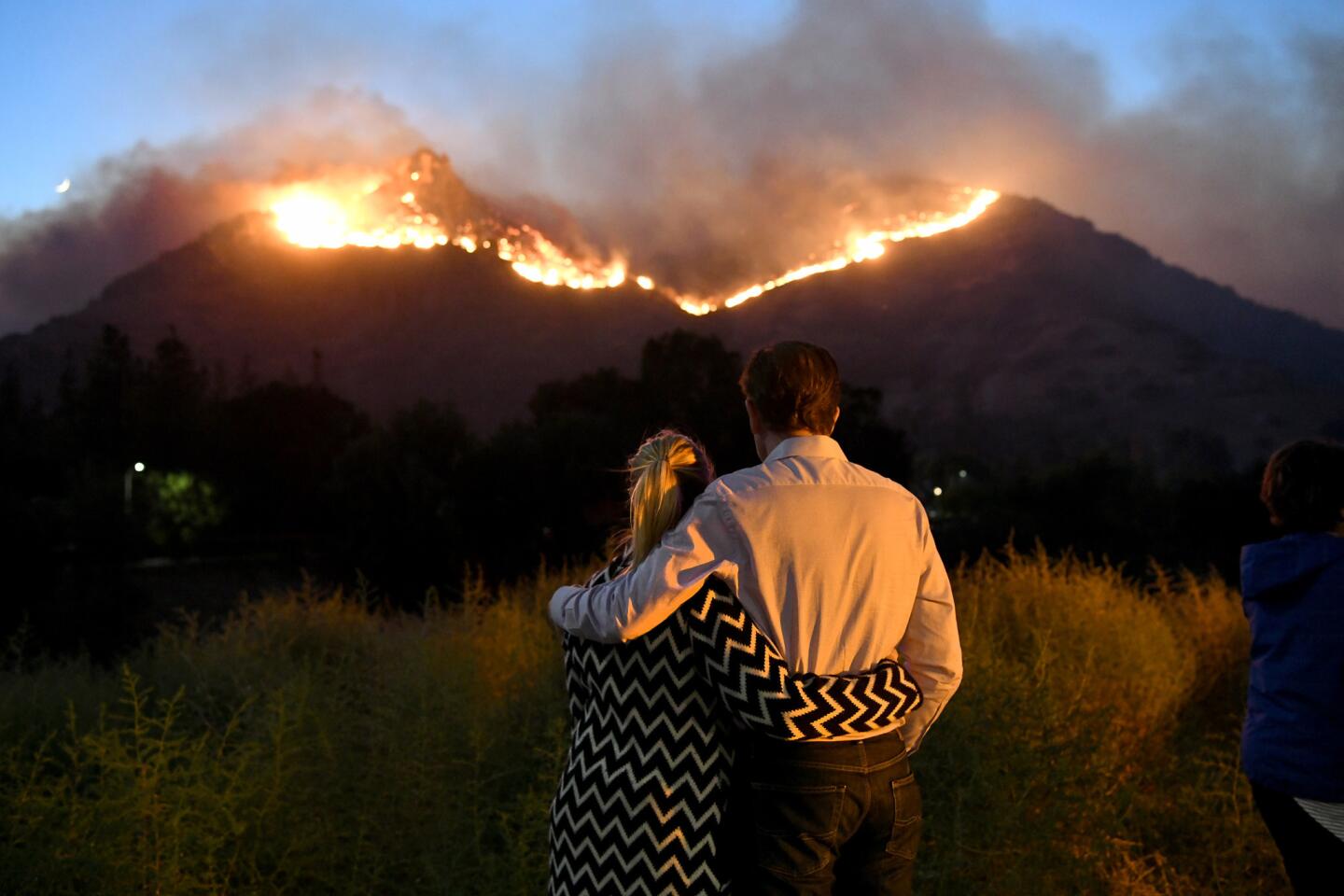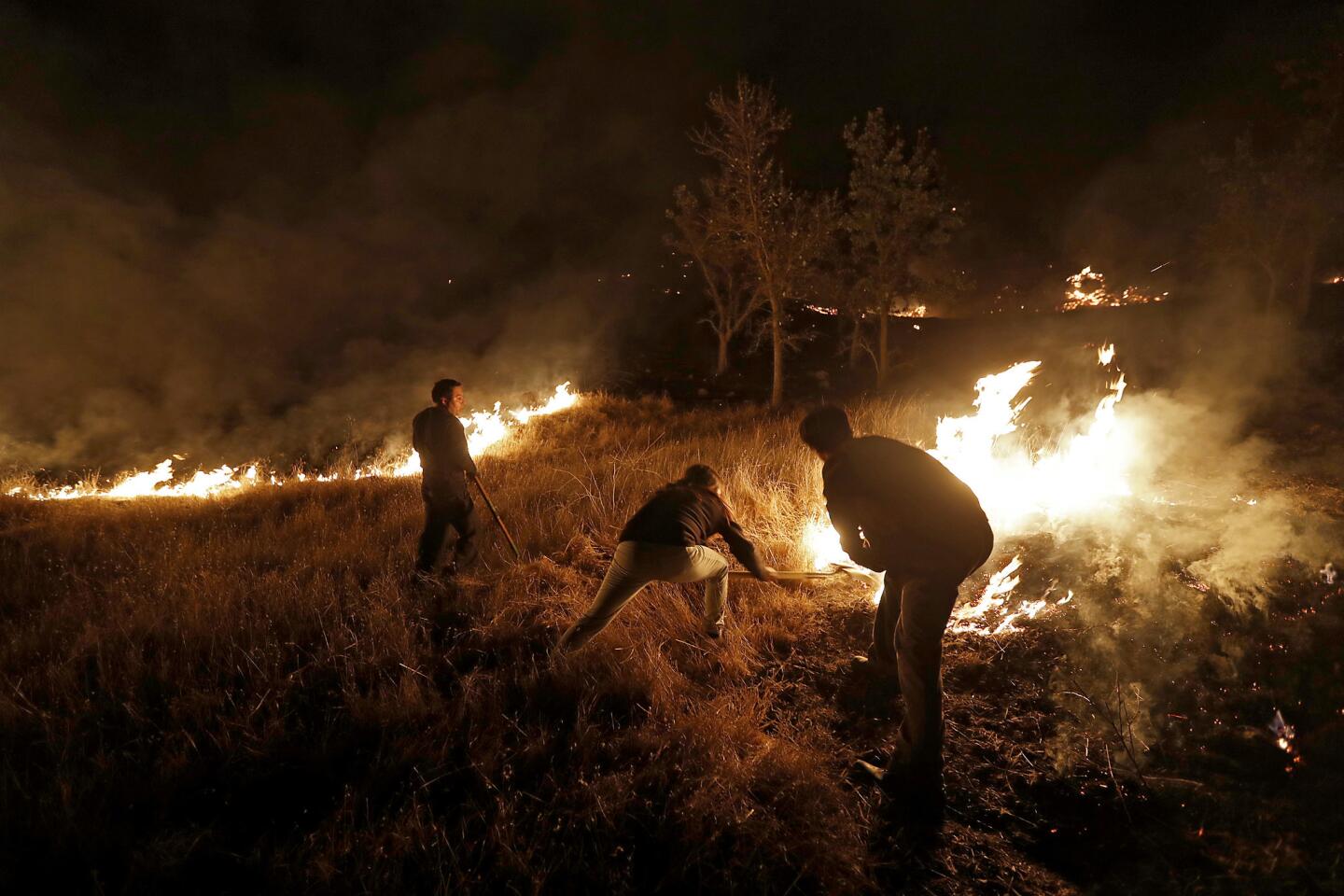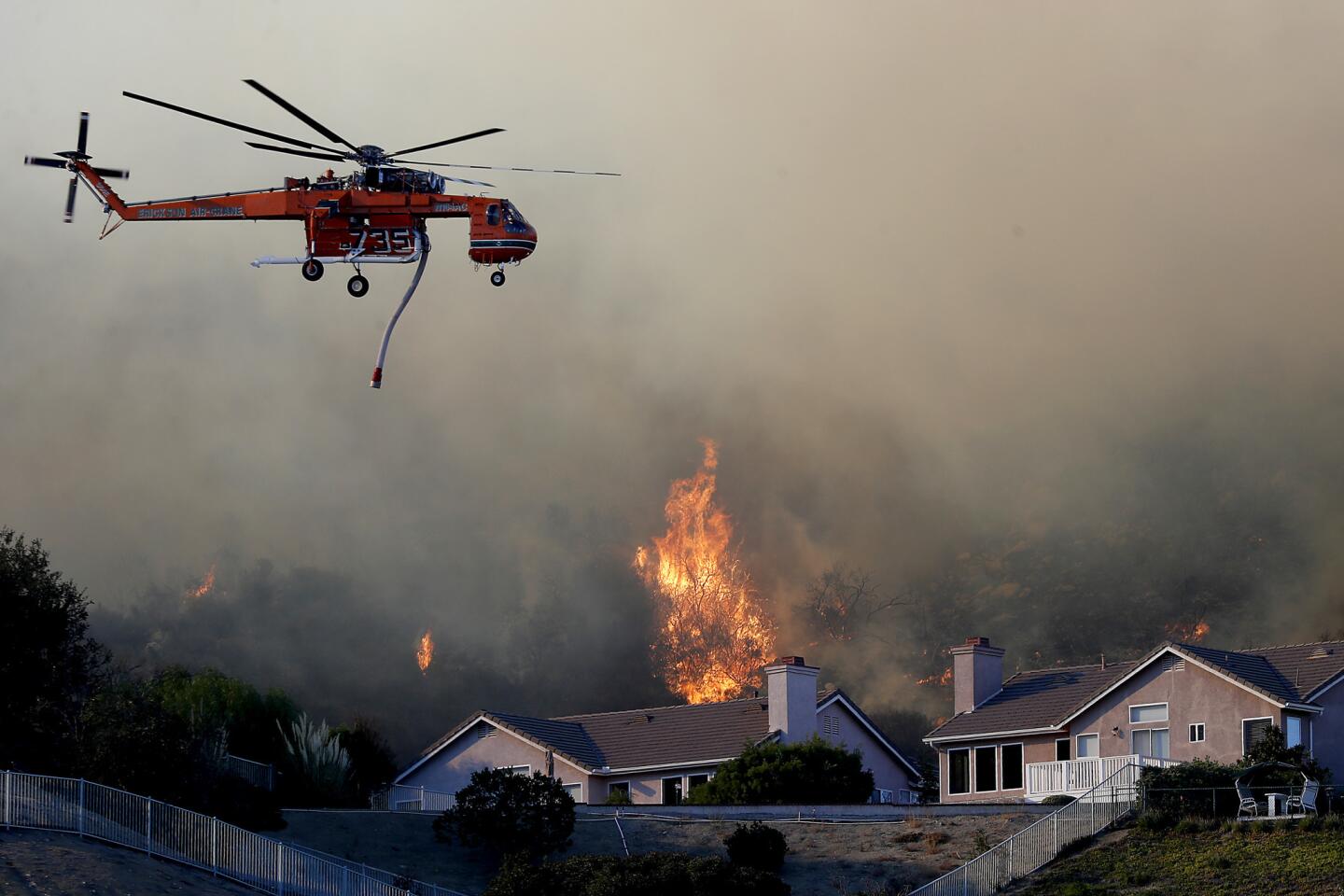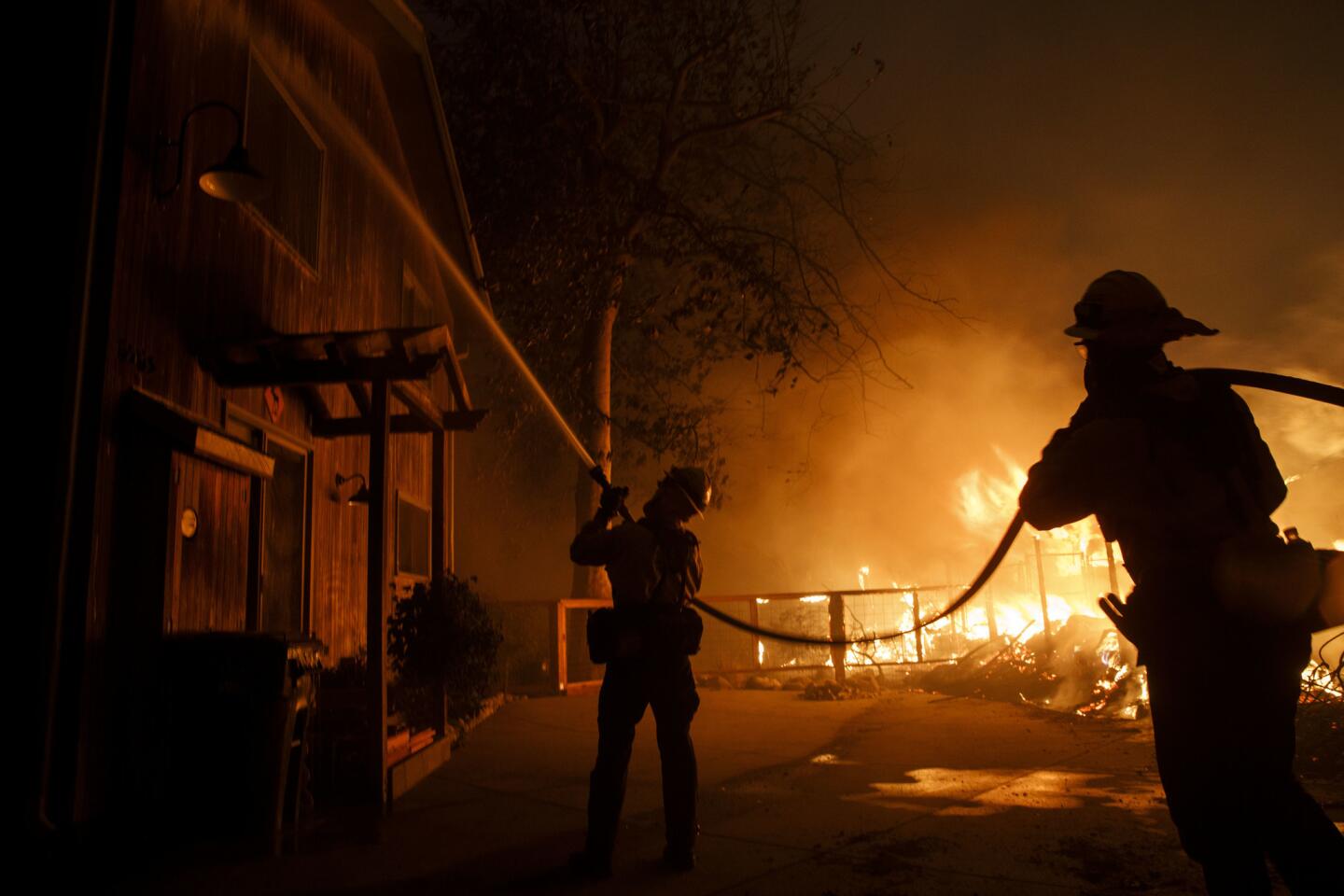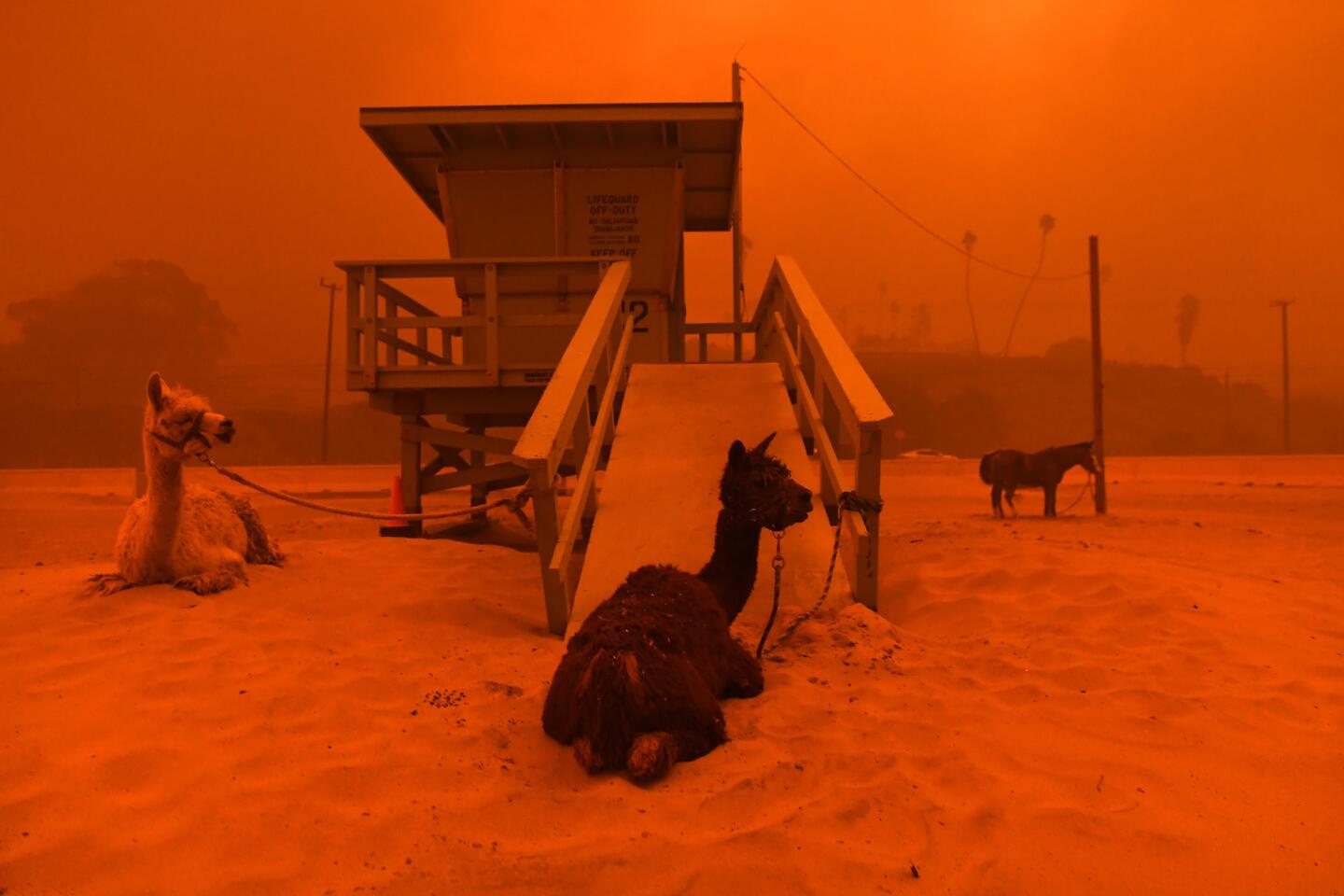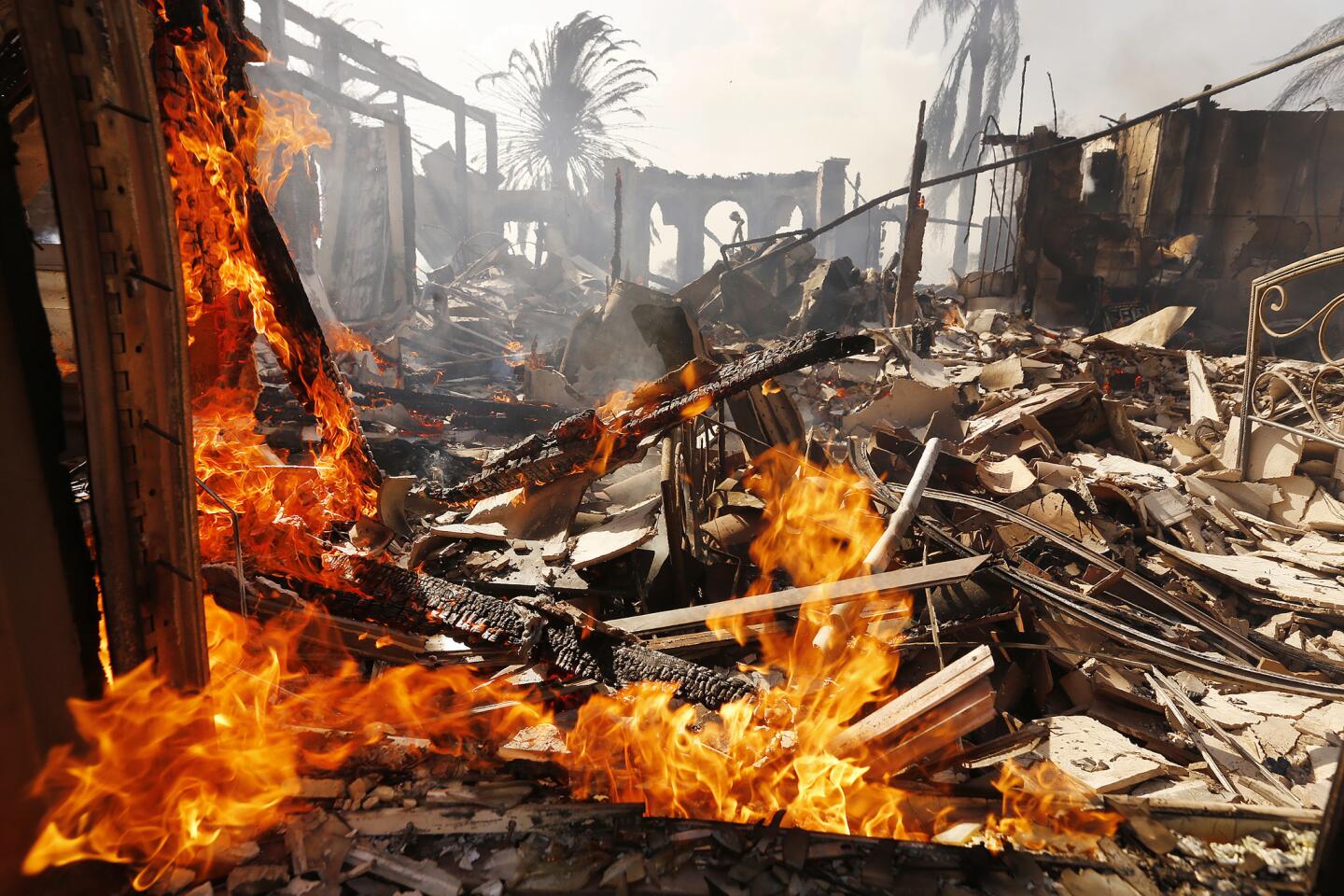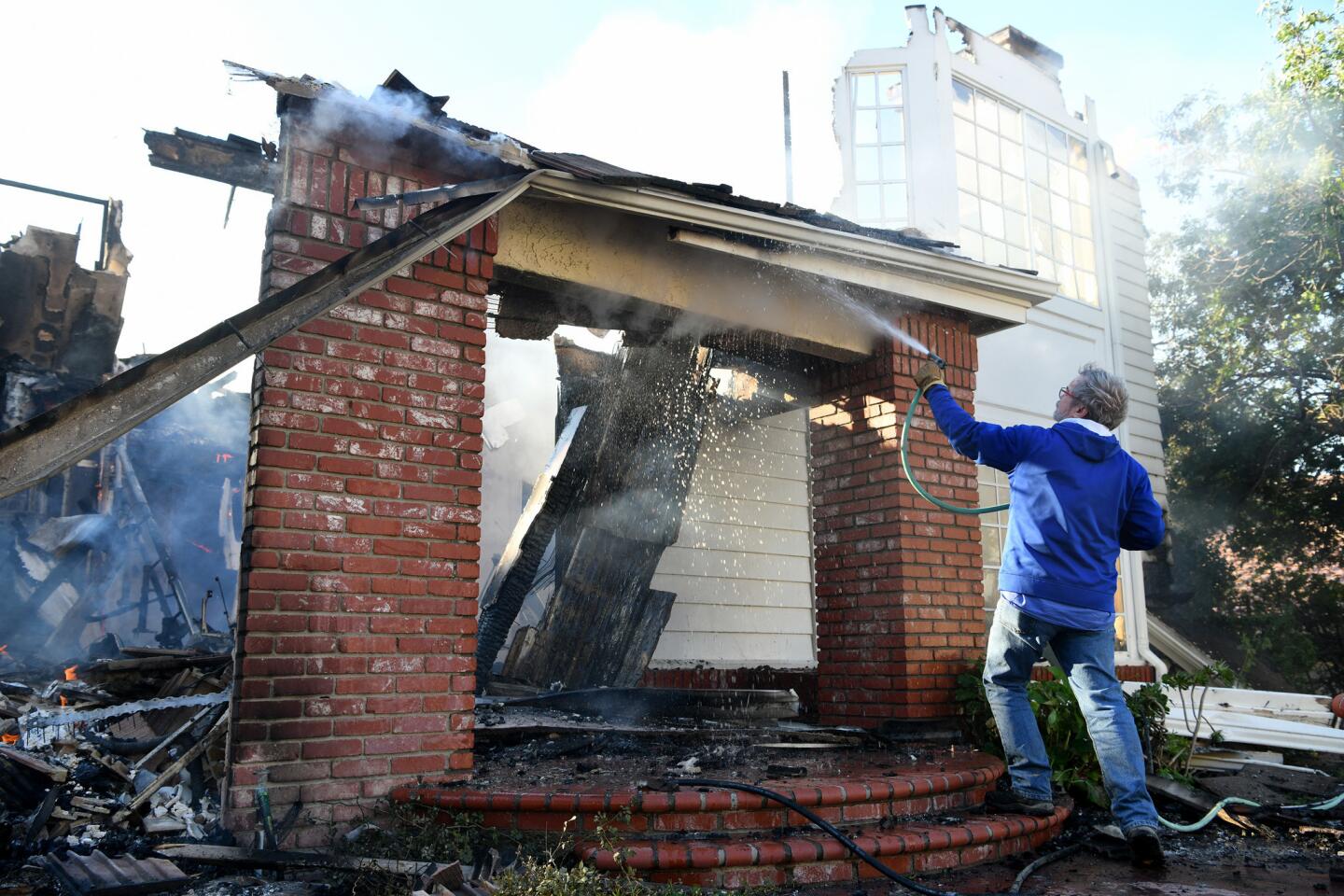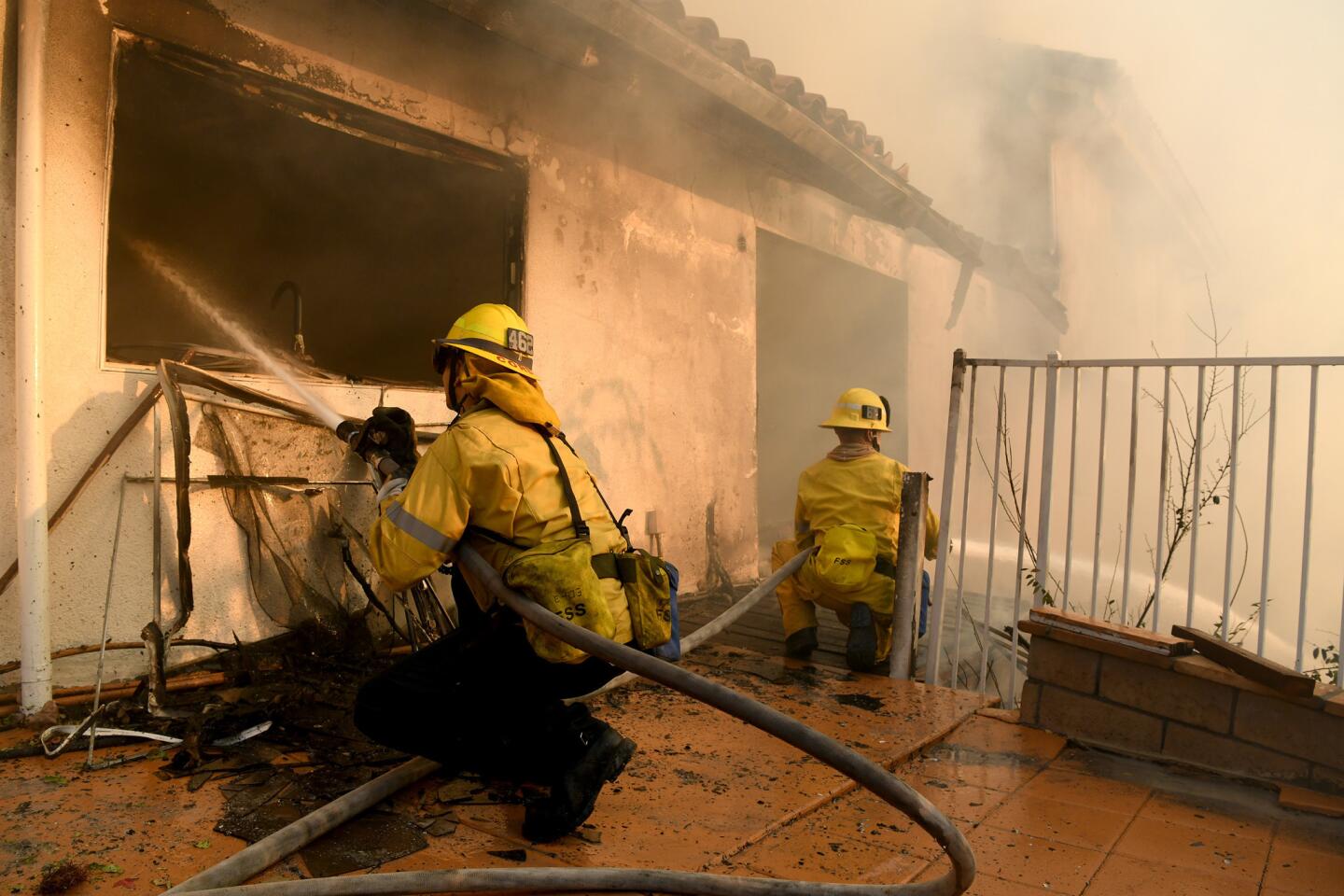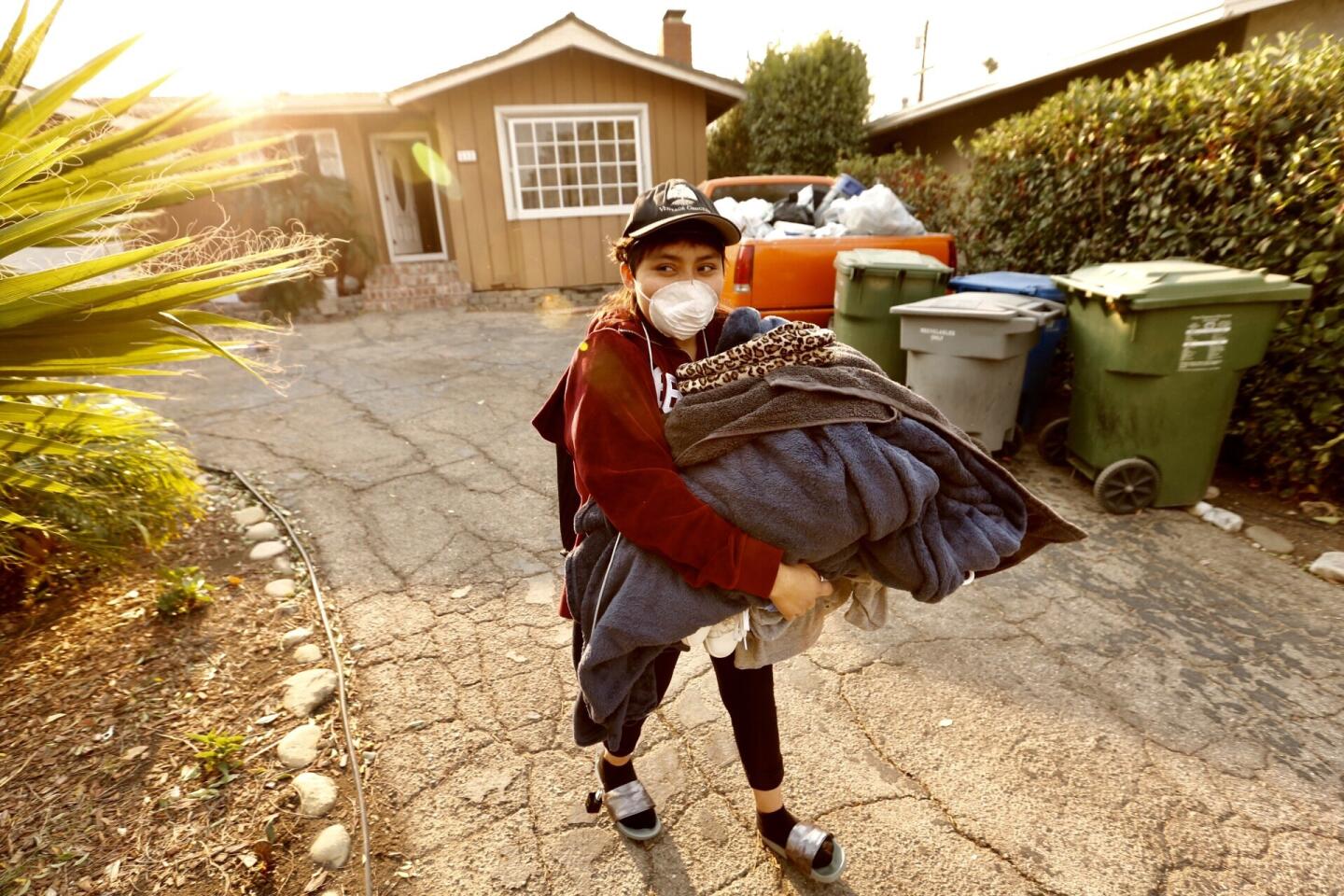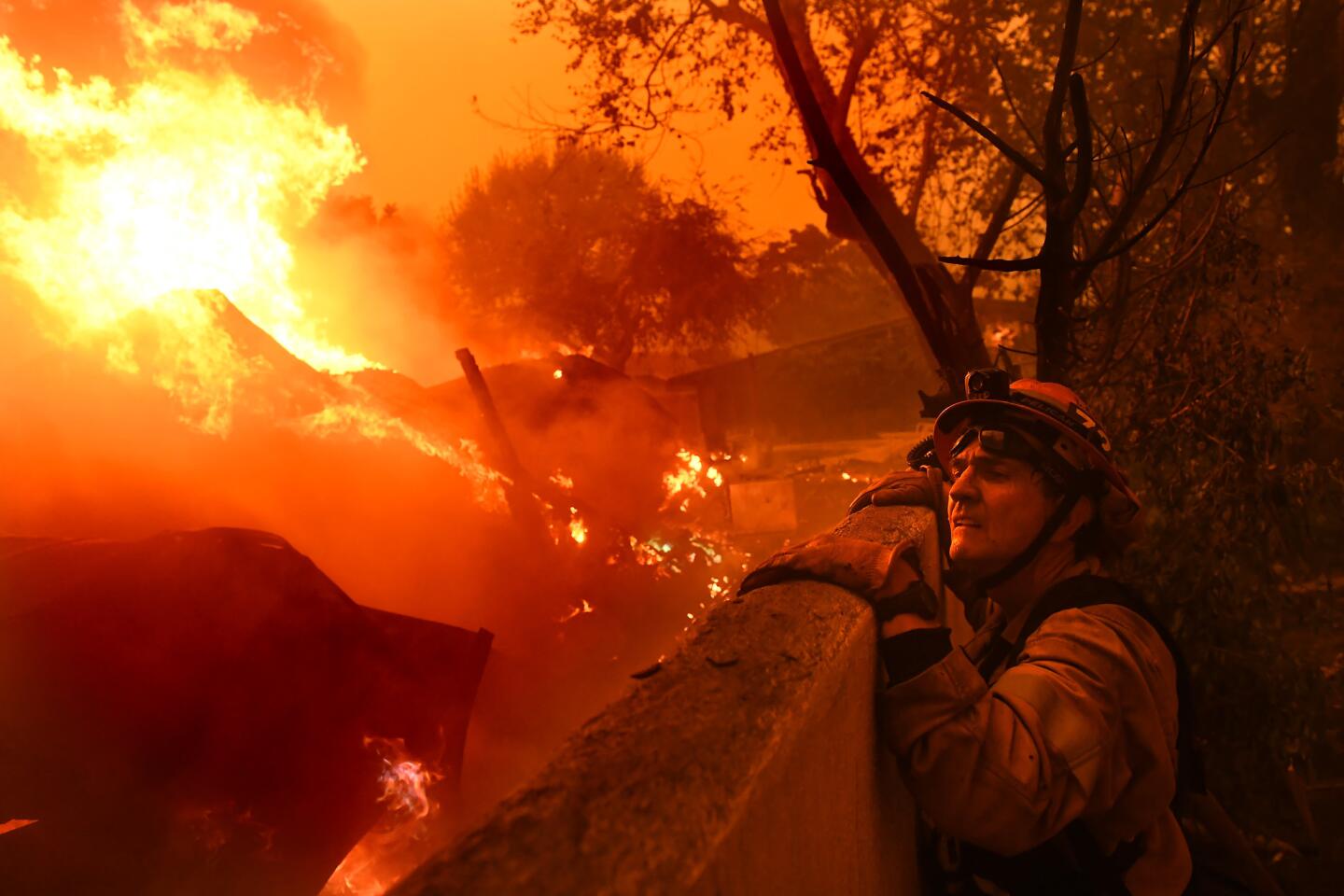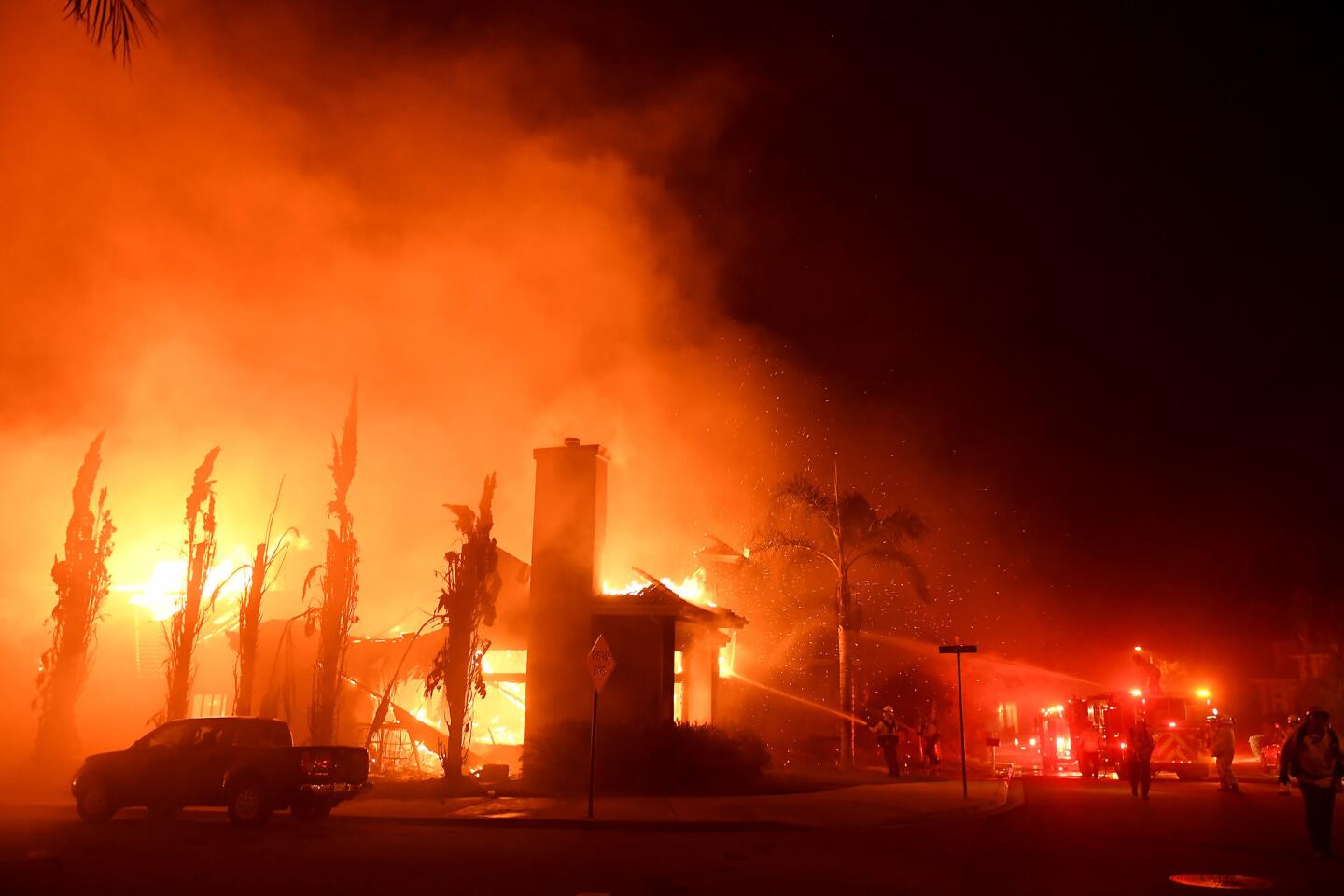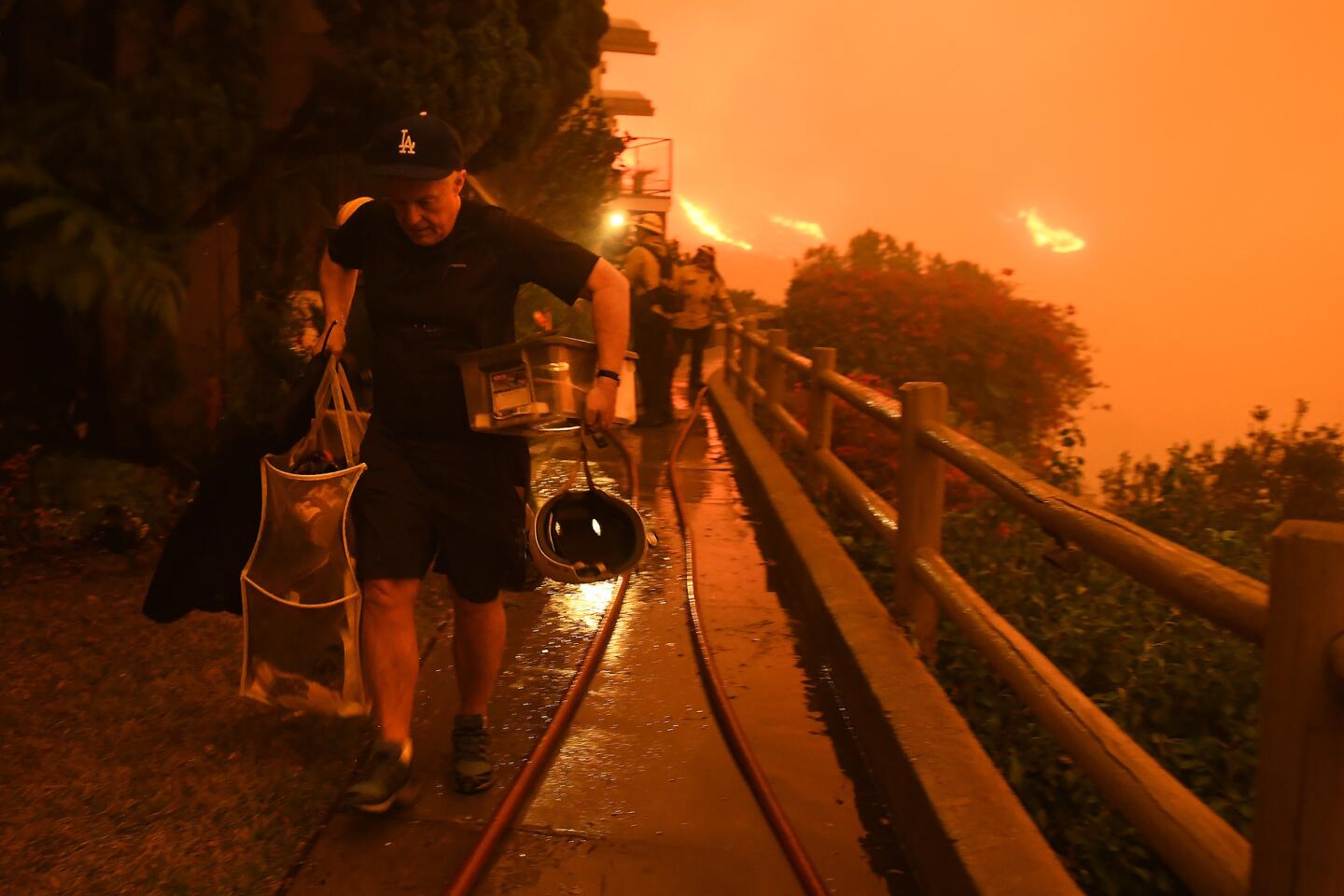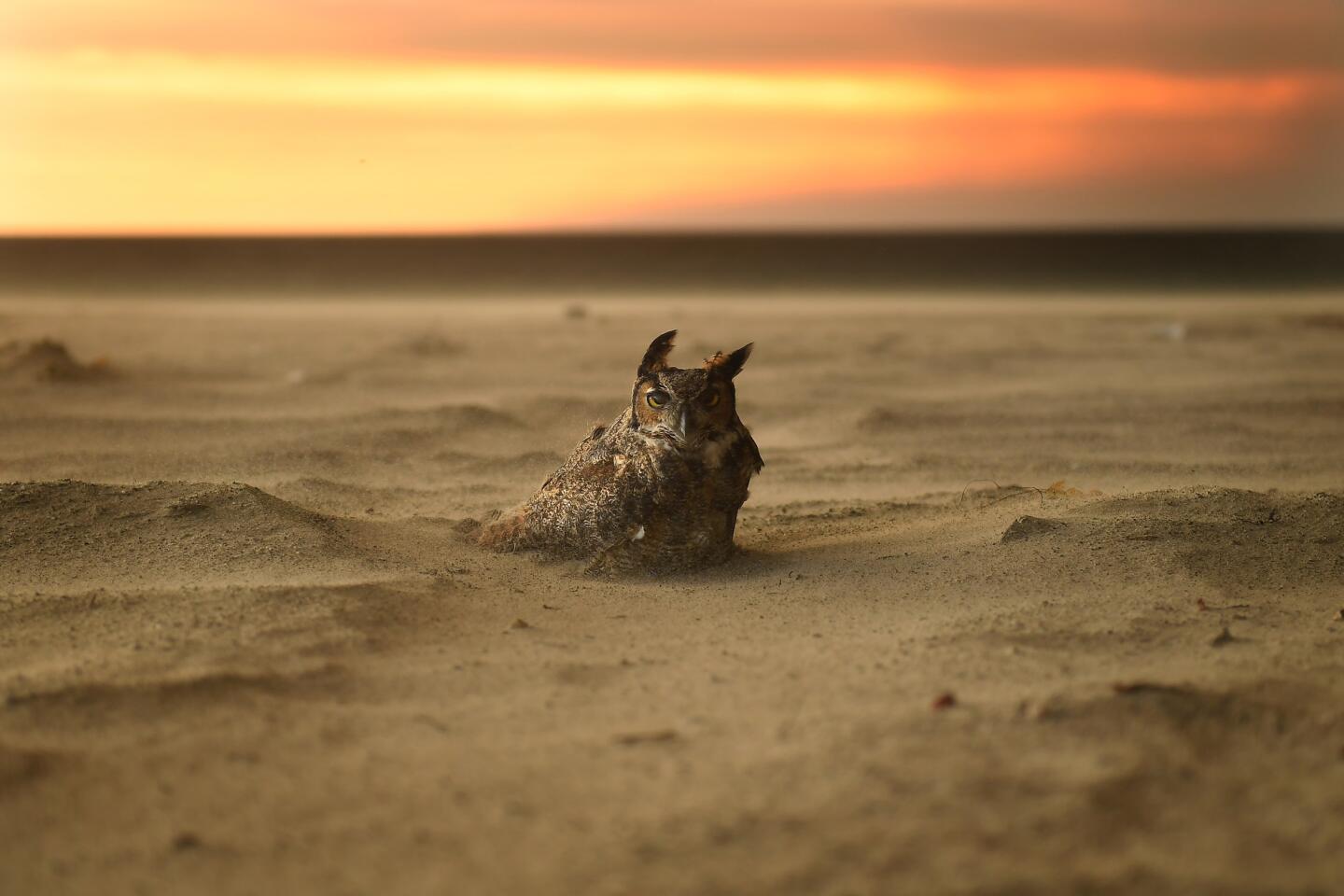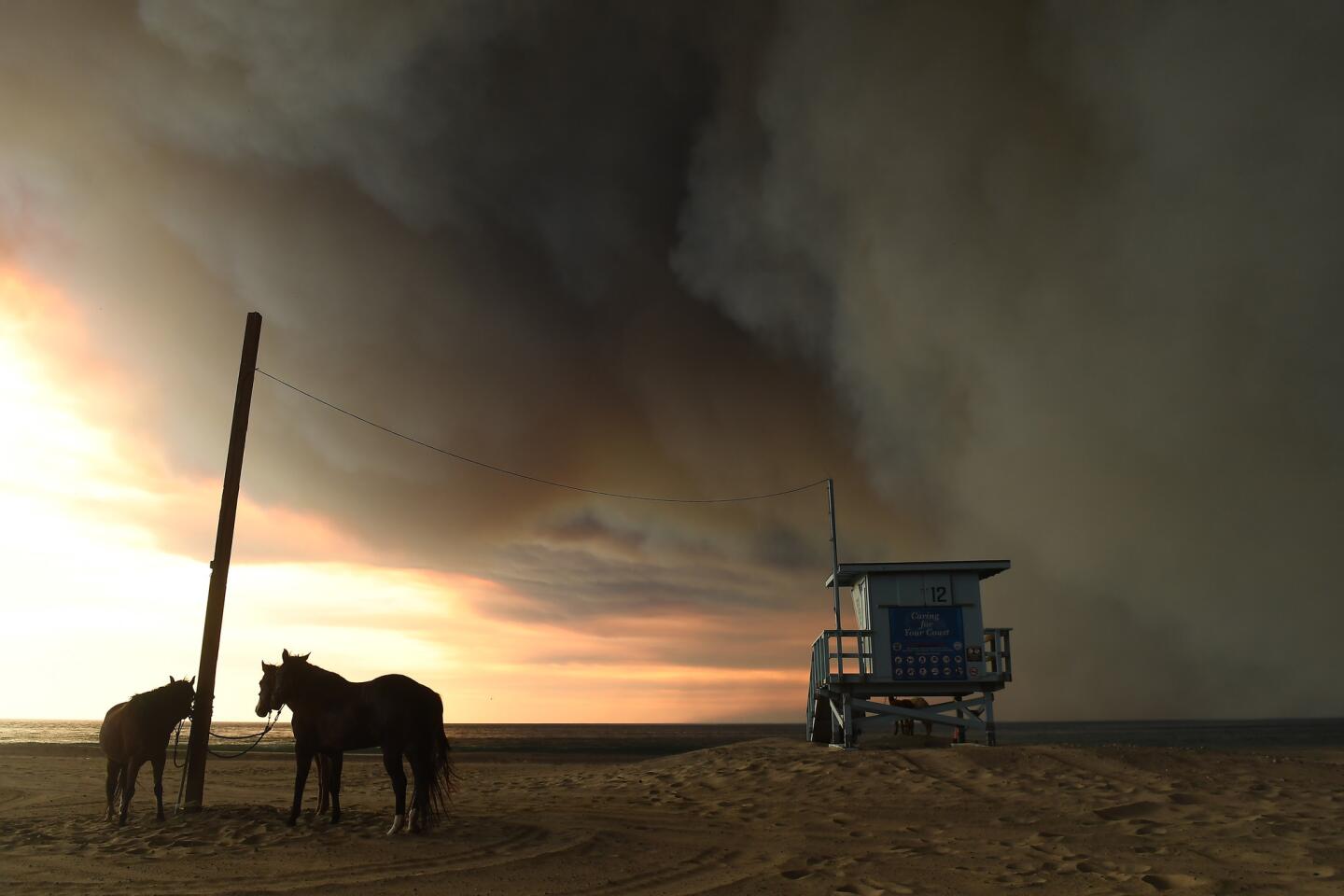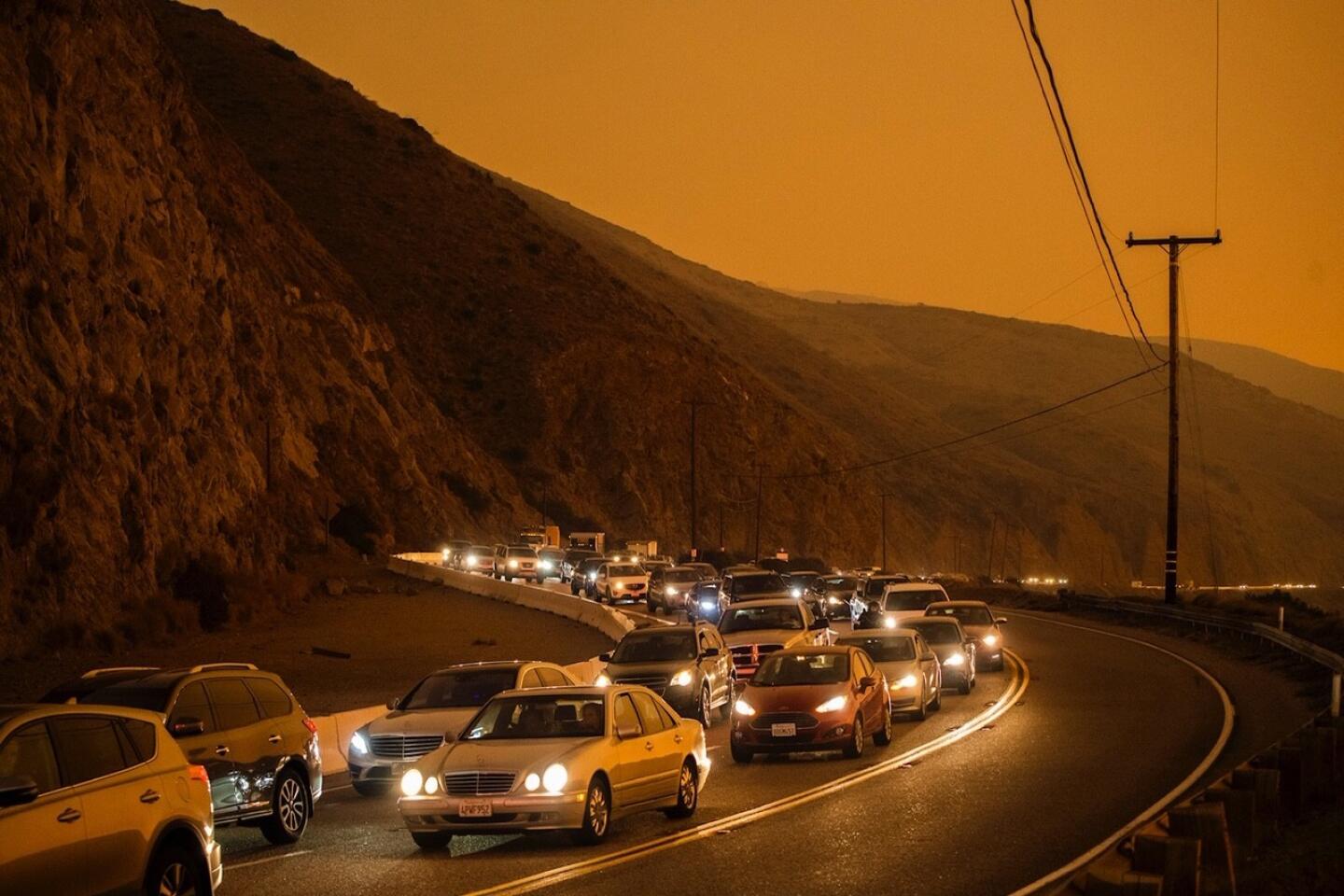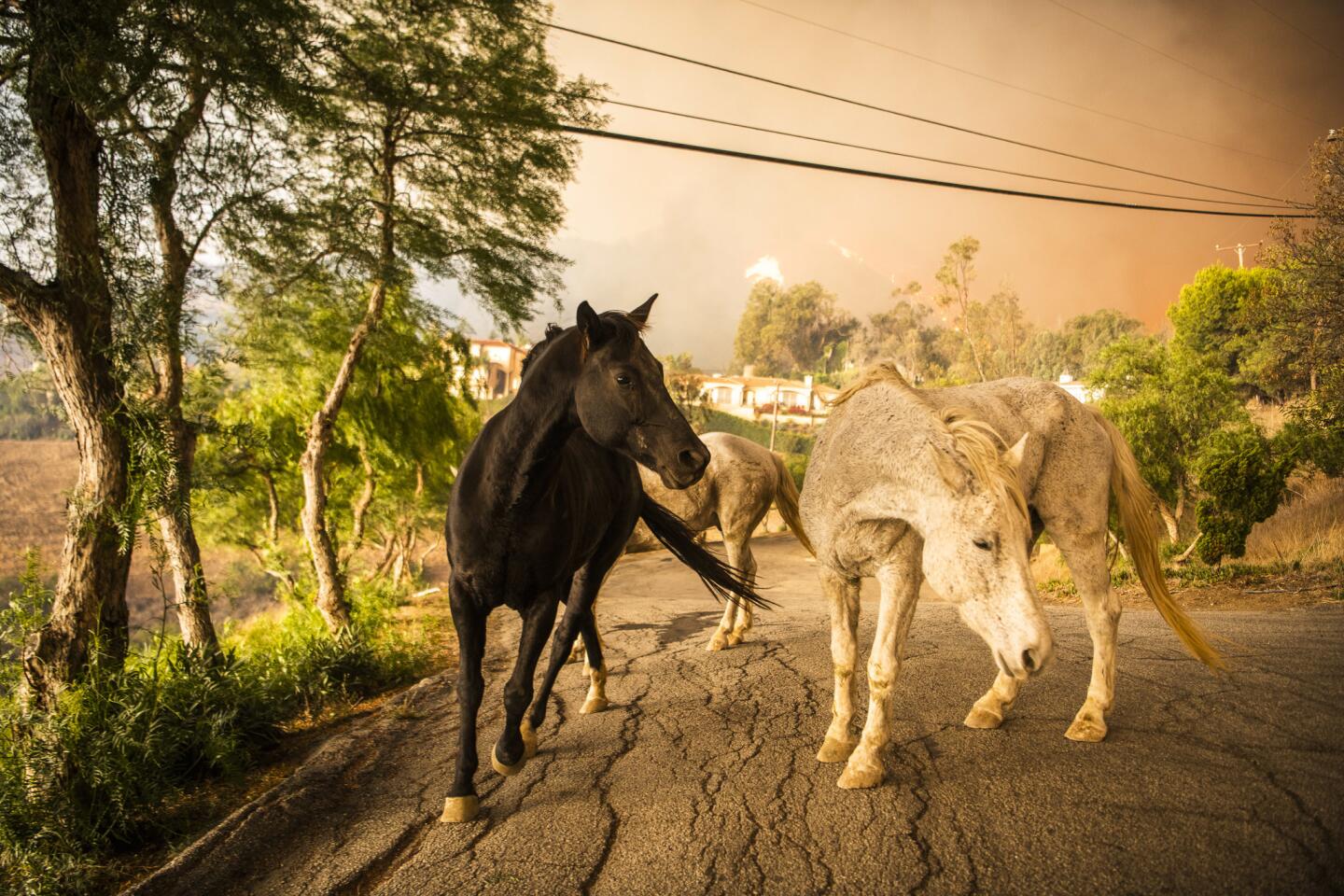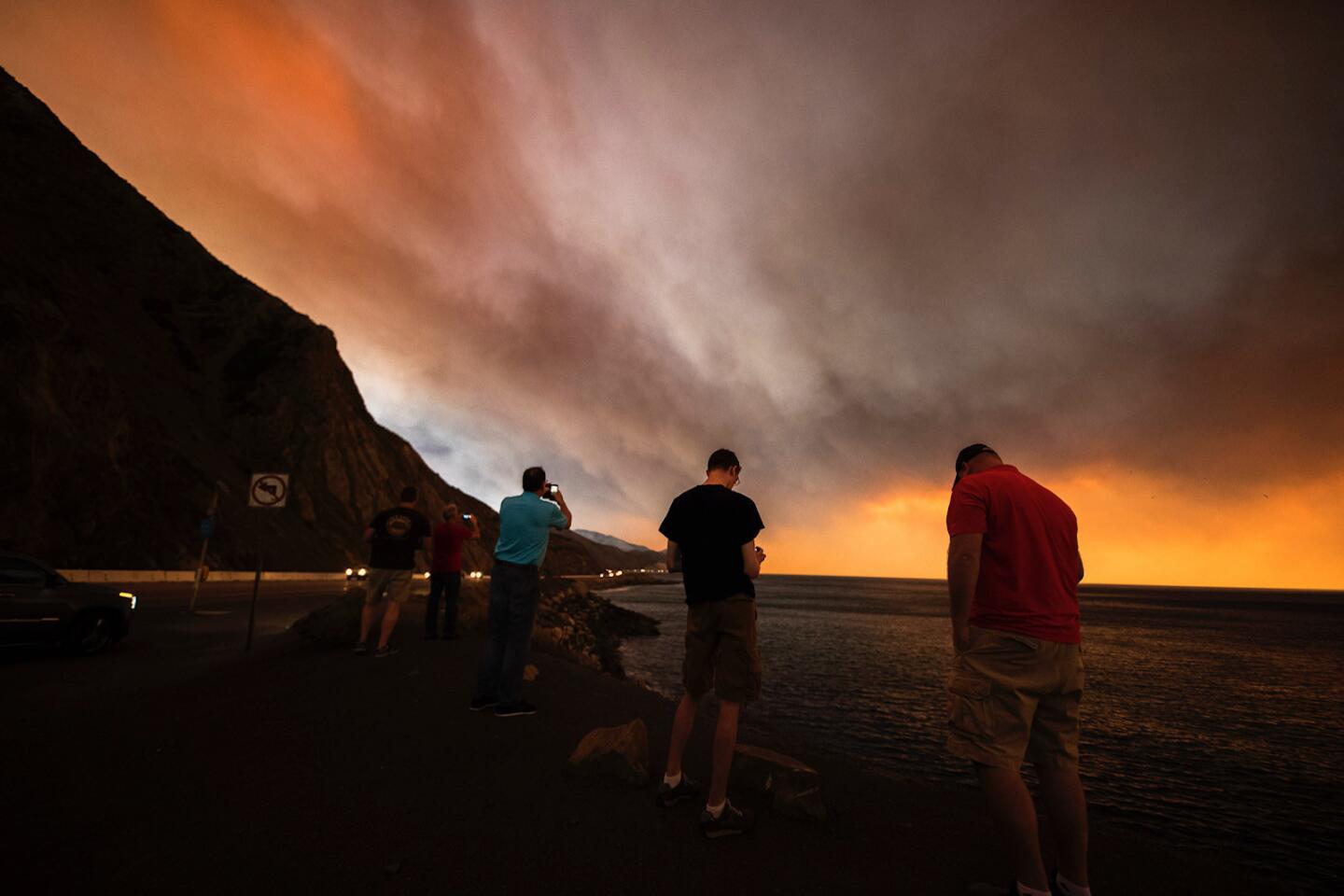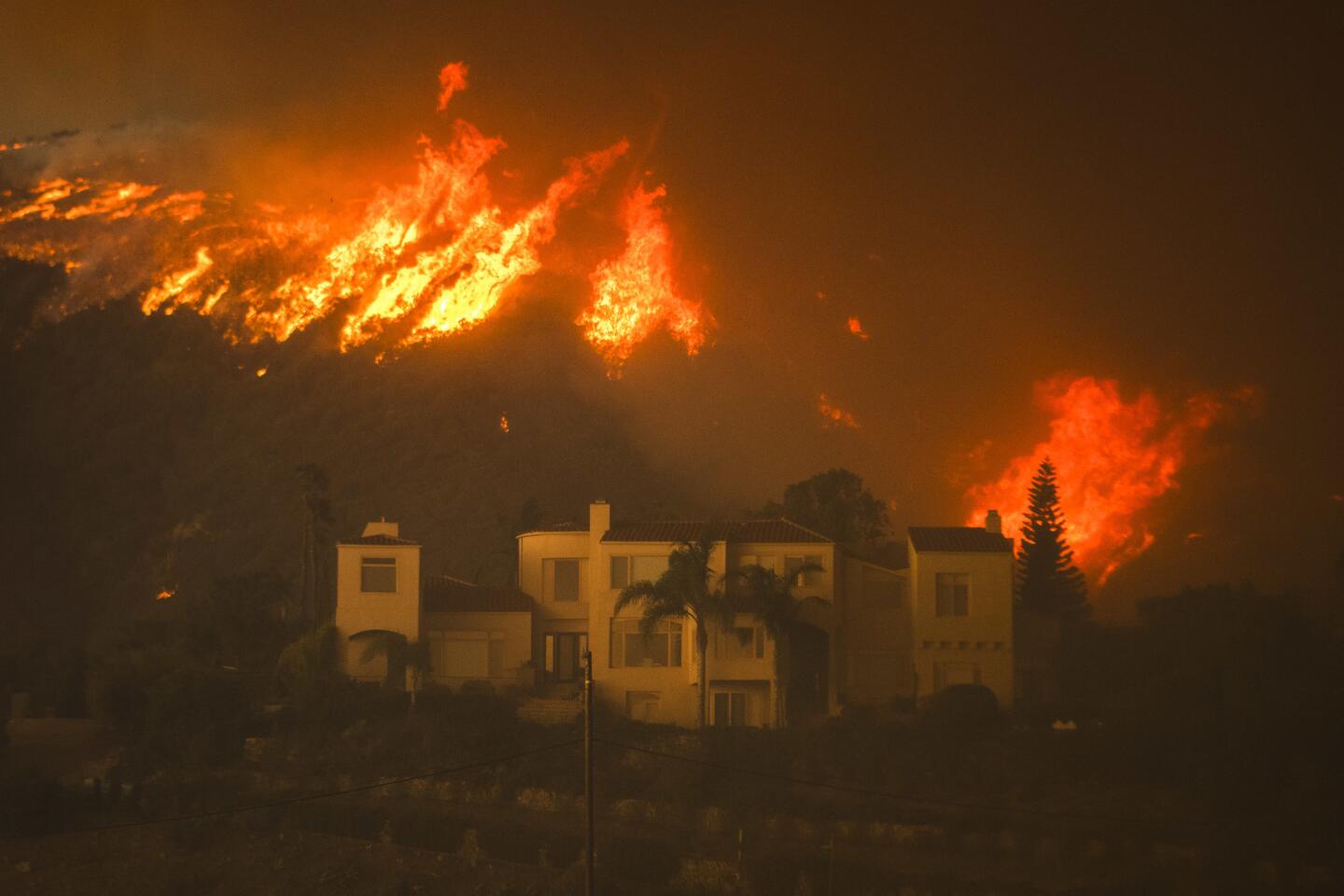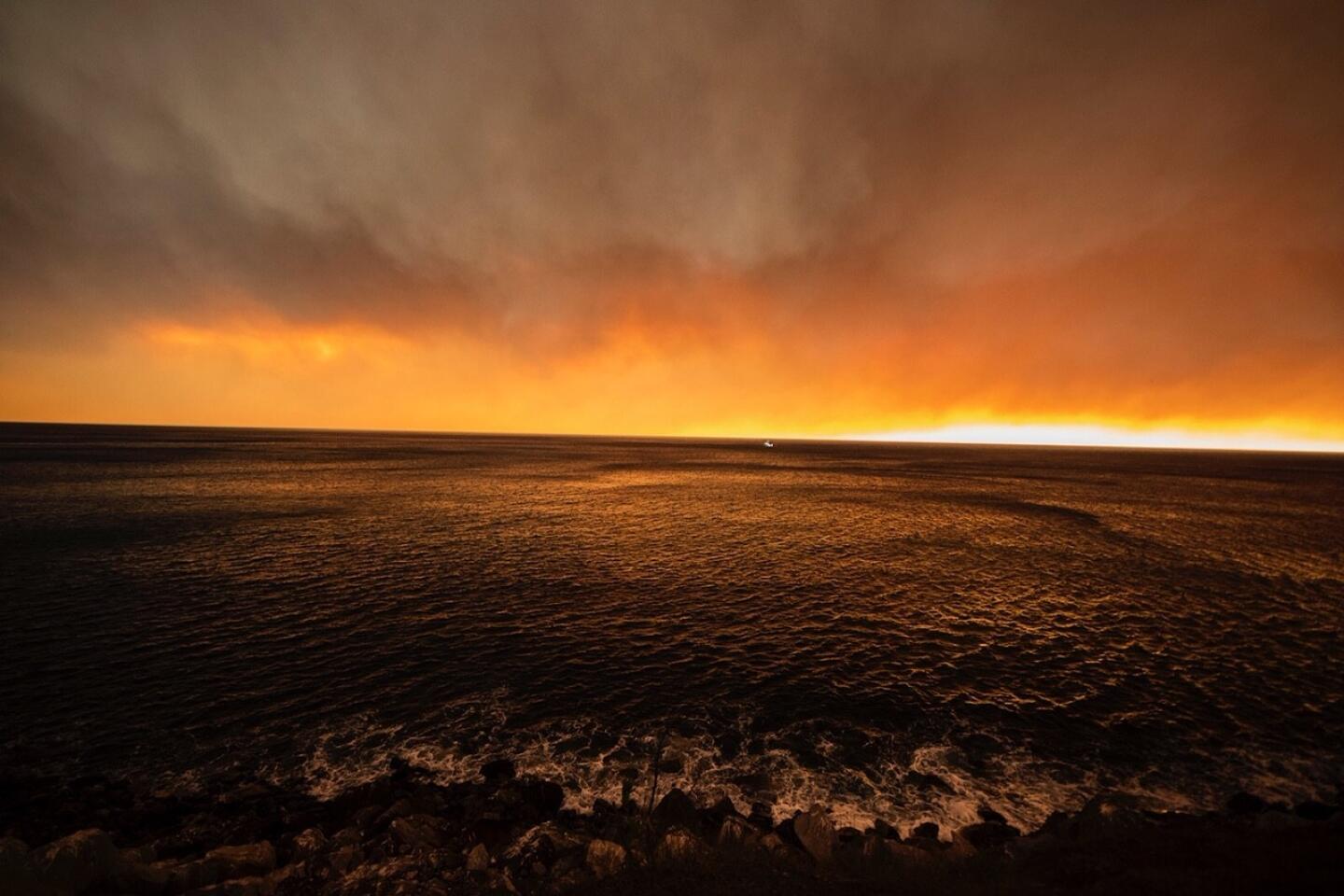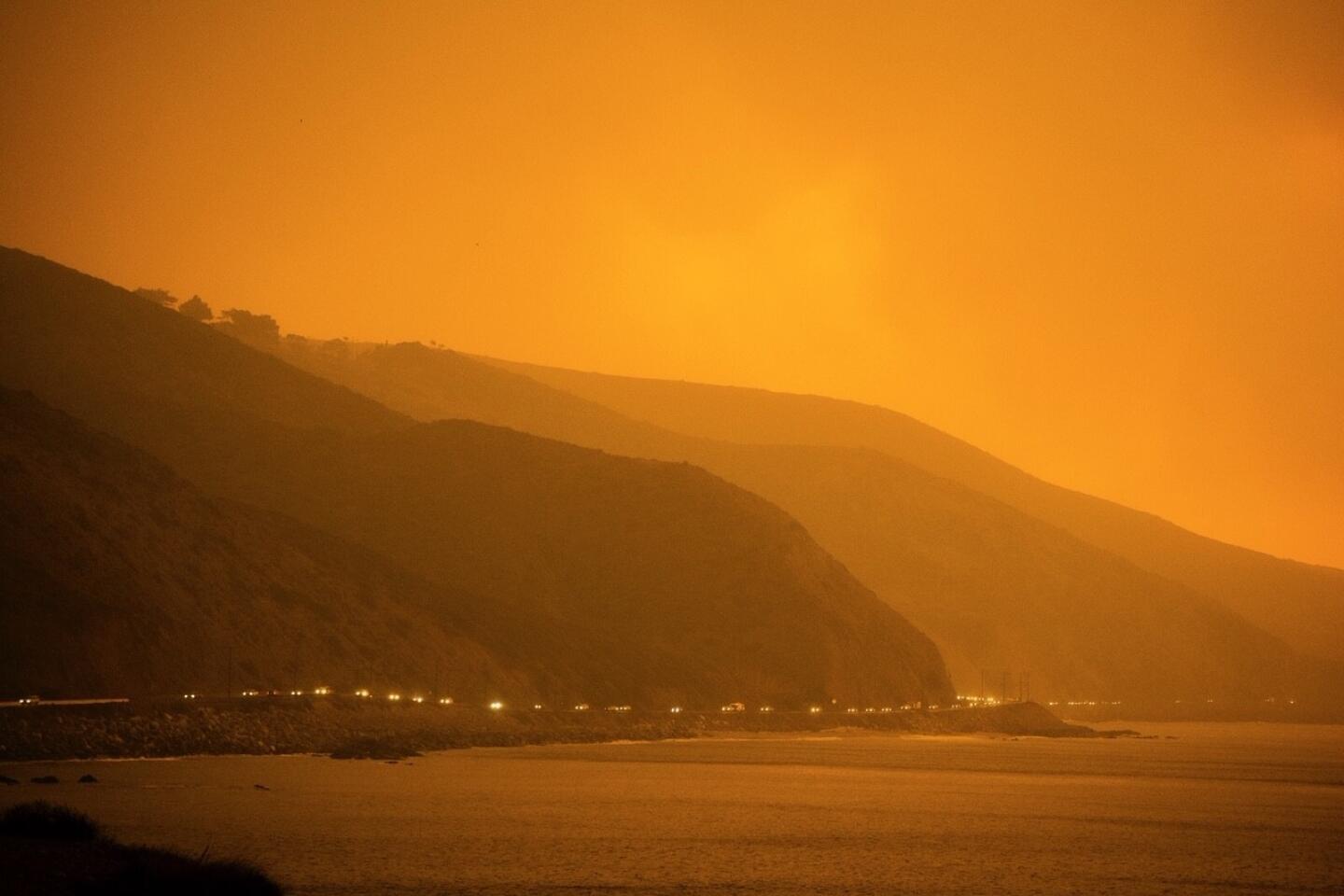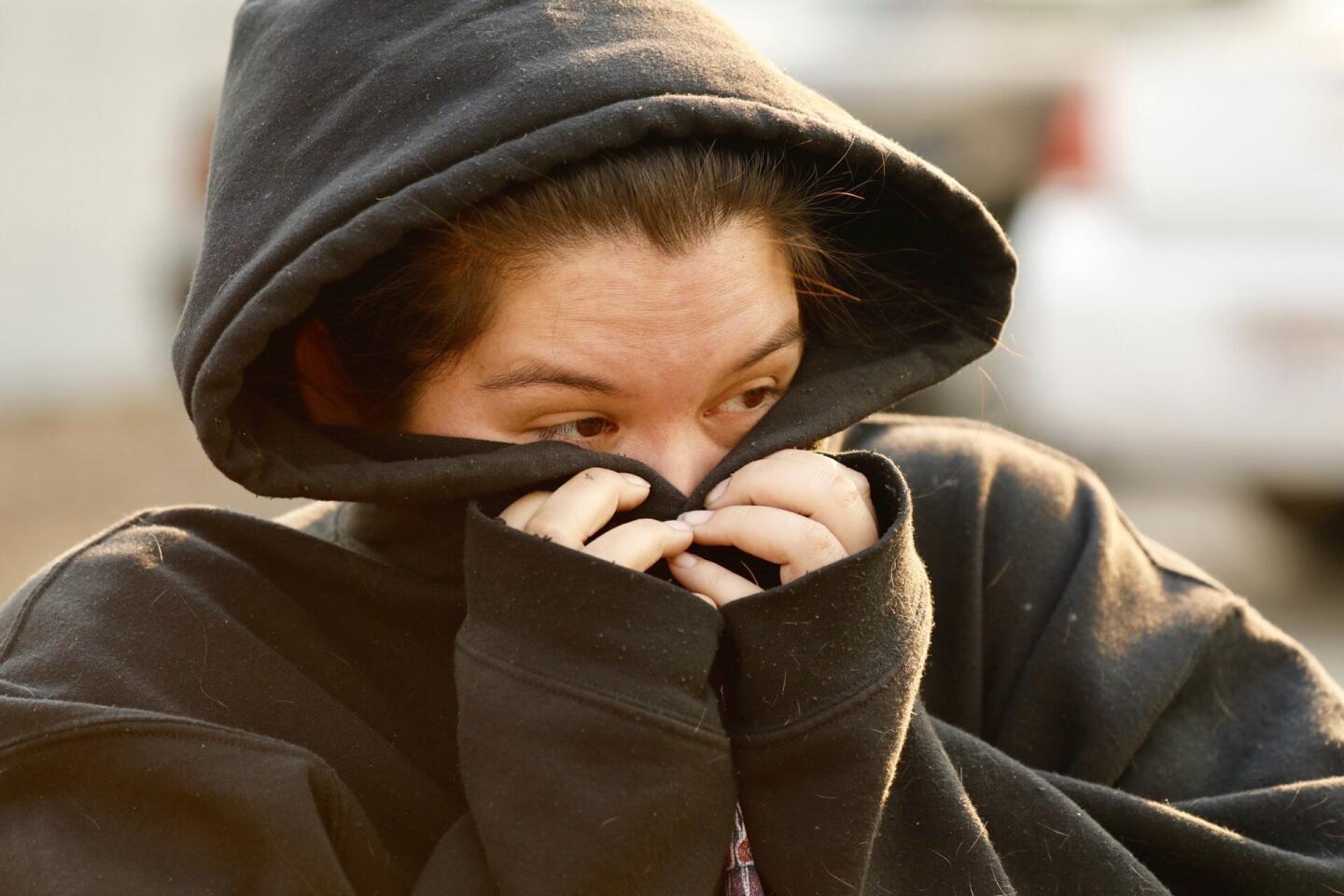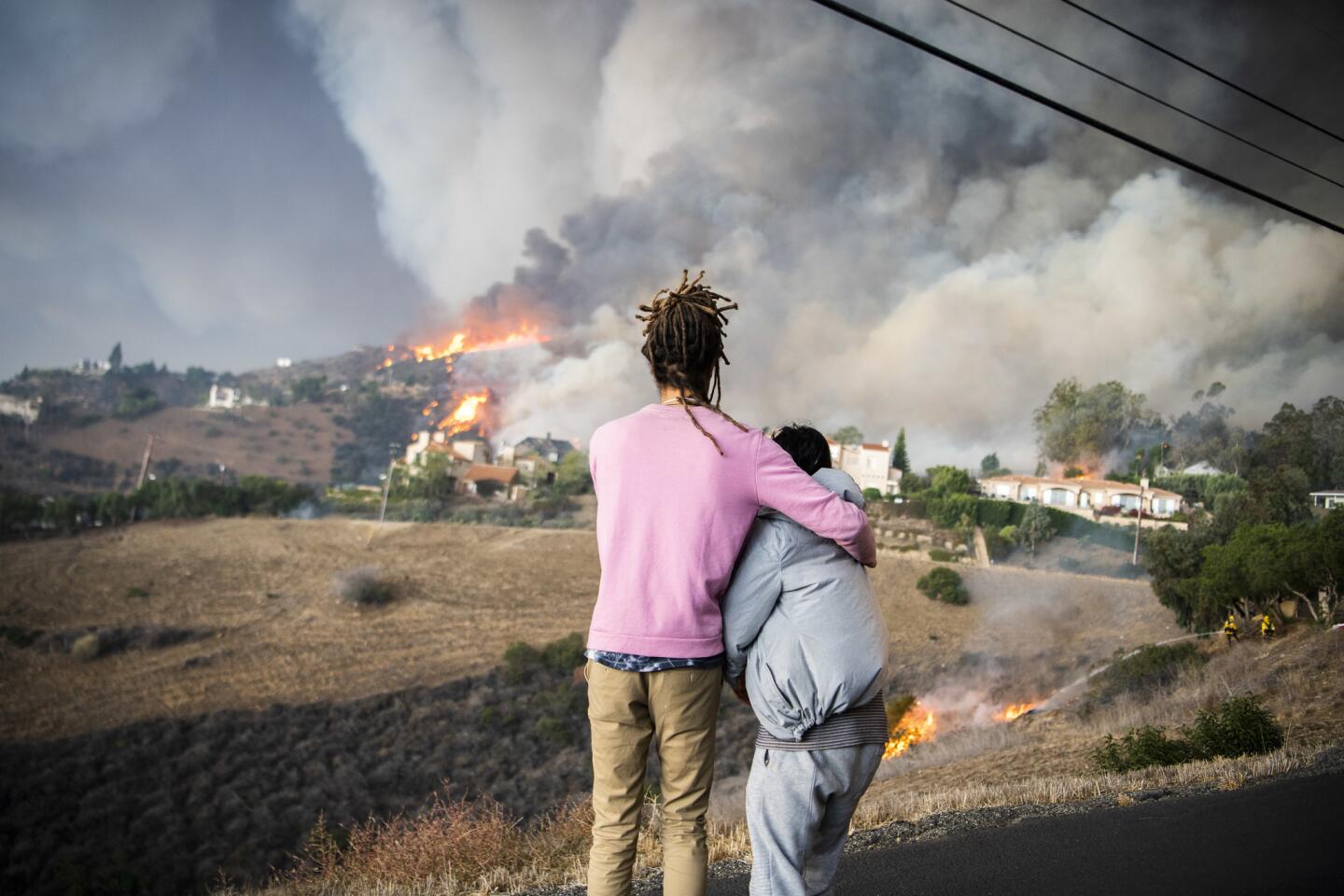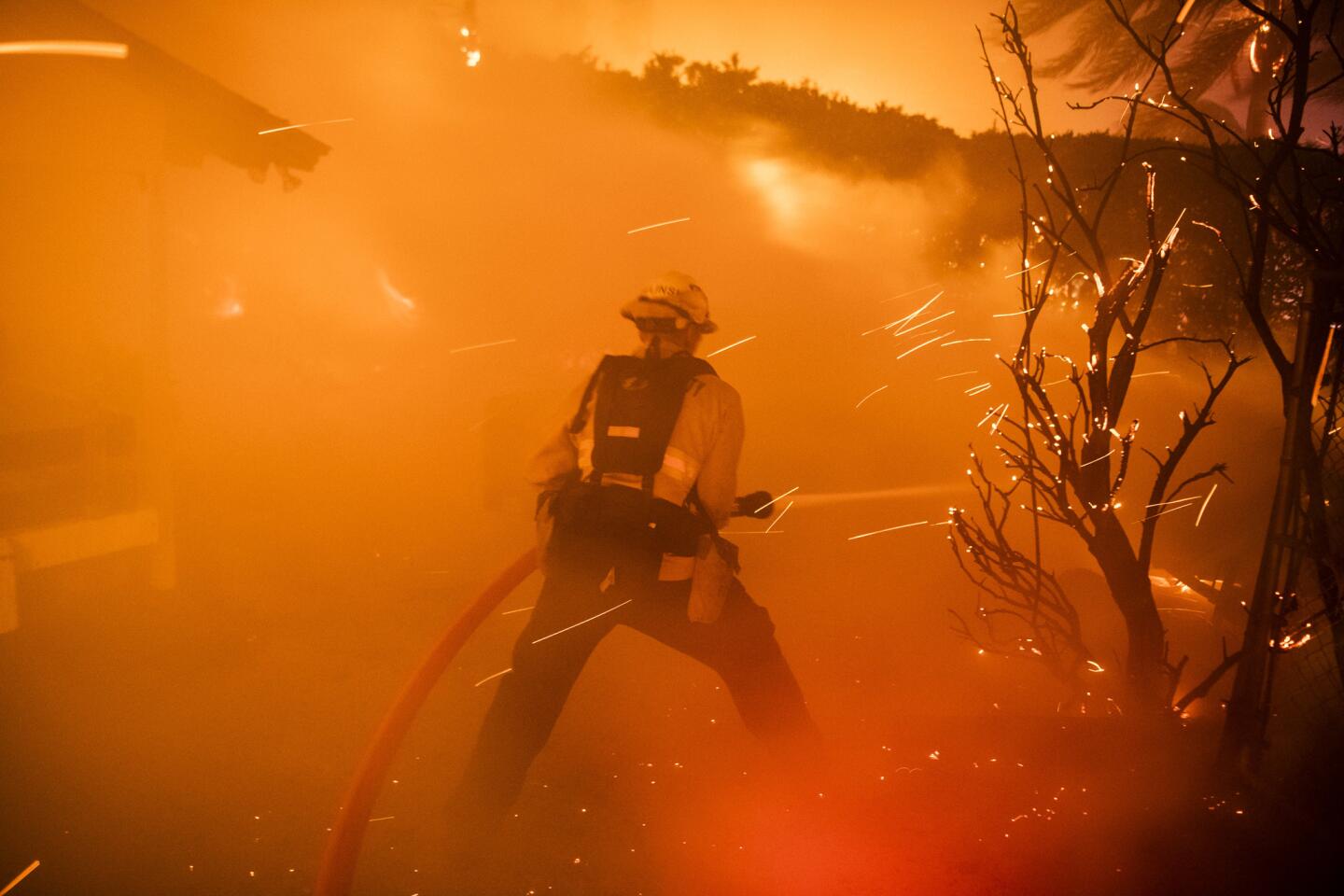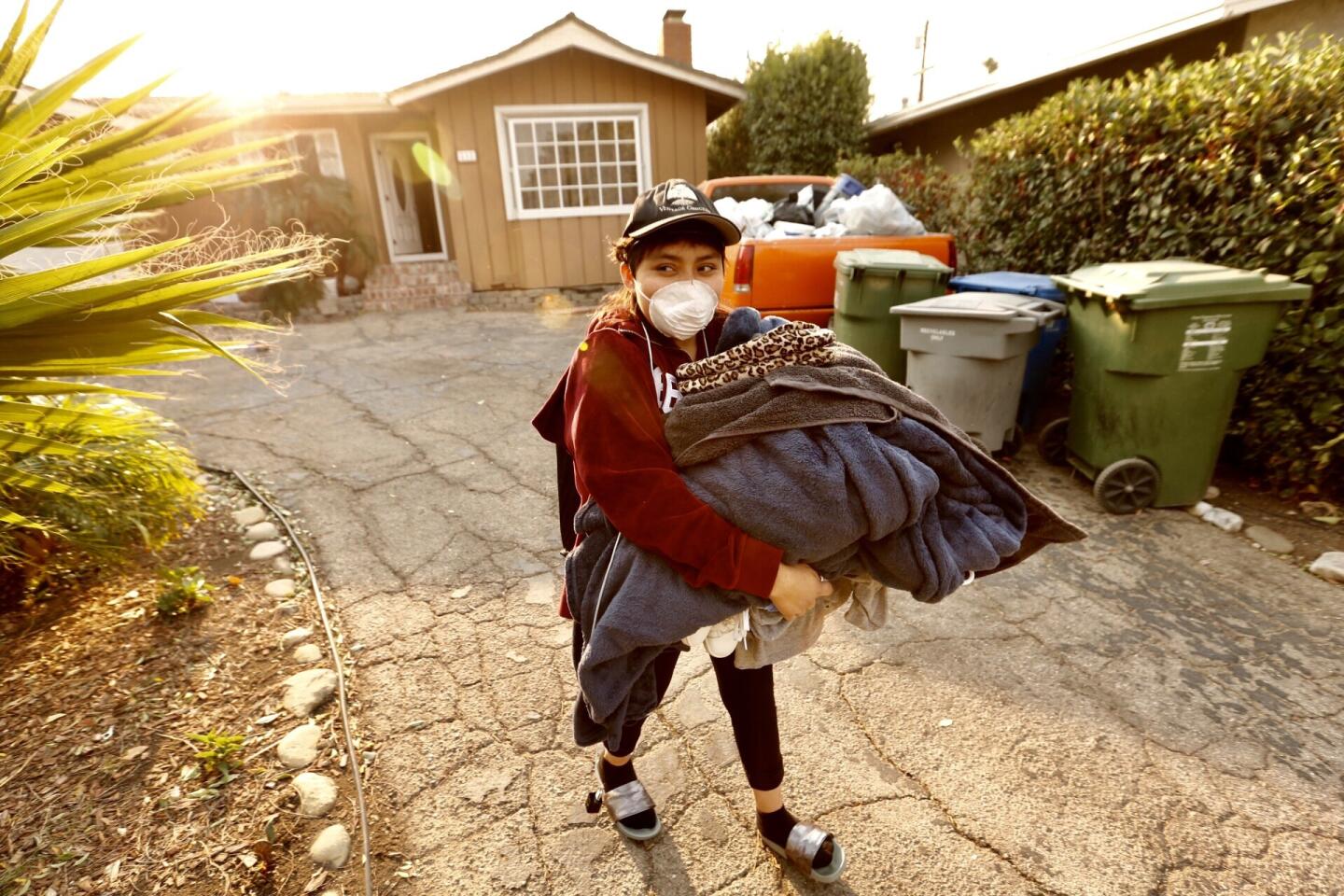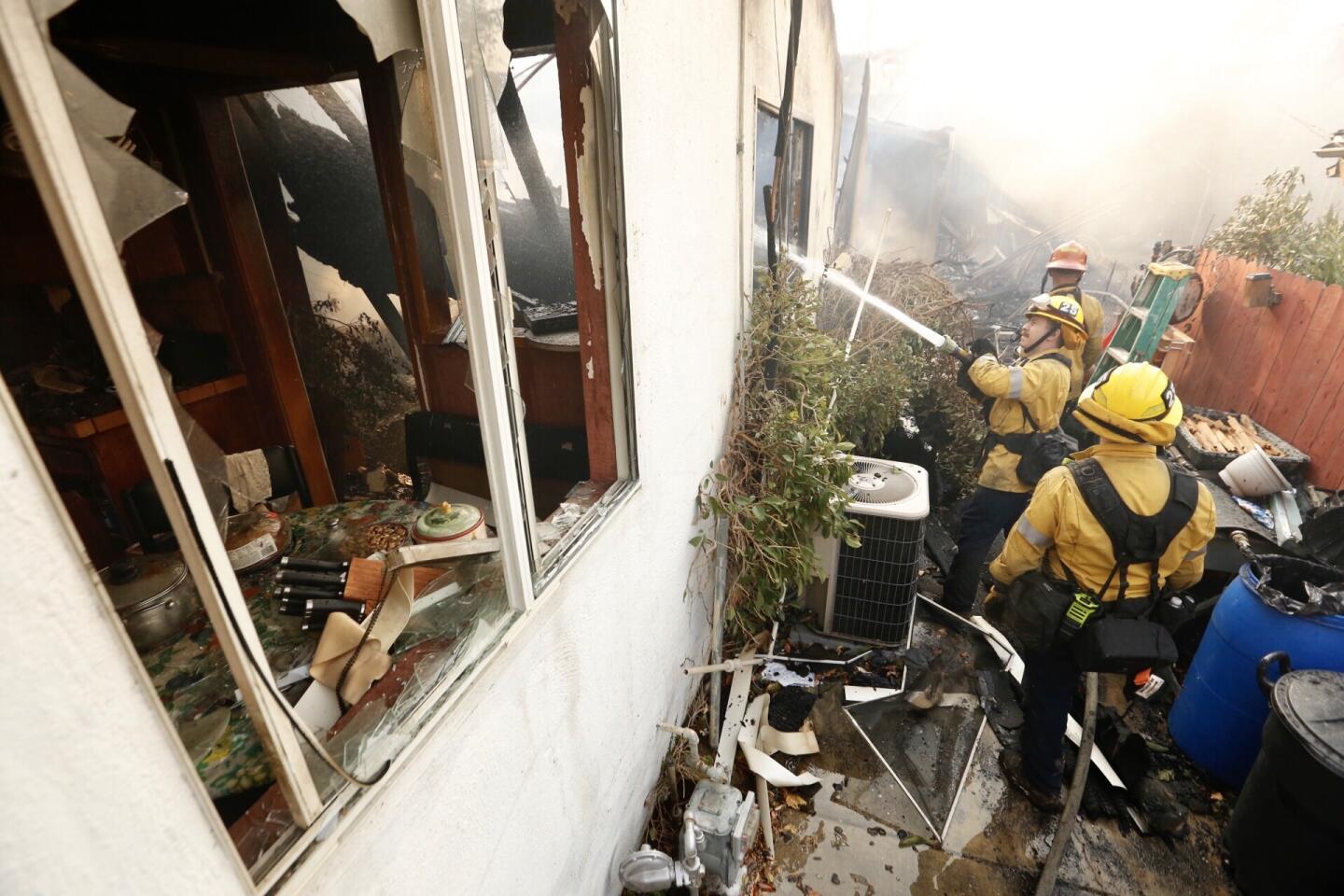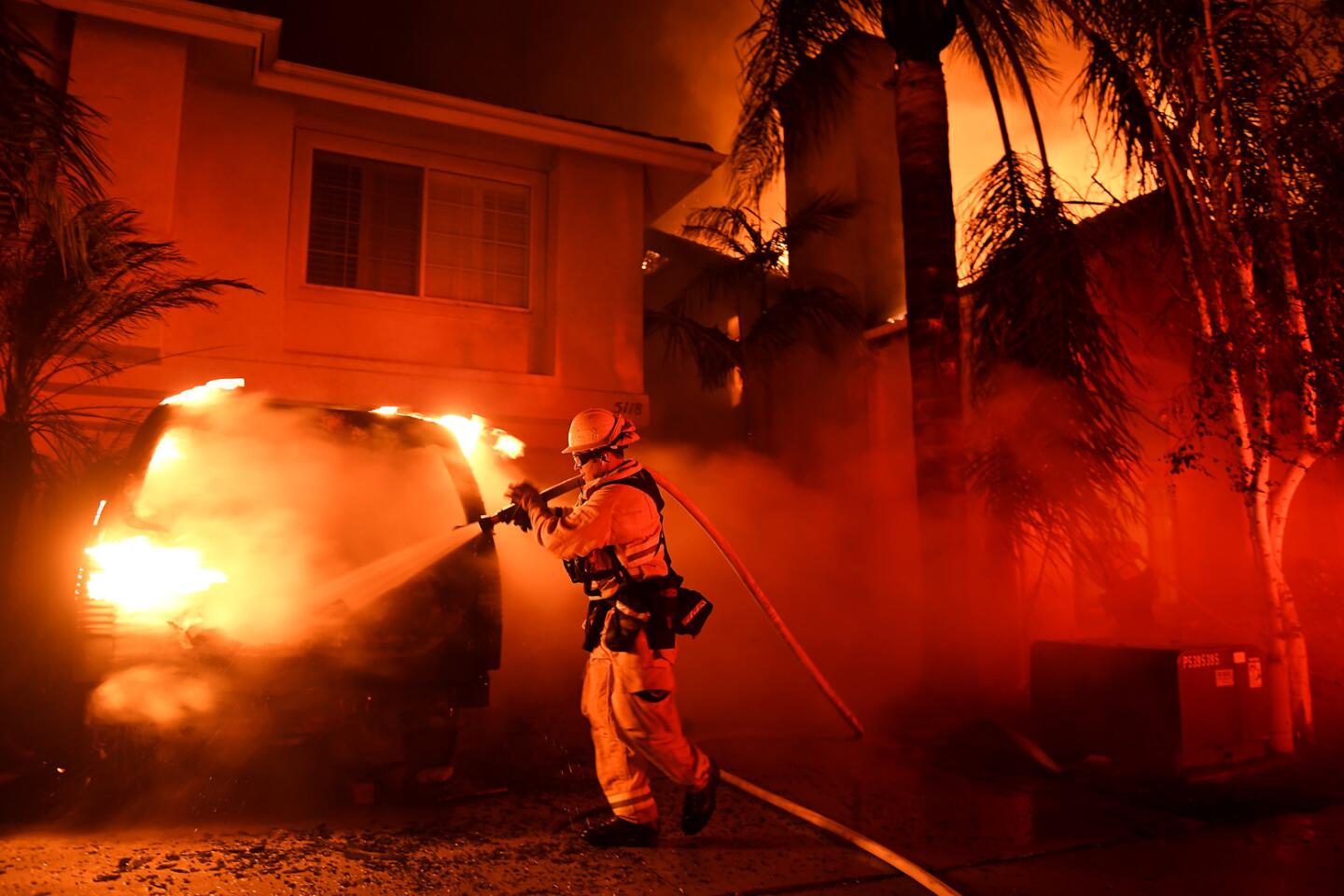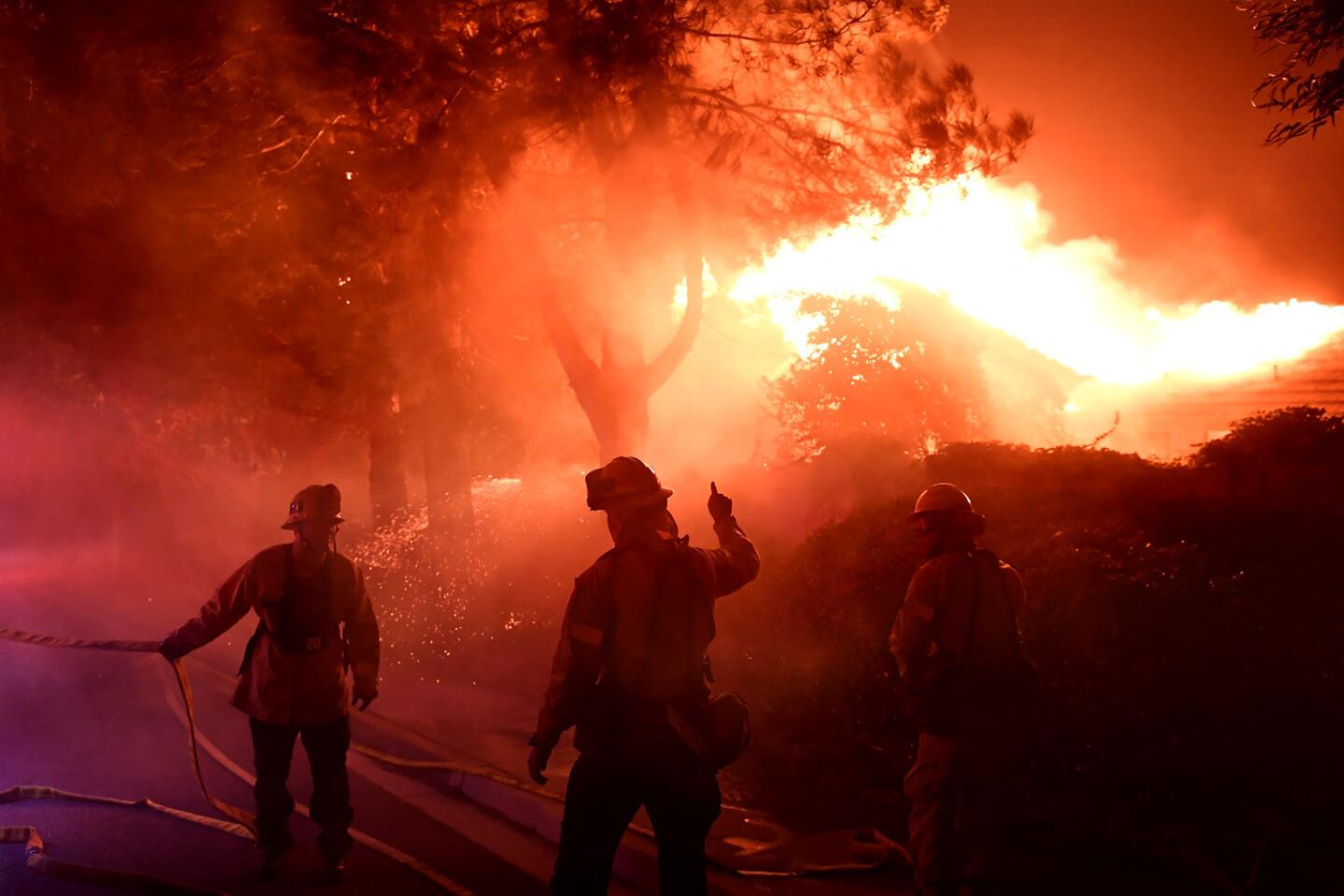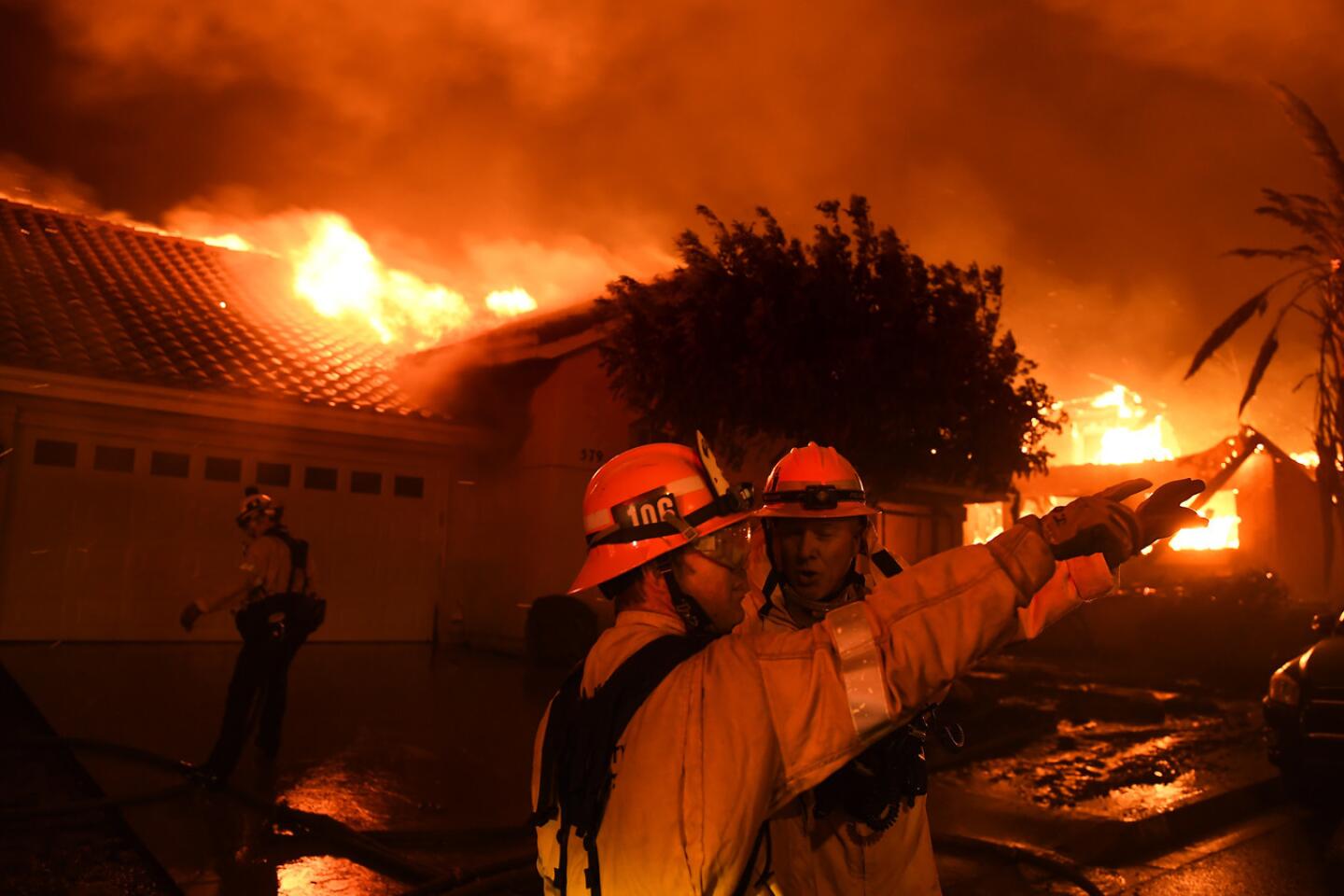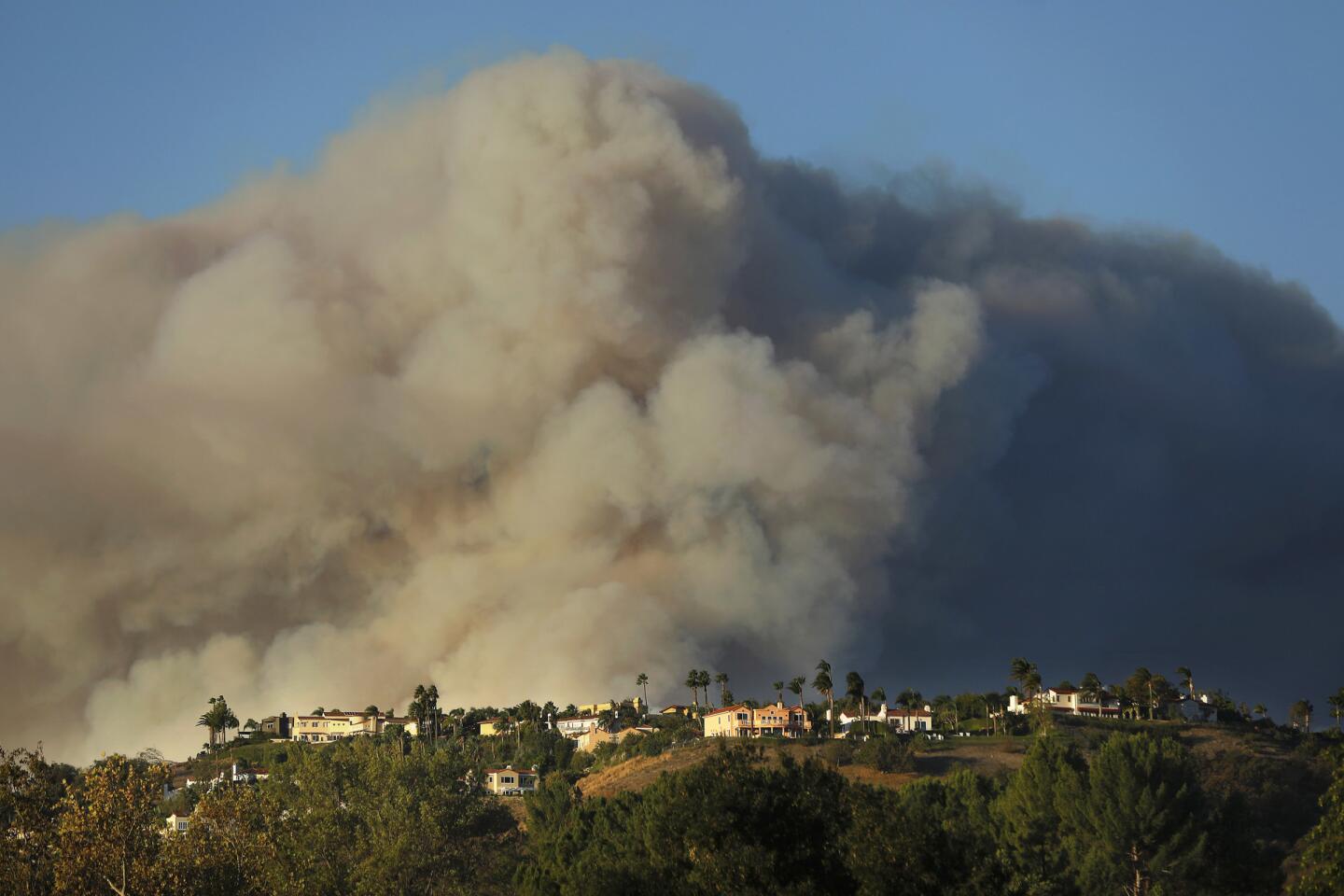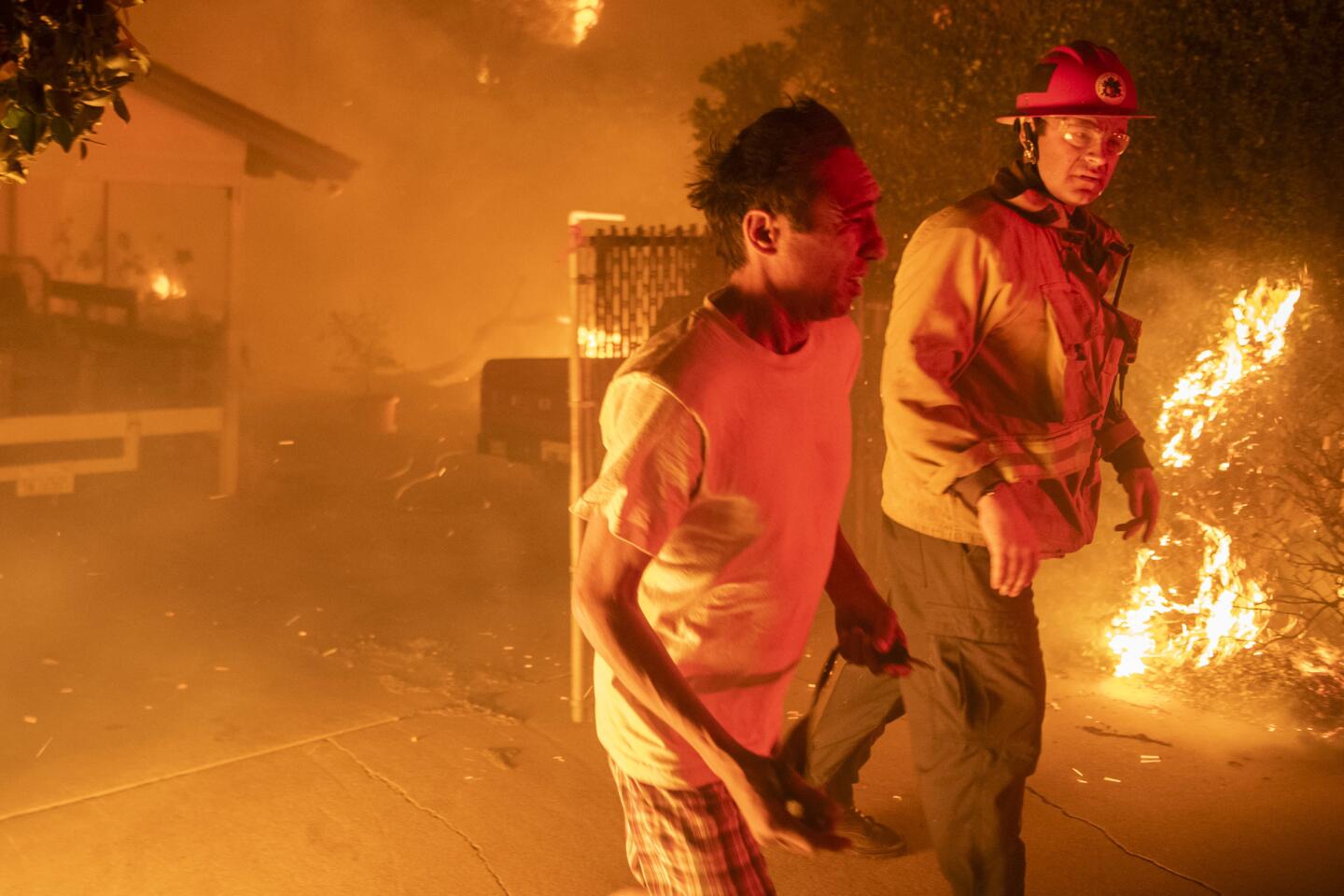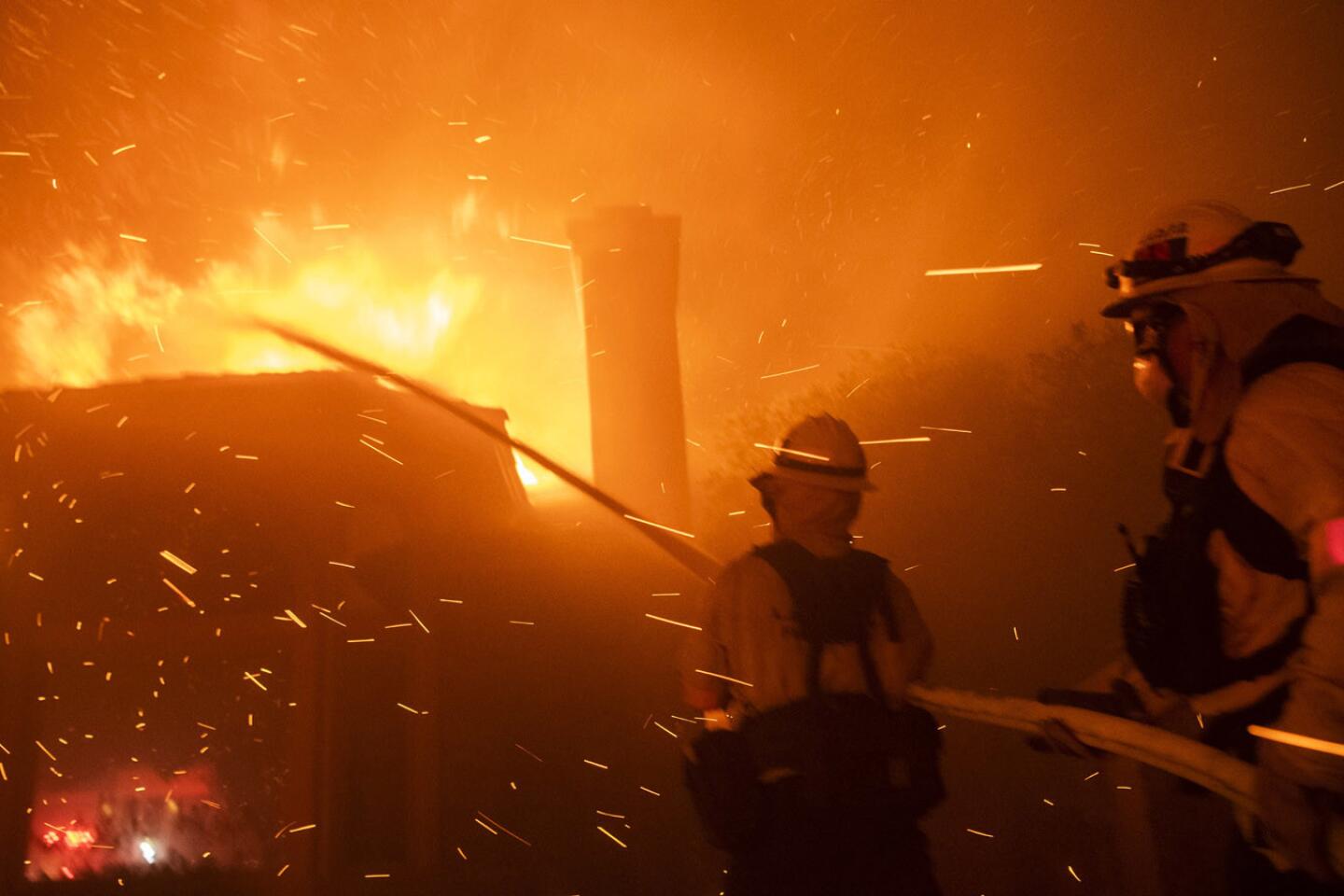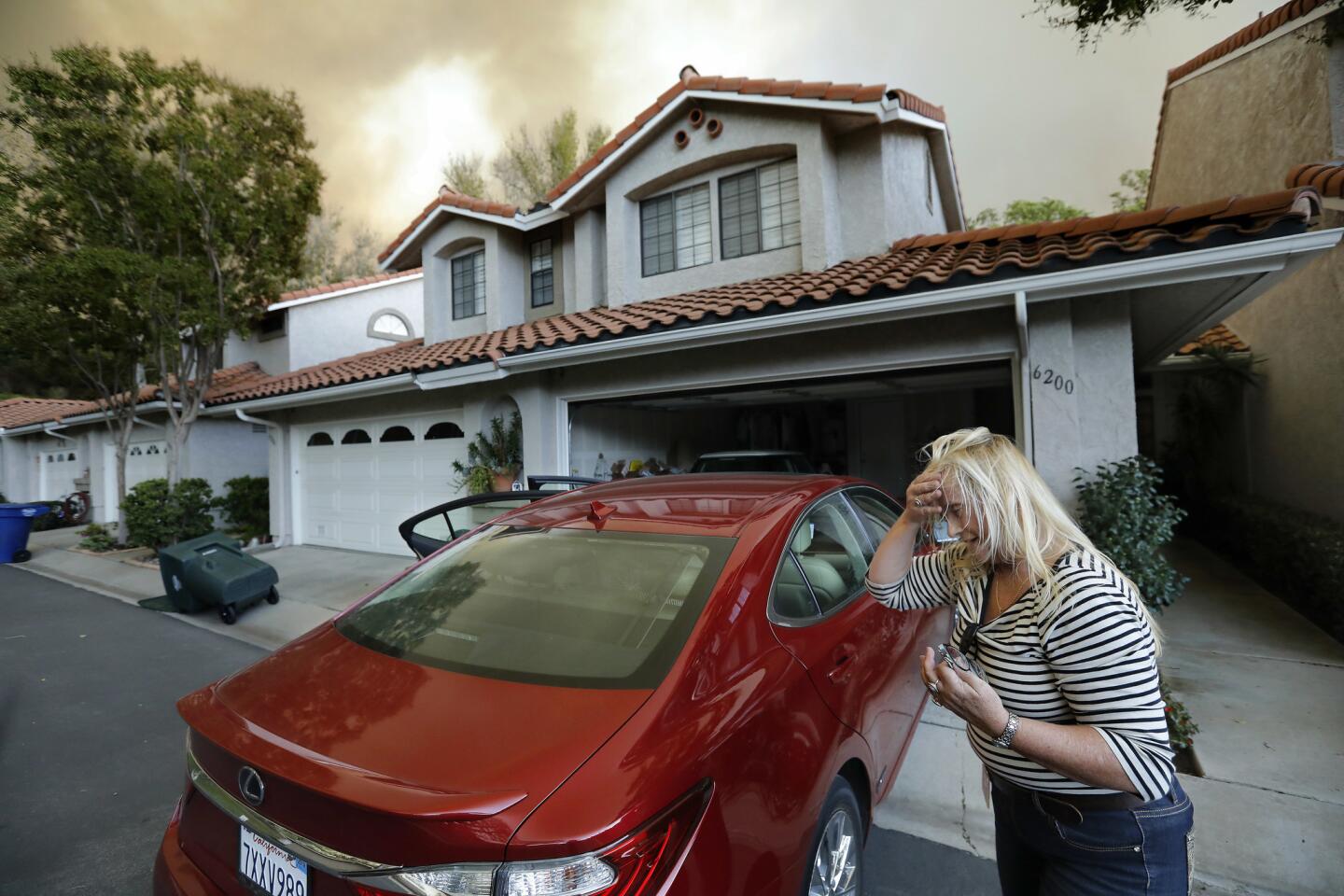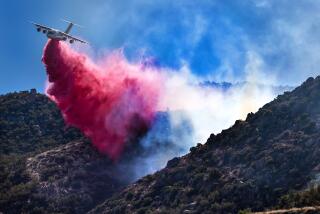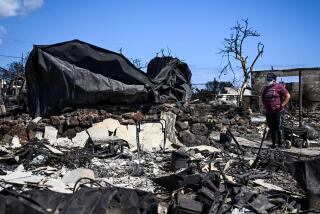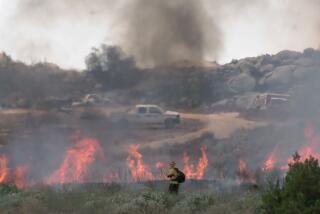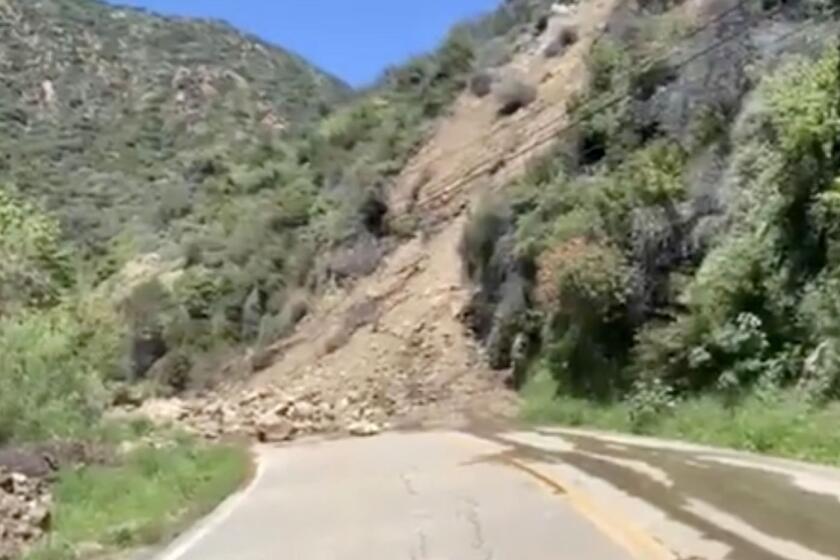At Zuma Beach, the Pacific Ocean was obscured by smoke. Horses, dogs and Southern Californians displaced by raging wildfires Friday sought refuge on the sand. The dress code called for protective face masks, not wetsuits.
In Thousand Oaks, many of those still reeling from Wednesday’s mass shooting at Borderline Bar and Grill fled their homes with whatever they could grab on their way to safety.
Crowded shelters turned away panicky evacuees for lack of space. Freeways were closed. Pepperdine University students awoke to texts ordering them to shelter in place.
People like Shirley Hertel turned on television sets in horror and watched the homes they’d fled catch fire.
“It was so surreal,” the Thousand Oaks resident said, shaken. “I left thinking everything would be OK. You don’t think your house will burn down.”
Fire officials said that more than 150 homes had been destroyed in Southern California, casualties of the Hill and Woolsey fires, blazes that barreled into Malibu and torched a destructive path through Oak Park, Thousand Oaks, Bell Canyon and other Ventura County communities.
By Friday night, wildfire was racing toward West Hills, a neighborhood at the western edge of the San Fernando Valley. At rush hour, an unknown number of homes were ablaze.
Around a quarter of a million people were under evacuation orders Friday — the entire city of Malibu; Calabasas, Agoura and Hidden Hills; the Topanga Canyon area and three-quarters of Thousand Oaks. More than 40,000 acres had burned. Two thousand firefighters were deployed along with more than 600 law enforcement personnel.
1/76
Los Angeles County coroner’s workers recover a body at a burned home in the 32000 block of Lobo Canyon Road in Agoura Hills on Wednesday.
(Al Seib / Los Angeles Times) 2/76
Residents and volunteers bring in supplies for people in the Paradise Cove area of Malibu. Surfboards, kayaks, small motor boats and stand-up paddleboards were used to get supplies from the boat to shore.
(Katie Falkenberg / Los Angeles Times) 3/76
A man ferries cases of water by surfboard to help residents in the Paradise Cove area of Malibu.
(Katie Falkenberg / Los Angeles Times) 4/76
Residents and volunteers who traveled by yacht from Redondo Beach come ashore with water and other supplies to help people in the Paradise Cove area of Malibu.
(Katie Falkenberg / Los Angeles Times) 5/76
David Carr cries as he hugs his partner Rachel Bailey as they stand at their home in the Oak Forest Mobile Estates in Westlake Village destroyed in the Woolsey Fire. “I loved this house,” David Carr said.
(Al Seib / Los Angeles Times) 6/76
“We lost everything,” said Rachel Bailey. Bailey and her partner, David Carr, were vacationing in Mexico. They flew back Monday and saw what was left of their street in Oak Forest Mobile Estates in Westlake Village.
(Al Seib / Los Angeles Times) 7/76
LA County firefighter Battalion 13 Captain Victor Correa helps put out hotspot in a neighborhood on Harvester road in Malibu.
(Marcus Yam / Los Angeles Times) 8/76
Bell Canyon residents wait for their name to be called after adding it to a list, to be escorted by police to their homes. If their homes were intact, they were given 10 minutes to retrieve important items, or the same time to view damage from the Woosley Fire.
(Mel Melcon / Los Angeles Times) 9/76
9-year-old Landon Quirk came with his father Trevor Quirk to help search through the rubble of a friend’s home in the Seminole Springs mobile home on Mulholland Drive in Agoura Hills.
(Al Seib / Los Angeles Times) 10/76
Landon Quirk holds an object while searching through the rubble of a friend’s home in the Seminole Springs mobile home park.
(Al Seib / Los Angeles Times) 11/76
L.A. County Sheriff’s cruise the Seminole Springs mobile home park on Mulholland Drive in Agoura Hills.
(Al Seib / Los Angeles Times) 12/76
Seminole Springs Mobile Home resident Barbara Sottile walks past homes of friends destroyed in the fire.
(Al Seib / Los Angeles Times) 13/76
AGOURA HILLS, CA - NOVEMBER 12, 2018. Seminole Springs Mobile Home resident Barbara Sottile takes a photo of a rainbow created by spraying water on homes destroyed in the development on Mulholland Drive in Agoura Hills.
(Al Seib / Los Angeles Times) 14/76
Firefighter Adam Rodriguez from Eloy, Ariz., sprays foam on a hot spot in a home on Mulholland Drive in the Malibu Hills that was destroyed by the Woolsey fire.
(Al Seib / Los Angeles Times) 15/76
Firefighters from the L.A. County Fire Department put out a flare-up along Pacific Coast Highway across the street from the Malibu Beach RV Park on Monday morning.
(Katie Falkenberg / Los Angeles Times) 16/76
Keith Clark, left, and Shane Clark sift through the rubble of Shane Clark’s Bell Canyon home, which was consumed by the Woolsey fire.
(Kent Nishimura / Los Angeles Times) 17/76
A firefighter works to put out hot spots in and around structures destroyed by the Woolsey fire in Bell Canyon on Sunday.
(Kent Nishimura / Los Angeles Times) 18/76
Paullette Koenig hugs neighbor Gai Farbenbloom after both lost their homes at the Seminole Springs mobile home park in Malibou Lake.
(Wally Skalij / Los Angeles Times) 19/76
A Southern California Edison employee hoses down a hot spot off Kanan Road on Nov. 10. The crew was checking for hot spots around power lines.
(Stuart W. Palley / For The Times) 20/76
A Los Angeles County Firefighter fights a structure fire at Camp 13, an inmate fire crew camp run by the Los Angeles County Fire Department off Decker Road above Malibu.
(Stuart W. Palley / For The Times) 21/76
A Los Angeles County firefighter runs while working to fight a structure fire at Camp 13 in Malibu.
(Stuart W. Palley / For The Times) 22/76
Anne Marie Mueller is notified by L.A. County Sheriff’s Officer Ernie Ferreras that her friends in Malibu are safe.
(Wally Skalij / Los Angeles Times) 23/76
A man stands in the middle of the street at the Seminole Springs mobile home park in Malibou Lake.
(Wally Skalij / Los Angeles Times) 24/76
Matt Sexton goes through the rubble from his house in Seminole Springs.
(Wally Skalij / Los Angeles Times) 25/76
Michael Quane of El Segundo came to the El Porto area of Manhattan Beach to surf against the backdrop of billowing smoke from the Woolsey fire over Santa Monica.
(Jay L. Clendenin / Los Angeles Times) 26/76
Mark Cassar, at the entrance of his brother’s Westlake Village home his father built in 1990. The home was destroyed in the Woolsey fire.
(Francine Orr / Los Angeles Times) 27/76
Garet Anzalone, 23, is tearful as he goes through his grandmother’s burned-out property in a mobile home park in Westlake Village.
(Francine Orr / Los Angeles Times) 28/76
David Spence, left, with friend Eric Winger, takes photos of his 1976 TR6 after the fire in a mobile home park in Westlake Village.
(Francine Orr / Los Angeles Times) 29/76
Lori Jackson, 52, looks for items that survived the fire in a mobile home park in Westlake Village.
(Francine Orr / Los Angeles Times) 30/76
An American flag is melted on a burned-out car on property in a mobile home park in Westlake Village.
(Francine Orr / Los Angeles Times) 31/76
Garet Anzalone surveys his grandmother’s burned-out property in a mobile home park in Westlake Village.
(Francine Orr / Los Angeles Times) 32/76
A home on Bell Canyon Boulevard in Bell Canyon was destroyed by the Woolsey fire.
(Mel Melcon / Los Angeles Times) 33/76
Los Angeles County firefighters extinguish a burning building at a residence off Kanan Road in Malibu on Saturday. The main house was undamaged.
(Stuart W. Palley / For The Times) 34/76
A scorched sign at the visitor center at Leo Carrillo State Beach, which was destroyed by the Woolsey fire.
(Stuart W. Palley / For The Times) 35/76
Cars parked in front of the ruins of a house destroyed by the Woolsey fire off Kanan Road in Malibu on Saturday.
(Stuart W. Palley / For The Times ) 36/76
Los Angeles firefighters Ryan Miller, left, Justin Randolph and Kobe Sallstrom grab some brief rest at the corner of Flintlock Lane and Silver Spur Lane in Bell Canyon on Saturday.
(Francine Orr / Los Angeles Times) 37/76
Los Angeles firefighter Brittney Bebek sprays hot spots on Hitching Post Lane in Bell Canyon on Saturday.
(Francine Orr / Los Angeles Times) 38/76
A firefighter requests more water pressure as a house burns from the Woolsey Fire along P.C.H. in Malibu.
(Wally Skalij / Los Angeles Times) 39/76
Firefighters walk near homes that are threatened by the Woolsey fire in Malibu. This homes in the area are known as Native.
(Genaro Molina / Los Angeles Times) 40/76
The Woolsey fire bears down on Pepperdine University.
(Calvin B. Alagot / Los Angeles Times) 41/76
A firefighter walks towards his engine after trying to prevent the Woolsey fire from overtaking structures in Malibu.
(Genaro Molina / Los Angeles Times) 42/76
Bell Canyon residents Kathleen and Eric Lee, left, watch the Woolsey fire at the mouth of Bell Canyon after evacuating.
(Michael Owen Baker / For The Times) 43/76
Bell Canyon residents Ann and Roger Bloxberg watch the Woolsey fire at the mouth of Bell Canyon after evacuating.
(Michael Owen Baker / For The Times) 44/76
A resident packs up his car as the Woolsey fire bears down on Dume Drive in Malibu.
(Genaro Molina / Los Angeles Times) 45/76
Employees of a nearby confectionery use rakes and shovels to battle the Woolsey fire along Agoura Road in Westlake Village.
(Luis Sinco / Los Angeles Times) 46/76
The Woolsey fire burns near homes in West Hills.
(Luis Sinco / Los Angeles Times) 47/76
Firefighters fight to save the home of Will Buckley on Dume Drive.
(Patrick T. Fallon / For The Times) 48/76
Llamas are tied to a lifeguard stand on the beach in Malibu as the Woolsey fire approaches.
(Wally Skalij / Los Angeles Times) 49/76
A multi million dollar home on Dawn Meadow Court in the High Country neighborhood of North Ranch in Westlake Village continues to burn destroyed by fire Friday morning.
(Al Seib / Los Angeles Times) 50/76
Oak Park resident Tom Duffy hoses hot spots on a burnt house on Wembly Avenue.
(Michael Owen Baker / For The Times) 51/76
David Spence returns to find his home and belongings burnt in the Oak Forest Estates mobile home park in Westlake Village.
(Michael Owen Baker / Los Angeles Times) 52/76
Firefighters try to save a burning home on Dapplegray Road in Bell Canyon.
(Michael Owen Baker / For the Times) 53/76
Maria Narvaez evacuates her home on Almon Dr near Hillcrest in Thousand Oaks as Santa Ana winds continue to blow Friday morning.
(Al Seib / Los Angeles Times) 54/76
Mayor and firefighter Rick Mullen surveys a house on fire in Malibu as the Woolsey fire continues its path to the coast.
(Wally Skalij / Los Angeles Times) 55/76
Firefighters battle a house fire on Churchwood Drive as the Woolsey Fire burns in the Oak Park neighborhood early Friday morning.
(Wally Skalij / Los Angeles Times) 56/76
Resident Brett Hammond evacuates in Malibu as the Woolsey Fire approaches.
(Wally Skalij / Los Angeles Times) 57/76
An owl sits onthe beach in Malibu as the Woolsey fire approaches.
(Wally Skalij / Los Angeles Times) 58/76
Horses are tied to a pole on the beach in Malibu as the Woolsey fire approaches.
(Wally Skalij / Los Angeles Times) 59/76
Pacific Coast Highway backs up out of Malibu as the Woolsey fire forced evacuations Friday.
(Stuart W. Palley / For The Times) 60/76
Horses are turned loose at the top of Las Trancas Canyon in Malibu on Friday as the Woolsey fire approaches.
(Stuart W. Palley / For The Times) 61/76
Onlookers watch smoke from the Woolsey fire and take photos on Pacific Coast Highway looking southeast toward Malibu on Friday.
(Stuart W. Palley / For The Times) 62/76
The Woolsey fire approaches the top of Las Trancas Canyon Road on Friday morning.
(Stuart W. Palley / For The Times) 63/76
Smoke from the Woolsey fire darkens the sky over the Pacific Ocean near Malibu on Friday.
(Stuart W. Palley / For The Times) 64/76
Pacific Coast Highway backs up out of Malibu as the Woolsey fire forced evacuations Friday.
(Stuart W. Palley / For The Times) 65/76
Jennifer Carter protects her face from smoke outside her home on Almon Drive in Thousand Oaks where several homes have been destroyed by the wind driven Woolsey fire.
(Al Seib / Los Angeles Times) 66/76
Residents with a home on Las Trancas Canyon Road watch as the Woolsey fire approaches their home Friday.
(Stuart W. Palley / For The Times) 67/76
A firefighter extinguishes brush threatening a home on Quinta Visa Dr and E Hillcrest Rd in Thousand Oaks early Friday morning.
(Stuart W. Palley / For The Times) 68/76
Maria Narvaez evacuates her home on Almon Dr. near Hillcrest in Thousand Oaks as Santa Ana winds continue to blow Friday morning.
(Al Seib / Los Angeles Times) 69/76
Jesse Castro with Glendale Fire Dept shoots water into a home on Almon destroyed by the Woolsey fire.
(Al Seib / Los Angeles Times) 70/76
A firefighter battles a car fire on Churchwood Drive as the Woolsey fire rips Oak Park early Friday.
(Wally Skalij / Los Angeles Times) 71/76
Crews battle flames consuming a house on Churchwood Drive as the Woolsey fire tears through Oak Park early Friday.
(Wally Skalij / Los Angeles Times) 72/76
Crews battle flames consuming a home on Churchwood Drive as the Woolsey fire rips through the Oak Park neighborhood early Friday.
(Wally Skalij / Los Angeles Times) 73/76
A giant plume of smoke from the Woolsey Fire rises above homes in Calabasas.
(Mel Melcon / Los Angeles Times) 74/76
A resident evacuates his home in Thousand Oaks early Friday morning with only the clothes on his back. Residents were awoken in the middle of the night by mandatory evacuations from the Woolsey fire.
(Stuart W. Palley / For The Times) 75/76
Firefighters try to keep embers from spreading to houses off Wembly Avenue and Lindero Canyon Road Thursday night as the Woolsey fire rages.
(Stuart W. Palley / For The Times) 76/76
Carolina Heuel, a resident of the Miramonte Palmeras Tierras condominium complex in Camarillo Springs, prepares to evacuate after loading her two cats and a cockatiel into her car.
(Mel Melcon / Los Angeles Times) Live updates: Woolsey, Camp and Hill fires scorch thousands of acres »
Fire jumped the 101 Freeway in three places, said Los Angeles County Fire Chief Daryl Osby during an afternoon news conference, as he urged people to obey evacuation orders.
At times throughout the day, the dangerous job of firefighting was complicated further by residents who refused to leave their homes, he said. “I can only imagine the impact of being asked to leave your home. But we’re doing it for your safety.”
Arita Kronska slept through alerts that her Westlake Village neighborhood had been placed under a mandatory evacuation order. The 62-year-old only found out when her daughter called, worried, about 5 a.m.
“I’ve lived here since 1988,” she said as she stood in front of a temporary shelter in Thousand Oaks, her dog, Yoda, at her side. “This is the first time I’ve seen a fire like this.”
As she pondered what to bring to the shelter Friday morning, she eventually decided on just two things she could not live without: her passport and Yoda.
Driving through her neighborhood in the predawn darkness, the streets were eerily quiet.
“Nobody was there anymore,” she said. “It was a very strange feeling…. No people. No driving…. Like in those movies about the apocalypse.”
Kronska had sought refuge at the Thousand Oaks Teen Center, where just 30 hours or so earlier family members had gathered to find out whether their loved ones had been murdered by a black-clad gunman.
So many tears shed in such a short time span in the low-slung tan building.
Judy Goodman fled to the center in the Friday morning darkness, too. At 1 a.m., she heard a loud crash in the living room of her Westlake Hills home. The winds were so fierce that a tree had crashed through her roof, sending shards of glass flying.
Then came the loud pounding at her front door. It was the police, telling her to leave. The fire was coming close. She grabbed socks, family photos and her dog and headed to the teen center.
“It’s just one thing after another,” she said. “I was crying all day yesterday because of the shooting at the Borderline Bar and Grill, and now this happens.”
She was grateful for a safe place to rest but was distraught when she heard that her refuge was the same place that families of the Borderline victims found out their loved ones were dead.
“I can’t believe it,” she said.
Surreal scenes unfold as a fire ‘like Armageddon’ barrels toward West Hills
Debbie Sneed-Barnett and Mike Barnett live one freeway exit away from Borderline Bar and Grill. At least, they thought they still did when the sun rose Friday.
The couple and their three boys — ages 4, 5 and 11 — had spent the night in their minivan in the parking lot of the Woolsey fire evacuation center at Pierce College. Their two dogs and their cat crammed in along with them.
They’d left their home in Thousand Oaks at 3:30 a.m. and grabbed breakfast at Denny’s. It was the family’s first evacuation, and everyone was fighting a cold. Before they fled, Sneed-Barnett had grabbed her son’s breathing machine and her parents’ wedding photos.
The 37-year-old still hadn’t processed the fact that she may lose her home.
“I kind of haven’t thought of what comes next,” she said, resting her hand protectively on 5-year-old Kaden’s shoulder. “If I do that, I’ll cry, and I have to stay strong for them.”
Fire officials had set up a command post not far from the teen center. Around noon Friday, Ventura County Fire Capt. Bob Schuett returned to the command post, famished and covered in soot.
He’s spent the previous 12 hours battling the Woolsey fire in a residential area just north of the 101. His team had been responsible for protecting more than 60 homes on Hillcrest and Almon drives in Thousand Oaks, where power lines had crashed to the ground and ruptured gas lines flared.
They’d lost seven homes. The rest were safe — for the time being. So many homes were on fire at once that Schuett’s department couldn’t give any one its full attention. Firefighters would partially suppress the flames at one home, just enough to keep them from spreading, and then move on.
“With all that wind and heat, it was like a blast furnace,” he said as he stood in line for tacos. “We may have some flare-ups at those homes later. We’ll be out here for a while, picking up what we might have left a few hours ago.”
But as the day progressed, the Woolsey fire worsened. It had started out at about 14,000 acres in the morning. By late afternoon it had more than doubled.
Along Pacific Coast Highway, at least half a dozen homes were burning in the Point Dume area. Flames licked at both sides of the famous thoroughfare. A man on the south side of the road valiantly doused hot spots. Fire lit the hillside, sending violent pops crackling through the air.
Many of those sheltering at Zuma Beach live on Point Dume. On Friday, one resident renamed the enclave; on this day, it was “Point Doom.”
Charlie Dresser lives in Malibu’s Point Dume Club with Teresa Andersen. They wanted to protect their home. They didn’t want to leave it. So they watered down the roof, sprayed the plants and held off evacuating as long as they could.
But Dresser saw the flames. He was on the roof. They were shooting “all over.” He shut off the gas at his mobile home and a few nearby. And left.
“It just got to be the right time to get out,” he said. “I don’t think I want to be that close to the fire right now.”
They left Point Dume at 1:30 p.m and sought refuge on Zuma Beach. By 7 p.m, they were still there. They brought tents to spend the night.
The parking lots were filled with dozens of cars. People walked hand in hand down the boardwalk, wearing masks. Earlier, three little boys were playing in the sand — one burying himself and the other two digging holes.
“This fire is like Armageddon,” Dresser said. “It’s out of control.”
But there was a plus side on this terrifying night.
“Even if that whole hillside goes on fire, we’ll still be safe here,” Dresser said. “We’ve got the ocean.”
Times staff writers Benjamin Oreskes, Ruben Vives, Laura Newberry, Howard Blume, Alene Tchekmedyian, Laura J. Nelson, Ben Poston and Jaclyn Cosgrove contributed to this report.
maria.laganga@latimes.com
brittny.mejia@latimes.com
melissa.etehad@latimes.com
sarah.parvini@latimes.com
